






elcome to the autumn edition. In this issue we are putting our focus on something that the Army Cadets excels at: serving others and giving back to our local communities.
For the first time in the event's history, cadets were invited to take part in Trooping the Colour. Find out how they played their part in the ceremony to mark the official birthday of His Majesty King Charles III on page 9.
Musical cadets, meanwhile, had the great honour of participating in a prestigious showcase celebrating British music and pageantry in the Military Musical Spectacular. Read about their superb efforts on page 12.
An exciting three-week International Exchange Camp in July was an opportunity to show warm hospitality to overseas cadets. Discover how they were given a flavour of the UK Army Cadets way of life on page 22.
The fundraising efforts of our young people is always impressive and we feature Walking With The Wounded, a popular charity among cadets and their units, on page 32. Plus, we find out how Army Cadets National Ambassador Jordan Wylie raised £22,000 for the Army Cadets' own charity, ACCT UK, on page 34.
RSM Simon Hunt of CTC Frimley Park explains why Remembrance is one of the most important events in the Army Cadets calendar. Take his test on page 28 to see whether you are ready to serve your community on 11 November. You can also read how cadets from Oxfordshire and Northern Ireland marked the 80th anniversary of D-Day by walking in the footsteps of brave soldiers – including some of their own ancestors – who made the ultimate sacrifice.
The last few months have been full of adventure, fun and training as summer camps took place across the UK. I was delighted to visit the City of London SW Sector's camp and talk to cadets and CFAVs (pictured). See our camp gallery from page 42.

'I was delighted to visit the City of London SW Sector's camp and talk to cadets and CFAVs'
We also find out what summer camp is like from some newbie cadets, experienced senior cadets and a CFAV who has served our Cadets community for 50 years. Read the feature on page 62.
Brigadier Gary McDade Deputy Commander Cadets
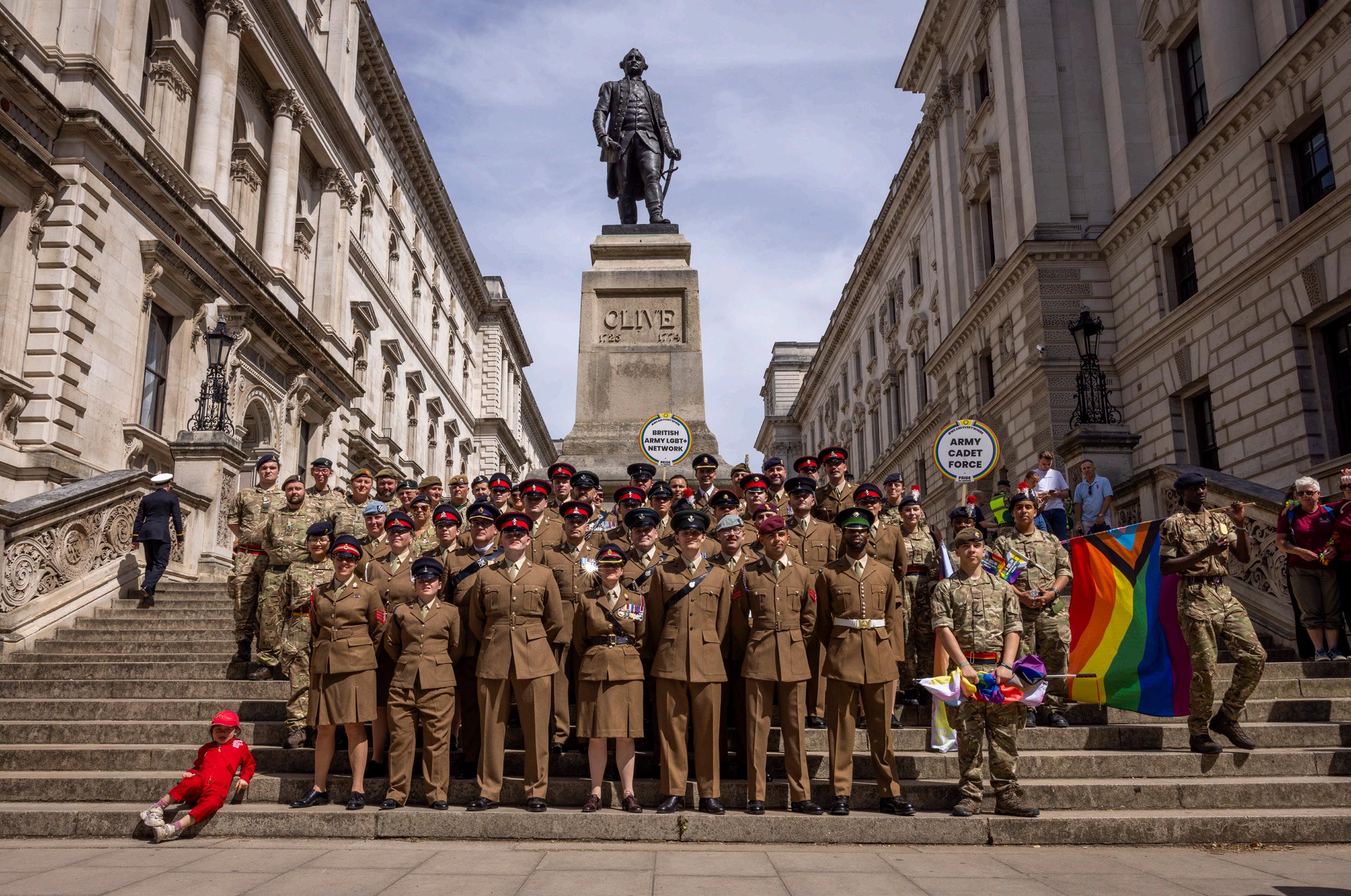

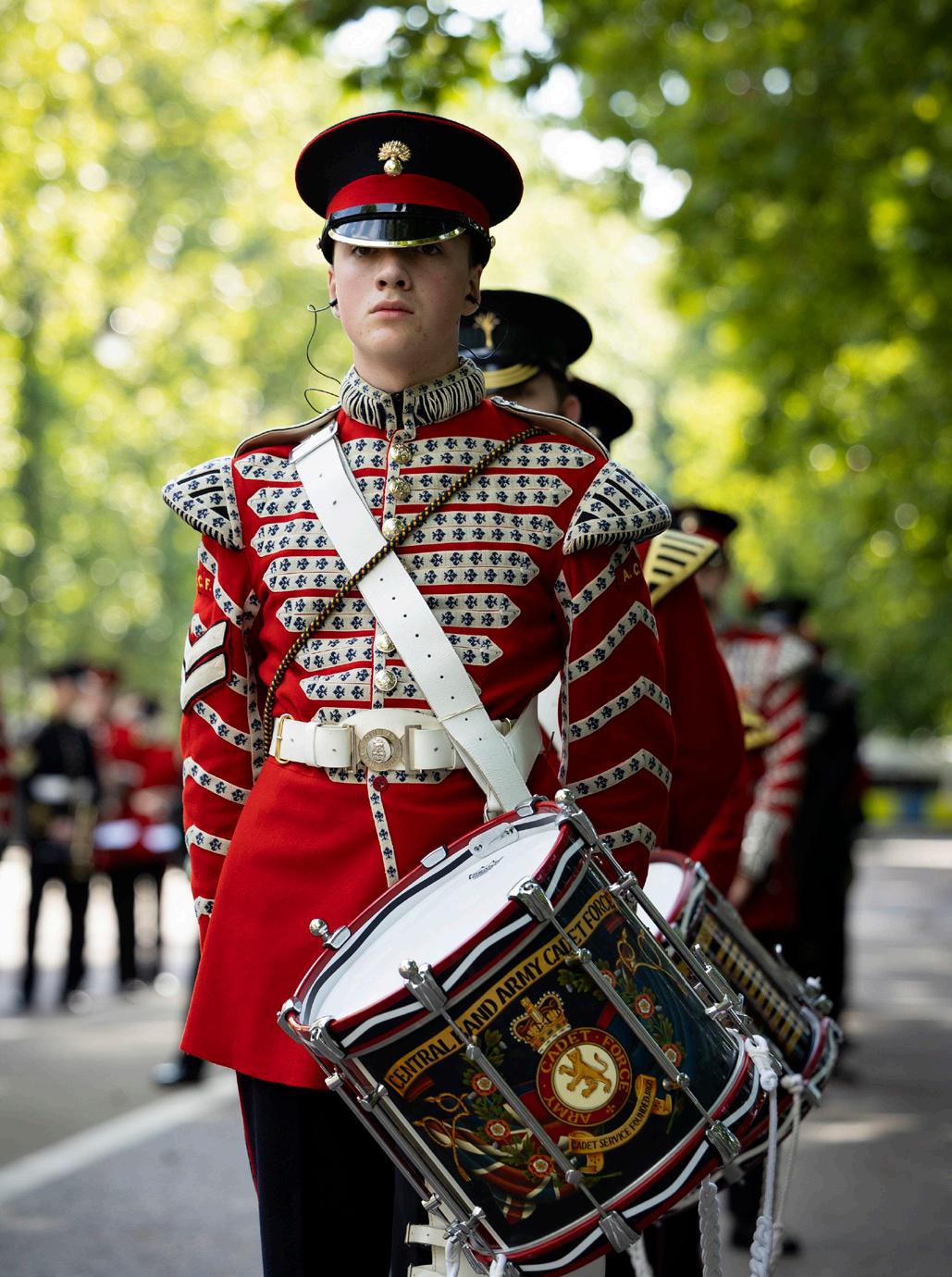
Cadets follow the brave soldiers who landed on the Normandy beaches in 1944.
RSM Simon Hunt of CTC Frimley Park explains Remembrance Day. Then take his test to see whether you're ready to serve your community on 11 November.
32 Walking home for a fantastic cause
Cadets raised money for Walking With The Wounded’s December fundraiser. Find out why the charity is popular with cadets.
Get the low-down on the Army Cadets National Ambassador's eco-triathlon.
Find out who won ACCT UK's Excellence Awards.

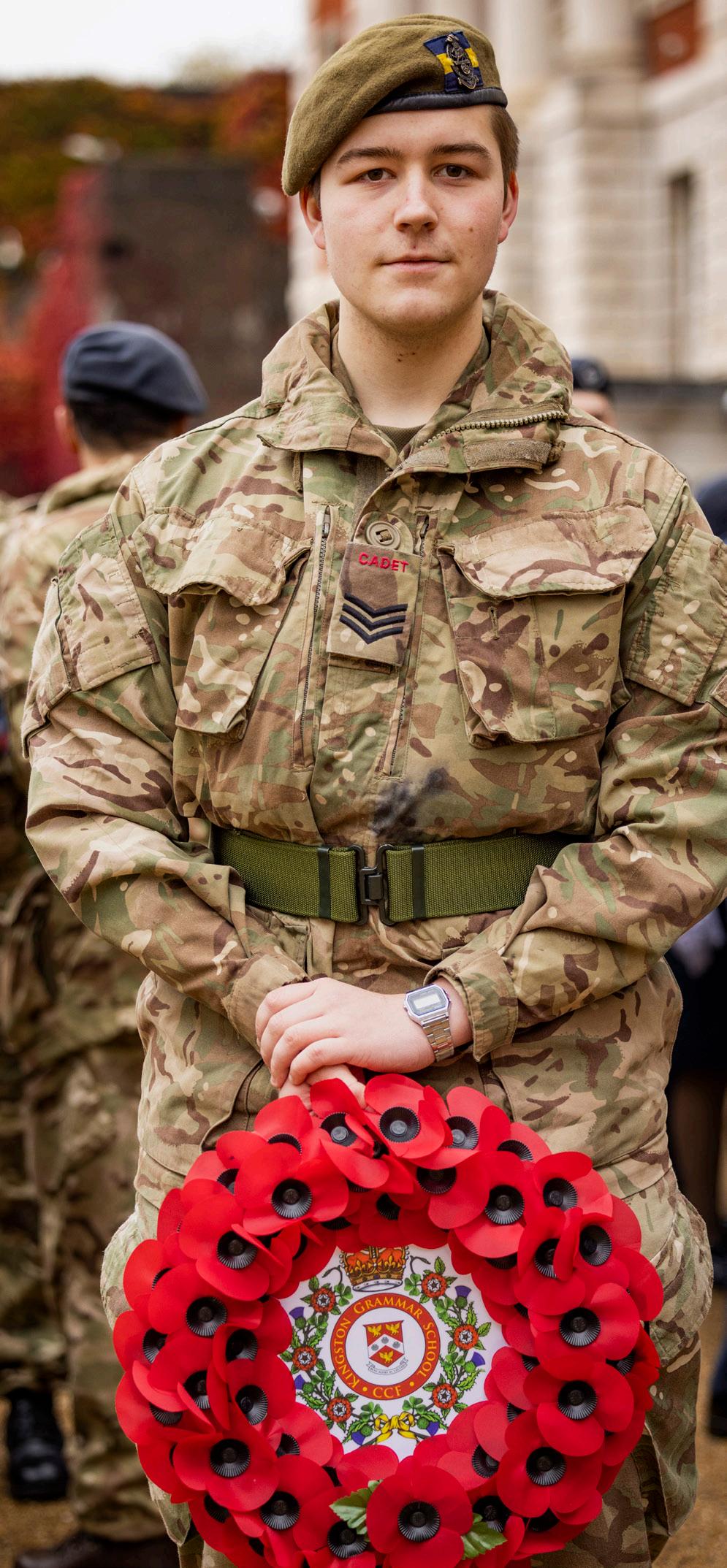
Take a look at some of the activities that went down across the country this summer.
62 What's it really like at summer camp?
We talk to camp newbies, experienced senior cadets and a very long-serving CFAV.

Encounters with grizzly bears and a 12-day action-filled expedition were just some of the highlights of the month-long Ex OAKLEAF 2024 Canadian exchange programme this summer.
Cadets aged 15 to 17 from across the UK competed for 20 coveted spaces at a gruelling selection weekend in Wales, before flying to Calgary in July to hone their skills on the Expedition Team Leader course at the Rocky Mountain Cadet Training Centre in Alberta.
During their stay, they embarked upon an extensive 12-day expedition designed to reinforce their physical and mental resilience, enhance their problem-solving abilities and foster a strong sense of community and service. Activities included cable traversing, hiking, biking, rock climbing and camping.


The cadets, and three escorting CFAVs, encountered the first of many bears while hiking in Banff National Park. Later, they worked with park rangers to pull up buffaloberry plants –which attract bears – in tourist areas, as well as repairing hike and bike trails.
Lead Escort Officer Major Andy Emery of Wiltshire ACF said: 'The cadets have been put through their paces in some of the most remote wilderness available. They encountered wildlife of vast proportions and witnessed weather extremes from scorching sun to hailstorms that white out the land.
'I'm extremely proud of each and every one of them. They've shown grit and determination, learnt so much and been a pleasure to work with.'
In May, 200 cadets showcased determination and grit in a strenuous two-day exercise in the Welsh mountains and swamplands.
The Cadet Cambrian Patrol is designed to test cadets' physical and mental endurance. The first day included a 20km patrol over Sennybridge Training Area as well as encountering scenarios such as first aid and casualty evacuation, a military knowledge assessment, a tactical withdrawal under contact, and section defence.
The second day saw a rolling platoon attack in the face of enemy machine guns (manned by soldiers of the Queen’s Dragoon Guard), including a casualty evacuation which entailed running with a weighted stretcher for over 500m to the final position. The weekend concluded with a parade and awards presentation.
This year, Caterham School CCF was one of many squads making its Cambrian Patrol debut. The eight-person team was one of three CCF patrols to receive coveted Cambrian gold medals for team performance, while the sole individual award went to Caterham's Section Commander Cdt CSM Sam Gill as Best Patrol Commander.
Master Cdt CSgt Mark Wolstenholme, 17, said: 'Cambrian Patrol was very tough but enormously fulfilling. Months of training as a squad came together as we achieved what no other Caterhamians and few other British cadets have.'


Best Welsh Patrol Clwyd and Gwynedd ACF
Best International ACF Patrol Surrey ACF
Best International CCF Patrol Barnard Castle CCF
Best Patrol Commander Cdt CSM
Sam Gill, Caterham CCF
Gold ACF Surrey; Clwyd and Gwynedd; Greater London Sector; Gwent and Powys
Gold CCF Sevenoaks; Barnard Castle; Caterham School
Silver ACF Derbyshire; Wiltshire
Silver CCF Culford School; St Benedict’s School
Bronze ACF Dyfed and Glamorgan; Warwickshire and West Midlands; Cheshire; Somerset Cadet Battalion
Bronze CCF The Glasgow Academy; Llandovery; RGSHW; Shrewsbury School
Certificates – ACF Cambridgeshire
Certificates – CCF Maidstone Grammar School; Gateways School
News from the Army Cadets and beyond

The rainbow flag was flown with pride when cadets from London and the South took part in Pride 2024, joining over 32,000 participants from LGBT+ community groups, businesses and partners.
Organised by the Army Cadets LGBT+ Forum, the contingent included CFAVs and cadets from South West London Sector and ACFs from Wiltshire, Surrey and Essex. Together they formed part of the youth section, marching through London behind the Armed Forces contingents, past Buckingham Palace and The Cenotaph.
Rachel Diss, HQ Cadet Branch D&I Lead, said: 'It’s really important for cadets to feel accepted, and that they can be themselves among their friends.
'To get on with the training, they must be given the opportunity to function at their best, and that comes with being their authentic selves, being honest with who they are and the people around them, without fear of being judged or discriminated against.'
En route they met transgender rights activist Hannah Graf MBE, a former British Army captain who served with the Royal Electrical and Mechanical Engineers. Hannah came out as a transgender woman in 2013 and, as the Army's Transgender Representative, has mentored transgender soldiers and advised senior Army commanders on transgender policy.
Rachel Diss added: 'Pride in London 2024 was more than just a parade; it was a powerful demonstration of unity and a heartfelt celebration of the values that bind us all together.'
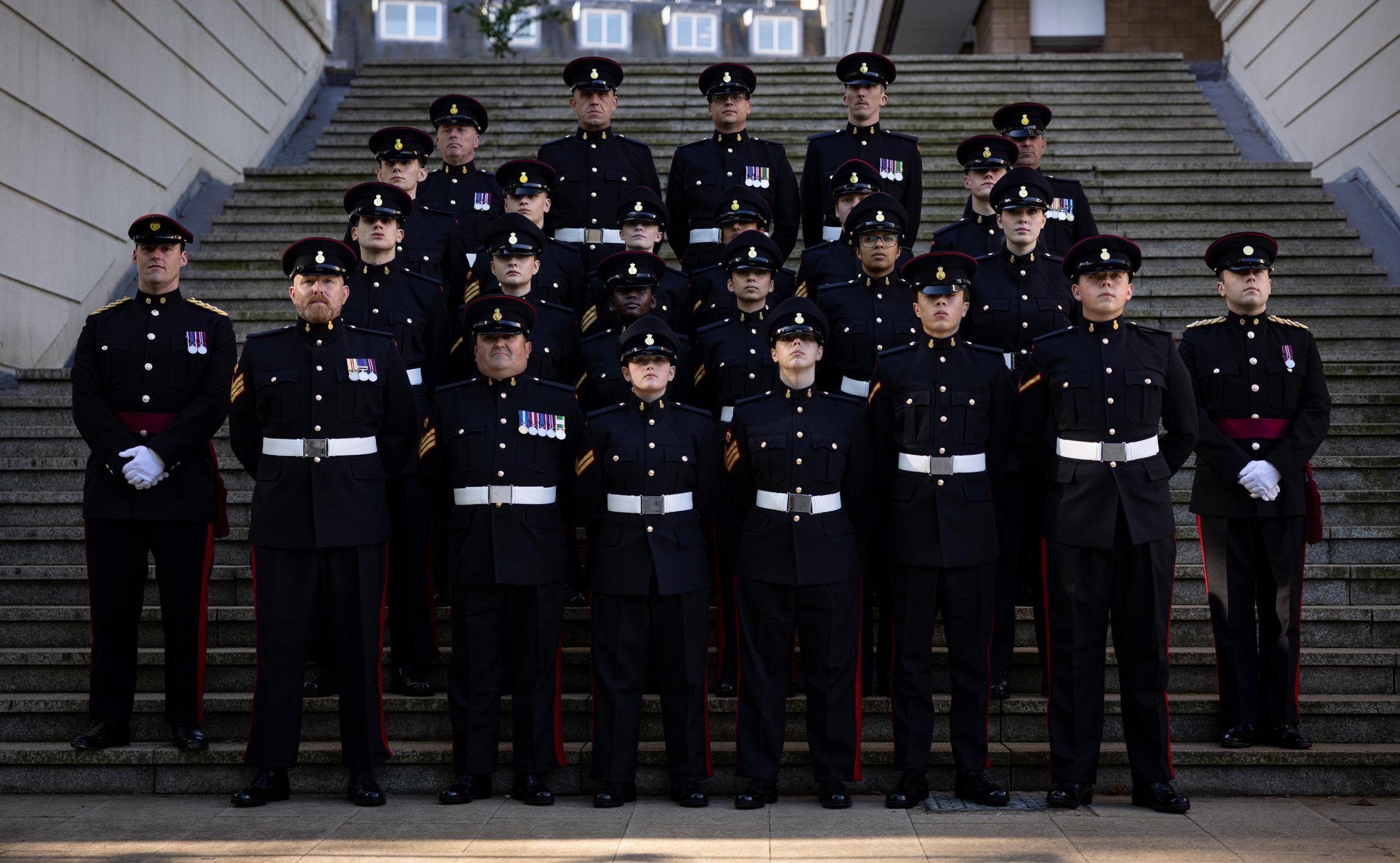
For the first time in the event's history, cadets were invited to take part in Trooping the Colour. The prestigious ceremony took place in London on 15 June to mark the official birthday of His Majesty King Charles III.
Attired in No 1 Dress, cadets were the first point of contact when guests arrived and they assisted spectators and escorted VIPs. Later in the day, alongside other youth organisations, they led 25,000 members of the public down The Mall from Admiralty Arch to Buckingham Palace for the monarch's appearance on the balcony.
In total, 16 cadets and 10 CFAVs took part in the King's Birthday Parade, and Capt James Douet CCF, Contingent Support Officer of the London District Cadet Training Team, was officer-in-command of the Army Cadets contribution.
'To be trusted by the Army to be present at the biggest ceremonial event of the year was quite something, both as an individual and as an organisation,' said Capt Douet. 'We have proved we can deliver to the highest standard with coordination and hard work, and this raises the prestige of the Army Cadets in the eyes of both the public and the Army.'
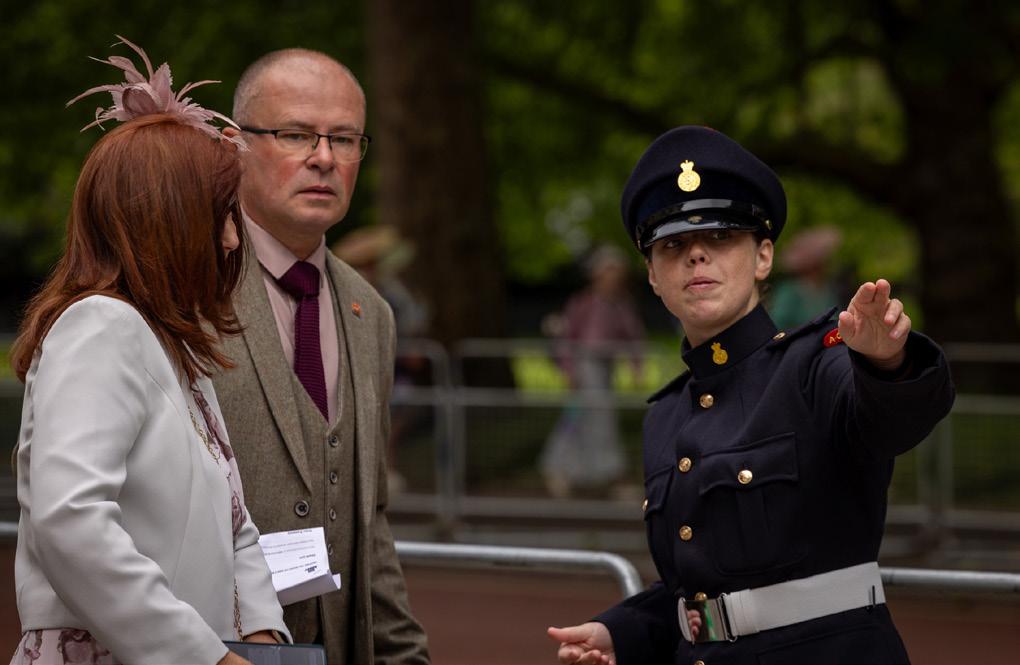
WO1 D Roper MVO, Supt Clerk HQ Household Division, said: 'We were delighted to have the Army Cadets on board for this – the delivery of what is, for them, the first of their Sovereign's birthday parades. Having cadets front and centre with members of the public can't be underestimated.'
Trooping the Colour dates from the reign of King Charles II in the 17th century, and was devised as a military exercise to ensure each soldier could recognise their regiment's flag. It became an annual tradition to mark the Sovereign's official birthday during the reign of King George III from 1760.
News from ACCT UK


Cadets in the Aldershot and Farnborough detachments are sporting new berets to reflect their affiliation with the Royal Logistic Corps (RLC).
Detachments are usually affiliated to regiments of the British Army and based at nearby regular units. Aldershot and Farnborough (part of Arnhem Company, Hampshire and Isle of Wight Army Cadets) were traditionally paired with the Parachute Regiment, which was previously stationed in Aldershot.
The Parachute Regiment has moved, so the decision was made to re-badge these units to align with units currently local to Aldershot, namely the RLC.
Aldershot detachment hosted an affiliation parade on 20 July in which Brigadier Stephen Rayson and County Commandant Colonel Tim Hope MBE presented each cadet with their new beret and formally welcomed them into the broader RLC family (pictured).
Senior officers from RLC Regimental Headquarters attended the event, along with the parents and guardians of the cadets on parade.
In a similar move in Northumbria, Slatyford Detachment is now affiliated with 3rd Regiment Royal Horse Artillery (RHA). Excelsior Detachment has also switched affiliation to the Intelligence Corps.

In a demonstration of respect, Humberside and South Yorkshire (HSY) ACF cadets are working with the Victoria Cross Trust (VCT) to document war graves within the county footprint.
CFAVs and 22 cadets from C Company, along with a contingent from the Royal Air Force Air Cadets, met VCT representatives at Adwick Cemetery, near Doncaster, for the first session of a pilot scheme which has now been adopted across the UK. A second session took place at City Road Cemetery in Sheffield, which has over 200 military graves.
Cadets learnt how to record the headstones and their condition, and plot their location using a geolocation tool. This will improve VCT records and assist the trust in planning restoration and cleaning efforts. The cadets are also delving into the histories of those laid to rest, bringing to life the narratives of courage that defined a generation. VCT members are Eyes On, Hands On volunteers with the Commonwealth War Graves Commission, so the project creates an Army Cadets connection with the commission.
More sessions are planned around the county footprint, which includes East Yorkshire and northern Lincolnshire.
Head of Engagement for HSY ACF Major John Lomas said: 'By engaging in such hands-on historical preservation, cadets are ensuring that the sacrifices of those who fought for their country are not forgotten.'
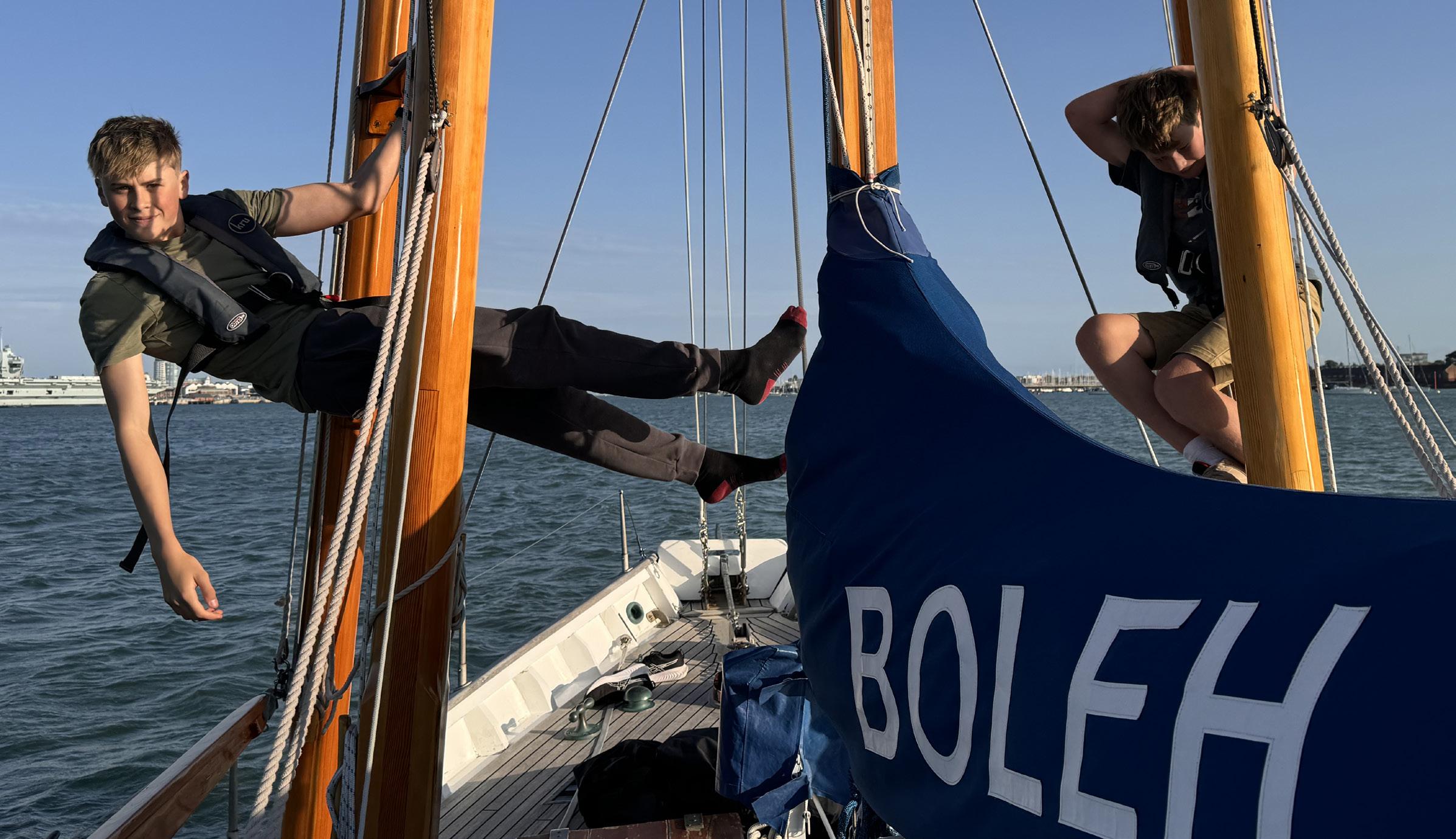


Devon cadets had the exciting opportunity to set sail on the Boleh Trust sailing boat. They took part in a five-day journey from Gosport, traversing the challenging waters of the English Channel. Once docked in Portland they undertook five one-day expeditions, giving them the opportunity to sail around Weymouth Bay. The cadets then helped sail Boleh back to Gosport.
During their time on board they learnt essential maritime skills, including mastering seamanship rules, understanding maritime safety protocols, navigating the seas, and performing safe vessel manoeuvres. These practical skills were complemented by the opportunity to form team bonds, share experiences and build confidence.
Devon ACF received financial support from ACCT UK and the Ulysses Trust for this adventure.
‘We extend our heartfelt gratitude to the Boleh Trust and our funders for facilitating this positive experience,' said Capt Kevin Found, AT Training Officer for Devon ACF. ‘The cadets have benefited immensely from their time on Boleh, and it will leave a lasting impression on them.
‘Devon ACF is committed to providing opportunities for young people to explore the world of sailing and develop valuable life skills. We look forward to many more successful expeditions in the future, continuing to empower and inspire the next generation of sailors.’
It's time to unleash your most funky, fun and fabulous festive designs because ACCT UK is calling on cadets to create a digital Christmas card. Wrap up your best ideas and "sleigh" the competition for the chance to win an exclusive Army Cadet Force Monopoly set.
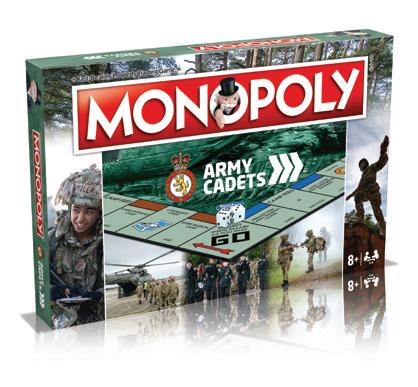
Click here or scan the QR code for details on how to enter.


If you’re a cadet in the north of England, you’re now part of a huge organisation that stretches from Carlisle to Berwick, down to North Lincolnshire and South Yorkshire, westwards to Leeds, Manchester, Liverpool and Cheshire, and across the water to the Isle of Man.
That’s the scope of Headquarters North, which came into being on 1 August following the merger of Headquarters 4 Brigade and North West. It’s now the Regional Point of Command, with three garrisons in Catterick, Preston and York.
Part of its remit is to support Army Cadets and all Regular and Reserve troops, along with commanding military resources in home emergencies such as pandemics, terrorist attacks and flooding. It also provides one third of the Army’s recruits annually, and is home to 28 per cent of the Army Reserve and over a million veterans.
Its Commander is Catterick-based Colonel Peter Stitt. He has been with the Army since 1995, serving in the Balkans, Northern Ireland, Afghanistan and Iraq. 'HQ North’s guiding principle is to make the military community in the North the best it can be,' he said.

Cadets had the honour of taking part in a prestigious showcase celebrating British music and pageantry.

Talented musical cadets had the great honour of being invited to perform at a Military Musical Spectacular, presented by the esteemed Household Division of the British Army. The showcase over three nights in July was a magnificent celebration of military music, pageantry, and precision, and the cadets felt enormously privileged and proud to play their part.
Senior Drum Major Jack Gibson of Cleveland ACF said: ‘Taking part was a once-in-a-lifetime opportunity. Not only did it allow the Household Division to showcase their spectacular musical skills, but it also gave us, as young cadets, the chance to prove that we have what it takes to perform in events like this alongside the Army.’
Set against the historic backdrop of Horse Guards Parade in St James’s Park, London, the event showcased the finest elements of British military tradition and was a breathtaking fusion of sound and colour, featuring the Massed Bands of the Household Division, Massed Pipes and Drums, and the Mounted State Trumpeters.

Prior to the event, cadets from across the UK were selected to join the ranks of seasoned military musicians and performers and given an unparalleled opportunity to showcase their talents on a grand stage.
The Army's Colour Sgt Paul Blakelock from the Coldstream Guards said: ‘The Military Musical Spectacular always proves to be quite significant for Army Cadets Music because it only happens once a year and the selection process takes place from talented cadets across the country. Cadets audition within their Counties and then we try to pick the very best to come and take part.
‘For those cadets to then take centre stage and do a Beating Retreat was an absolutely massive achievement, with performers ranging from 12 to 18 years old, plus adults.’
Want to get more insight into Army Cadet Music? Follow @armycadetmusic on socials
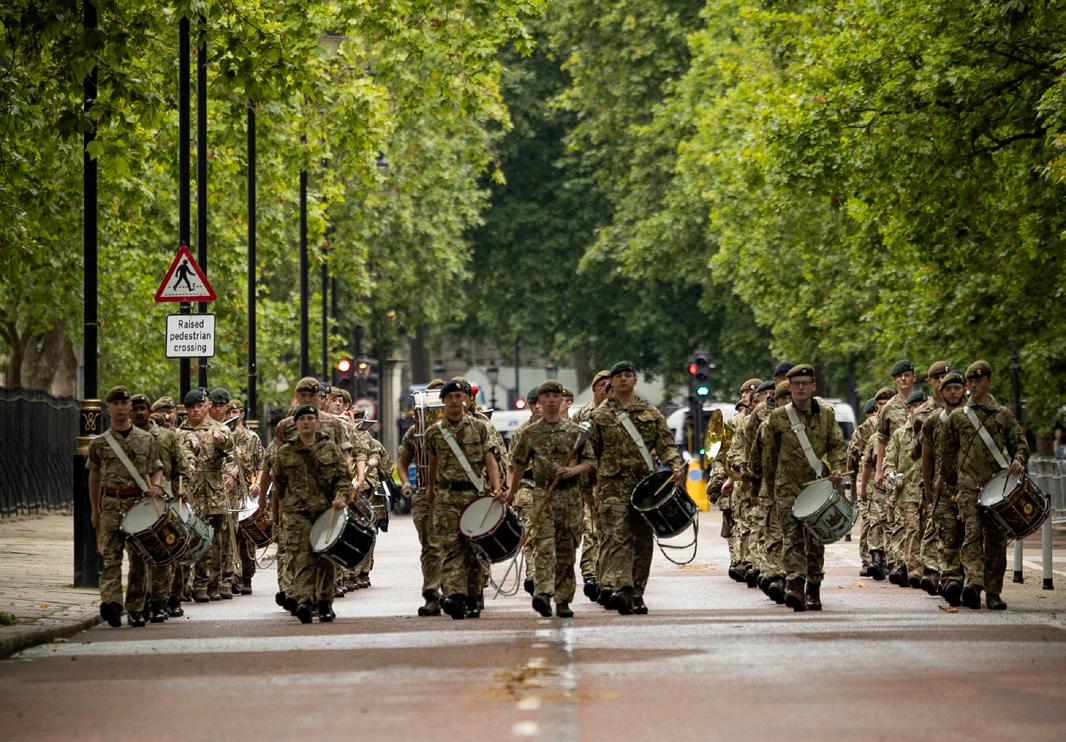

‘The event, titled Orb and Sceptre, was a rousing celebration of the coronation of King Charles III’

The cadets practised extremely hard on the days leading up to the three-night event. National Drum Major Cdt Sgt Katie Howat of Derbyshire ACF said: ‘We all arrived on the Saturday and then (despite many cadets being tired from long journeys) took part in intensive training that evening. We continued to train all through Sunday and Monday.’
Senior Drum Major Jack Gibson from Cleveland ACF added: ‘It was very fast paced and there was a lot of knowledge to take on in a short amount of time. Preparation not only included remembering the routine but making sure all our kit was ironed, polished and clean. It was tiring but worth it.’
The hard work paid off and the event, titled Orb and Sceptre, was a rousing celebration of the coronation of King Charles III and honoured the iconic music of Sir William Walton OM. It also paid tribute to the 80th anniversary of the D-Day landings, reflecting on the sacrifices made and the enduring spirit of Remembrance.
‘I felt proud to take part; it was definitely a highlight of my Army Cadets career,’ added Cdt Sgt Howat. ‘It was amazing being on the podium – although I was scared because the steps were really steep!’
The event provided a display of world-class military horsemanship and precision drill, with each night ending with a stunning fireworks finale.
Cdt Cpl Caleb Middleton from Black Watch ACF, whose instruments are bagpipes and saxophone, said: ‘When you are watching the military bands on the TV, you get to see where music can take you. However, to be able to get that kind of experience without even having to sign up was absolutely amazing.’
James Marshall, HQ Cadet Branch Bands and Corps of Drums Lead, added: ‘The cadets worked immensely hard over the three-night event and I was incredibly proud of them. They smashed it because they are incredible at what they do.’

Cadets reveal the highs and lows of taking part in a scuba-diving trip



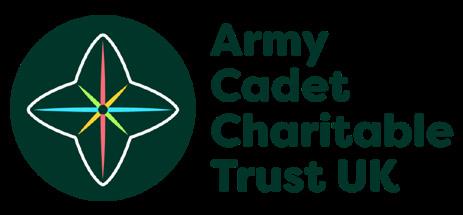

From the trepidation of their first breath underwater and the adrenaline coursing through their bodies as they learned to scuba dive, to the thrill of encountering marine life and visiting another country, 19 cadets from Glasgow & Lanarkshire ACF had an amazing time on their AT trip to Malta in July.
The cadets were based at St Paul’s Bay, in the north of Malta, and learnt how to scuba dive at beautiful locations across the island with diving tutors from Maltaqua.
Sgt Instructor Alex Gray, who organised the trip, said: ‘Diving is unlike anything else cadets and CFAVs will experience. The immense underwater world shows them things they never knew existed.’
SI Gray was thrilled to witness how the cadets made huge progress in skills and confidence throughout the four-day trip.
‘On day one, the cadets were eager but their confidence in their own abilities was lacking. In contrast, on their final day of diving, their ability to independently use their equipment and their confidence underwater was commendable. This was demonstrated in their attitude to and competence in completing two 18-metre dives – including one in a cave.’
At the beginning of the trip, many of the cadets admitted to feeling a little apprehensive. Cdt Joseph Baker, aged 16, of 2 Plt, Royal Scots Borderers, said: ‘I found the pressure change on my ears difficult at first. I was also nervous about being under the water and breathing through a tube – I found it hard to believe it was possible to do so.’
Joseph persevered and began to really enjoy the scuba-diving experience and his time on the island. He said: ‘It was great to discover the history of Malta and find out about all the different people who’ve inhabited the island and had an impact on its history.’
It was the first time Joseph had been abroad without family or familiar faces around him, but he soon made friends.
‘I overcame any nerves by putting myself out there and meeting and bonding with other cadets on the trip and having a laugh with everyone, while also getting updates from my family back home,’ he said.
‘The trip challenged me to make new friends and face my fears of the ocean and it turned me into a more confident person.’ Supported by
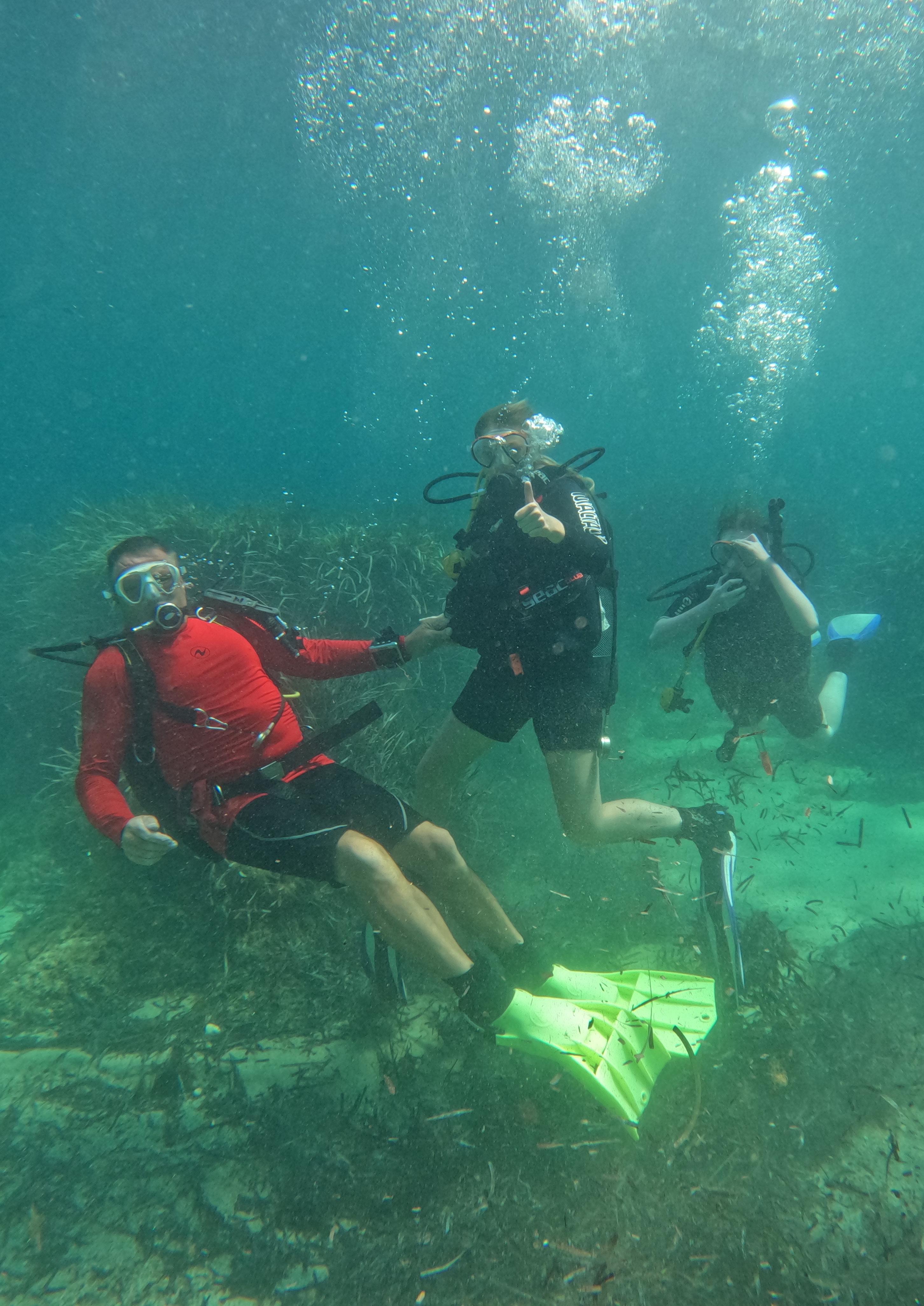
‘It gave me a sense of trust because we had to depend on each other if something went wrong'

Cdt Lance Bombardier Grace Menzies, aged 17, of A Troop, Royal Artillery, also overcame obstacles so she could learn to dive.
‘The most challenging part was taking my mask off underwater. However, I took my time and slowly progressed until I could hold my breath underwater for a longer period of time than at first.’
Cdt Cpl Lewis Hall, aged 16, of Unit 4Plt, Royal Scots Borderers, particularly enjoyed working in pairs to master new skills.
‘It gave me a sense of trust because we had to depend on each other if something went wrong. I felt a little nervous at the beginning but I listened to the instructor and learnt from any mistakes.
‘The most challenging part was the CESA (controlled emergency swimming ascent) as it took a lot of effort to reach the surface in one breath.’
Lewis also loved being in Malta and discovering more about the island’s history – and devouring its delicious ice cream!
‘It was also fascinating to see all the marine life such as cuttlefish and flying gurnard,’ he added.
Although some of the cadets had prior experience in scuba diving, it wasn’t a requirement for attendance on the trip. They did, however, have to complete online training from PADI (Professional Association of Diving Instructors), which taught them about what scuba diving is and the skills they would learn.
During the trip, the cadets also gained a PADI open-water qualification, allowing them to dive down to 18 metres on a led dive, meaning they wouldn’t have to complete further training if they wanted to do this in the future.

‘During the trip, the cadets gained a PADI open-water qualification, allowing them to dive down to 18 metres on a led dive’
‘The cadets learnt key skills in relation to scuba, including buoyancy and equipment use, as well as the principles and practices it takes to be a diver,’ said SI Alex Gray. ‘Their keen attitude allowed them to overcome their fears and partake to the fullest of their abilities.
‘As adult volunteers, it was important for us to support them and maintain a positive attitude towards their training to ensure they stayed motivated. Our passion for them to succeed positively influenced their self-confidence and the final outcome of completing their scuba qualification.’
The trip required cadets to work on communication skills and time management as they had to organise and prepare their kit themselves. It also enabled them to achieve various aspects of the Army Cadets syllabus in both 3-star and 4-star AT training. However, the biggest outcomes of the course were the friendships and memories made.
SI Gray said: ‘Alongside all the practical requirements, one of the biggest highlights of the trip was to see cadets develop their communication skills and form lifelong friendships.’
This incredible AT adventure was supported with funding from ACCT UK and the Ulysses Trust.
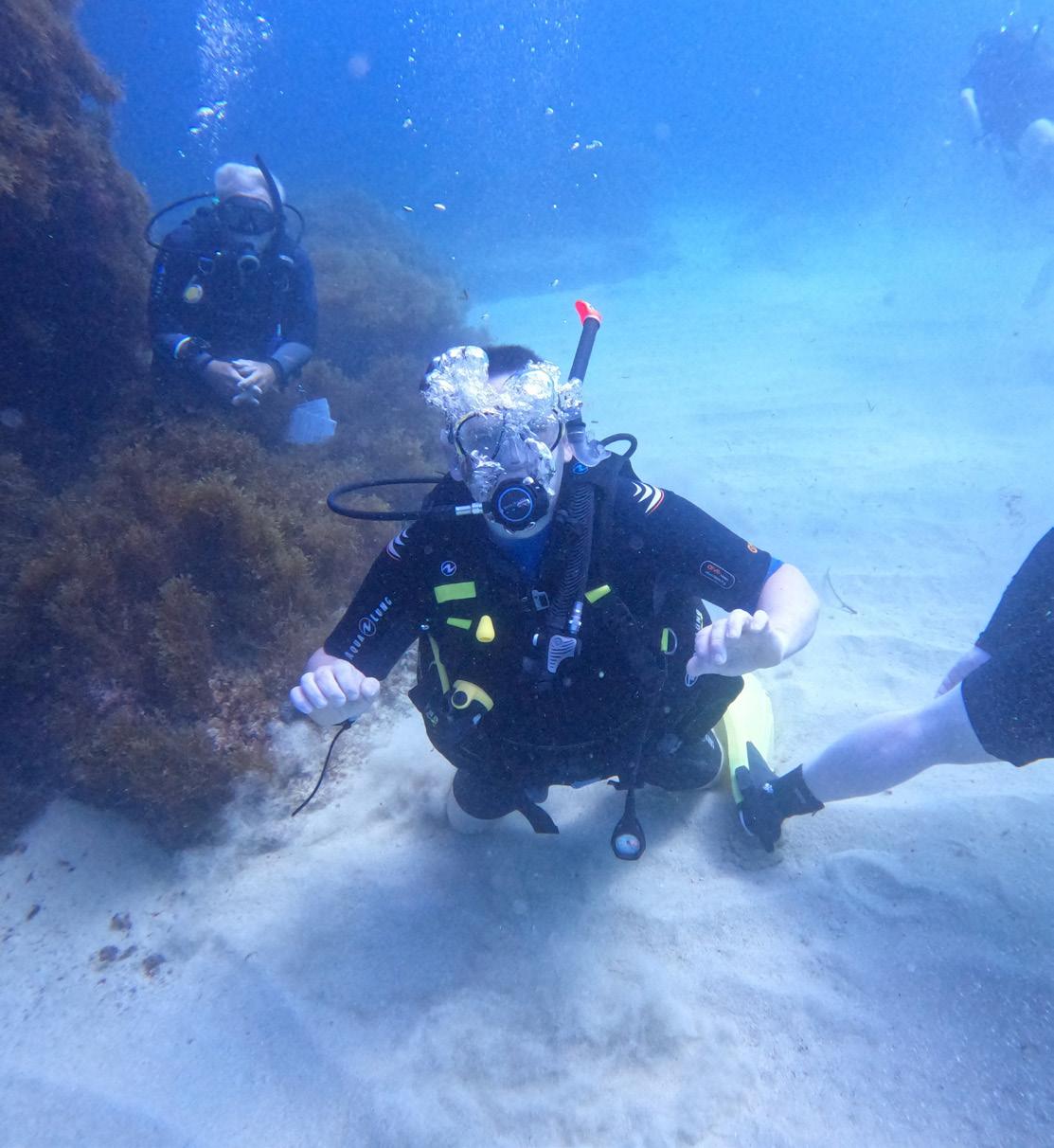







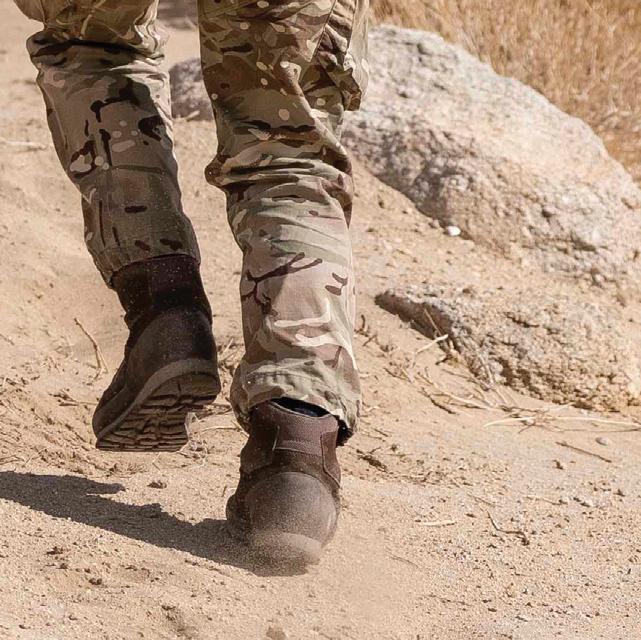





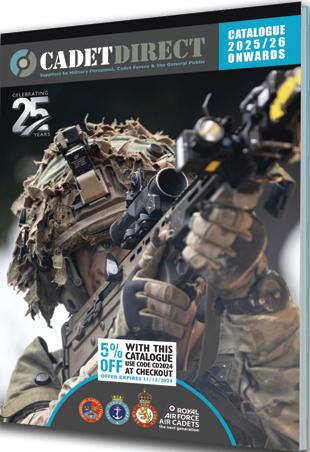
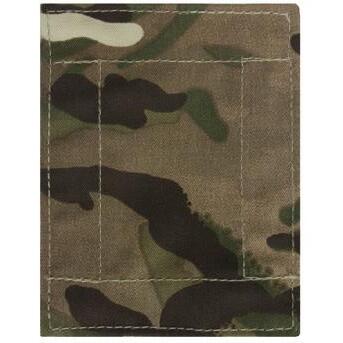





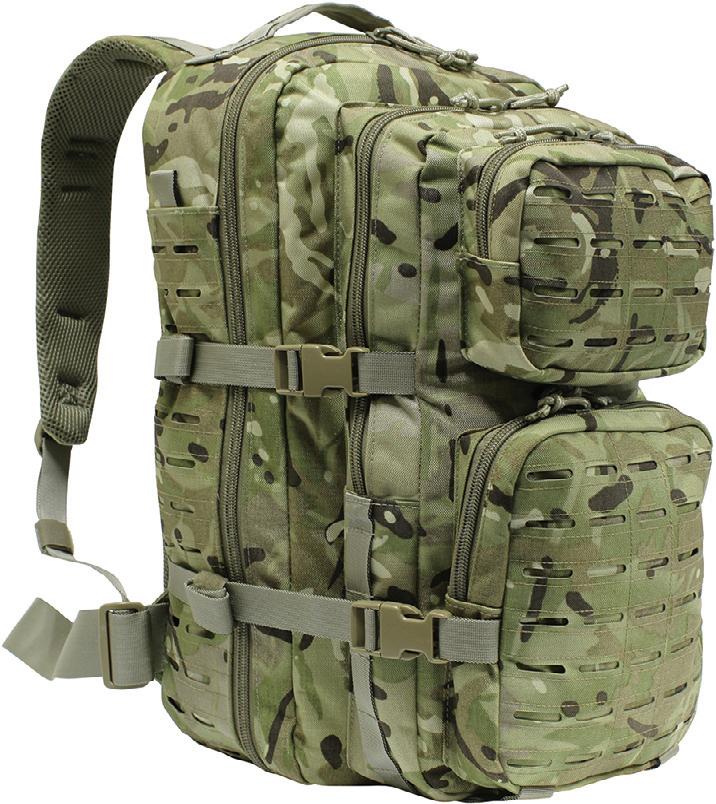


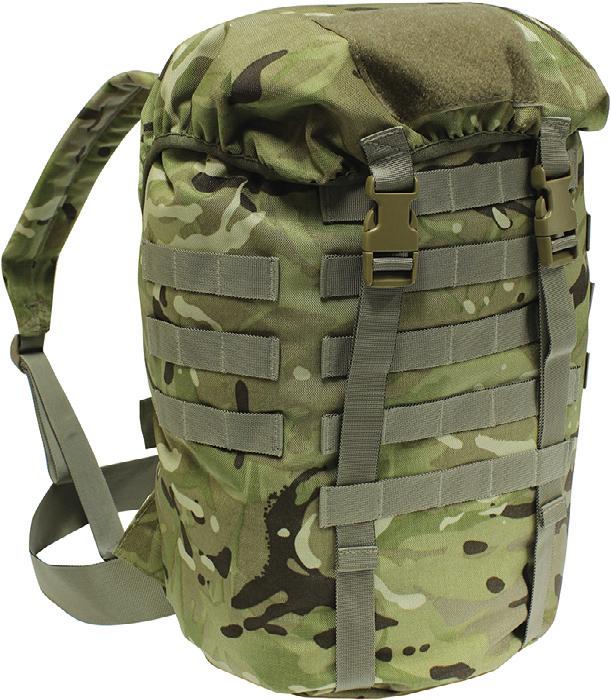

Army Cadets gave a warm welcome to cadets from across the world in an exciting three-week International Exchange Camp in July. Young people from Canada, India, Poland, Latvia, Lithuania and Estonia were welcomed to our shores and given a flavour of the Army Cadets way of life in the UK.
The camp, which included trips to see iconic British landmarks and the opportunity to take part in adrenaline-fuelled outdoor pursuits, was the first single event of its kind to involve multiple countries.
In the first week, the international cadets were given a whistle-stop tour of some of the UK's most famous landmarks including the Tower of London and Windsor Castle. They then spent a few days at the Cadet Training Centre at Frimley Park in Surrey and took part in activities such as archery, laser clay shooting and STEM projects. They also had a visit to the prestigious Royal Military Academy Sandhurst, where British Army officers are trained and, in recent years, Army Cadets officers too.
The week culminated in a major highlight of the exchange: the rare honour of dinner at the House of Lords. Gifts were exchanged in a ceremony led by Colonel Catherine Jardine in a goodwill gesture symbolising a spirit of camaraderie and mutual respect.
Addressing the gathering, Brigadier Anthony Lamb, Head of Cadets, emphasised the importance of such events in fostering global friendships and understanding 'This is the first time we've brought together so many representatives, and I hope it won't be the last,' he said.
'Our cadet programmes all share the goal of developing young people into better citizens. I commend all the cadets for their achievements and the rigorous selection process they underwent to be here today.'
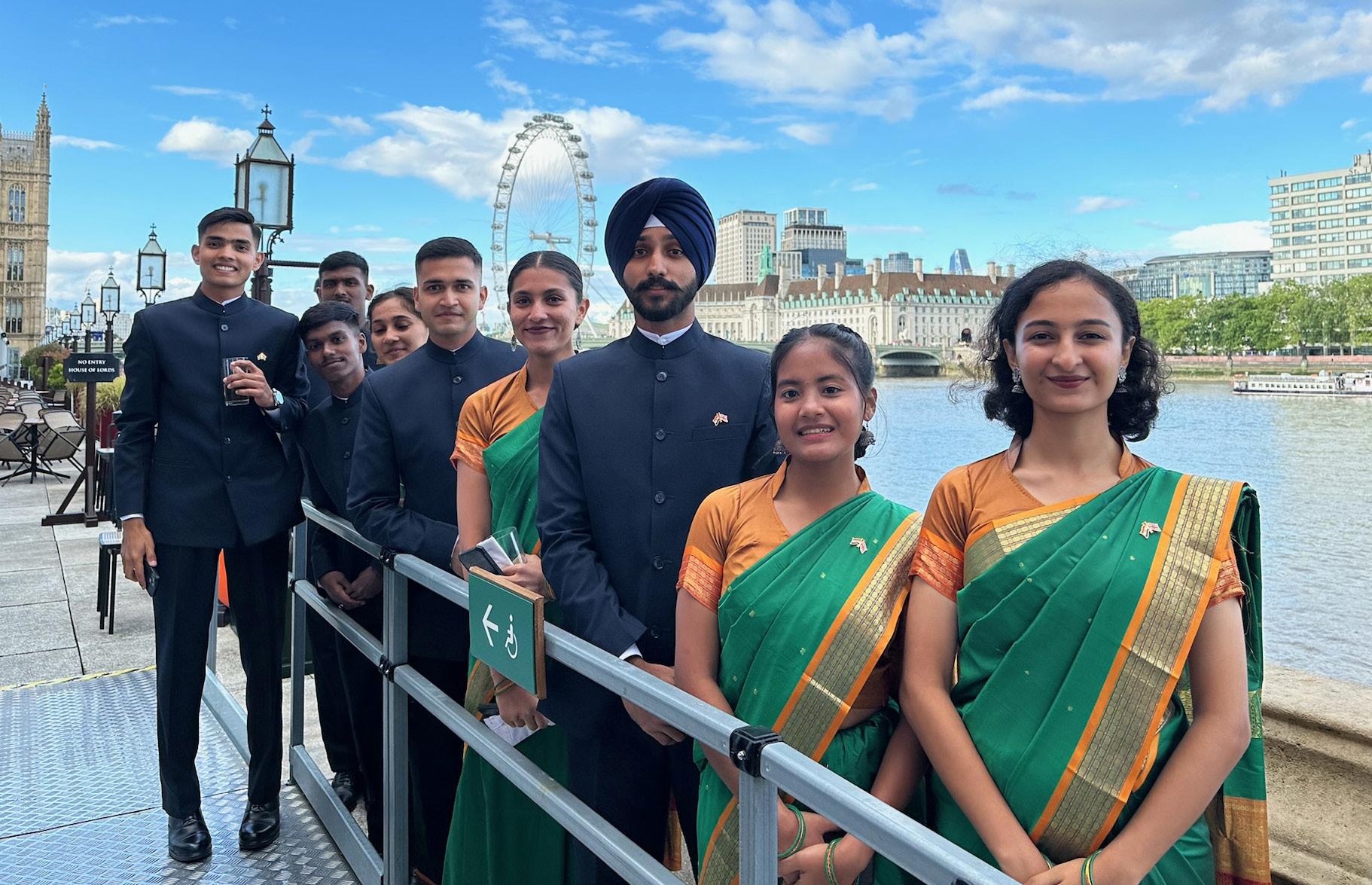
The cadets then travelled to Barry Buddon Camp in Scotland for a week of military-themed activities designed to instil discipline, teamwork and resilience, including paintball, navigation, map-reading, drill, fieldcraft and marksmanship. There was also an opportunity to visit Glamis Castle.
The third week saw the group split for adventurous training at cadet centres in either Capel Curig, Wales, or Halton Training Camp close to the Lake District. Both locations offered thrilling pursuits: in Capel Curig, cadets could conquer the heights of Wales' tallest mountains and navigate its serene waters by paddleboard or canoe. Those in the Lake District faced the challenge of climbing Scafell Pike, England’s highest peak, and exploring the depths of caves and mines.
Estonian cadets Stella Lümat and Kärt Pürn wrote after the event: 'We really enjoyed sightseeing in London and the formal dinner at the House of Lords. We also enjoyed the beautiful views in Wales.'
As the three-week programme drew to a close, the international cadets gathered for a farewell ceremony to reflect on the friendships forged, skills learnt and memories made.
Brigadier Gary McDade, Deputy Commander Cadets, said: 'Welcoming international cadets to the UK is more than just an exchange of experiences; it’s an exchange of cultures, values and perspectives.
'By bringing together young leaders from different backgrounds, we not only enrich their personal development but also build a foundation for future cooperation and friendship across borders.'
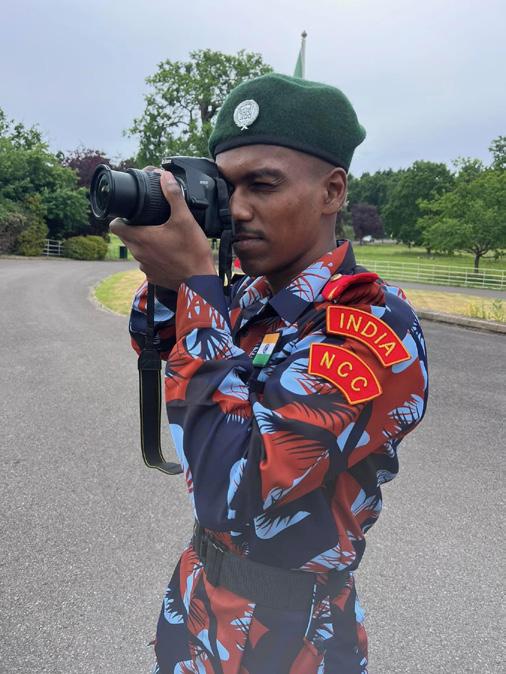
Colonel Mike White JP, Commandant of Northumbria ACF, added: 'It was a pleasure to lead a brilliant UK team of cadets and CFAVs, and to witness first-hand the cultural diversity that gave us all the opportunity to learn more about individual organisations, countries and heritages. The camaraderie shone through from the get-go, and our new-found friends relished everything we put in front of them. Next year’s event is already in the planning stages!'
This is just one of a number of international exchanges being hosted by counties across the UK. Sussex ACF has participated in an Italian exchange programme since 2017, with cadets and instructors joining the annual Italian camp and reciprocating with their own yearly event.
Elsewhere in July, the California Cadet Corps enjoyed the hospitality of Northumbria ACF, while Middlesex and Northwest London ACF hosted cadets from Australia, including sessions with the Royal Armoured Corps Engagement Team and a cross-Channel trip to the battlegrounds of northern France. The Royal County of Berkshire ACF hosted its counterparts from Norway in August.
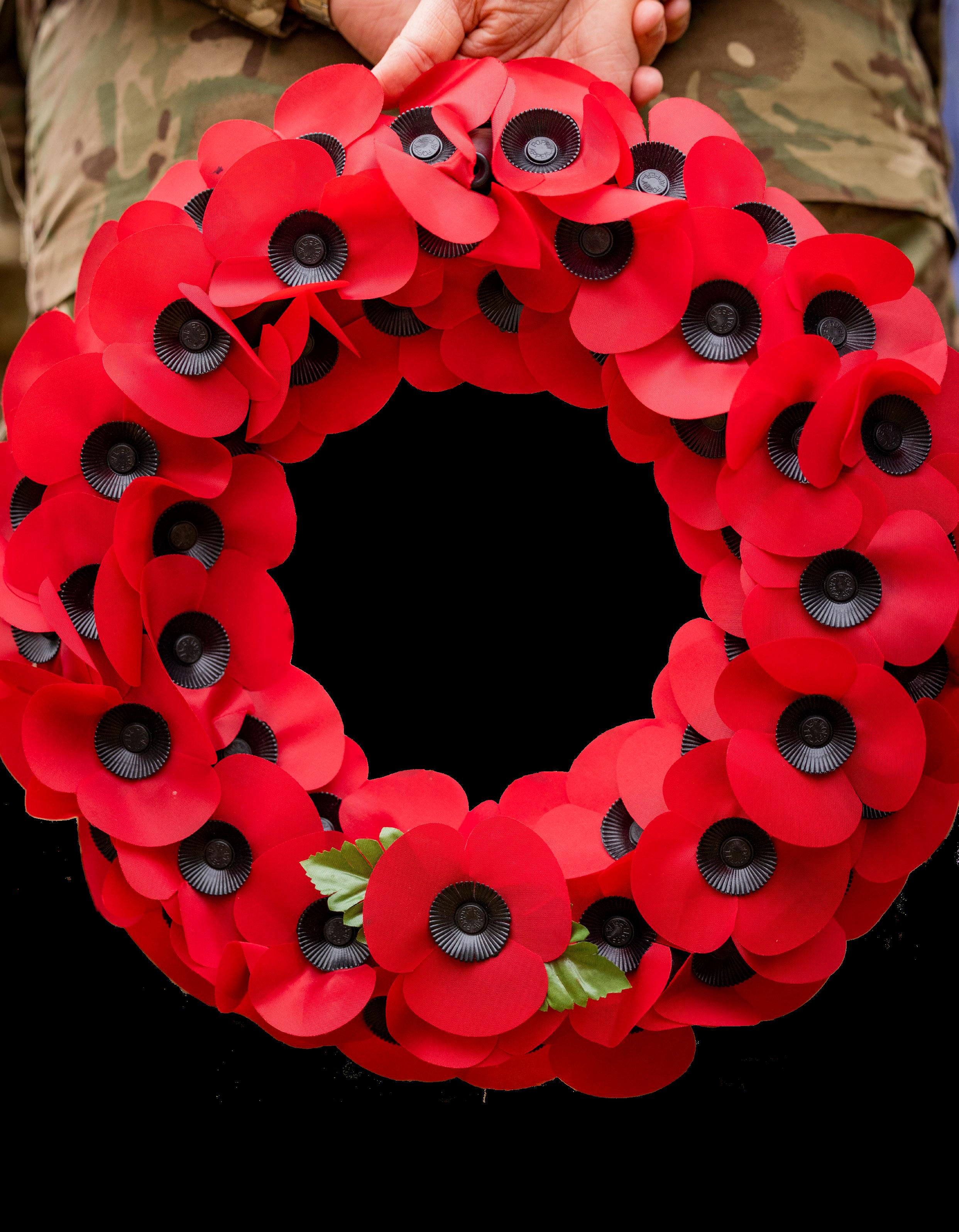
Cadets from Oxfordshire and Northern Ireland marked the 80th anniversary of D-Day by attending commemorative events in northern France. There they had the opportunity to walk in the footsteps of soldiers – including their own ancestors – who landed on the Normandy beaches in 1944, and honour the sacrifices they made.
The D-Day landings on 6 June, 1944, constituted the largest seaborne invasion in history and marked a pivotal moment in the Second World War, launching the liberation of France and Western Europe from German occupation.

It was the 25th time cadets from Oxfordshire ACF travelled to Normandy for its annual eight-day Battlefield Tour. This year was particularly special as it was the 80th anniversary of D-Day, and cadets and CFAVs followed in the footsteps of their predecessor regiment, the Oxfordshire & Buckinghamshire Light Infantry.
Known as the Ox & Bucks, its Second Battalion initiated the D-Day Invasion, landing by glider to capture bridges over the Caen Canal and River Orne on 6 June, 1944.
CFAV Maj Mark Hames ACF, who has attended annual D-Day celebrations in France since 1999, said: ‘The annual tour is a way to honour the sacrifices and ensure the bravery of those who fought is never forgotten. It's an invaluable way for cadets to connect with history.’
Each year the cadets visit more than 20 sites, museums and memorials, and participate in 11 commemoration events where they lay wreaths in remembrance.
He said: ‘It is my hope that these experiences inspire commitment in our cadets to the act of Remembrance for years to come.’
The experience was especially poignant for Cdt LCpl Daniel Marchant. Three of his great-grandfathers served in the war, one flying Lancaster Bombers over Germany from 1942 to 1944. He said: ‘Their courage and dedication during the war inspire me every day.'
The Oxfordshire cadets spent a day at the Memorial Pegasus, which commemorates the actions of the British 6th Airborne Division and the capture of Pegasus Bridge by the Ox & Bucks. Cadets and CFAVs took their annual position as the guardians of the Gliders Stones – six memorials listing the names of every soldier who landed that night.
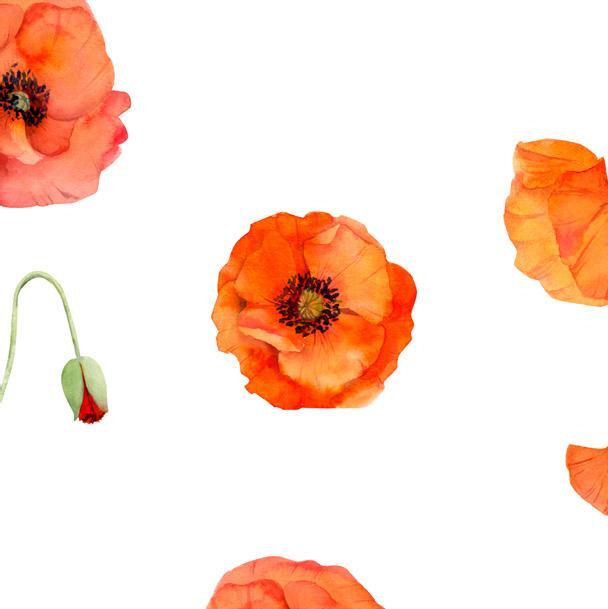
They also attended two 80th anniversary events: a ceremony led by Her Royal Highness The Princess Royal at Bayeux War Cemetery, and the official Remembrance Service at Notre Dame Cathedral of Bayeux in the company of the Chief of the General Staff, General Sir Patrick Sanders.
Cadets and CFAVs also marched over Pegasus Bridge in a parade to the glider landing site, where they laid a wreath and sounded the Last Post. Further tour highlights included unveiling a plaque to LCpl Fred Greenhalgh, who was killed during the landing of his glider, and commemorations in towns where the Ox & Bucks suffered heavy casualties. These events gave the cadets an insight into the impact of the war on local communities.

At the invitation of the Royal Irish Regiment, 22 cadets and six CFAVs from 1st & 2nd (NI) Bn ACF travelled to France. Their aim was to achieve a greater understanding of the role played by the Royal Ulster Rifles (RUR) in the liberation of Normandy on D-Day and during Operation Overlord.
In preparation, they visited the RUR Museum in Belfast to familiarise themselves with the equipment, tactics and men who volunteered to serve. They also met Northern Ireland's last living D-Day veteran, Sgt George Horner, who was 19 when he took part and was awarded the Légion d'honneur, the highest French military order. In a moving gesture, cadets promised to remember his comrades on Sword Beach, and to collect sand to be returned to him.
The trip had a personal element for Cdt Ella Williams, aged 16, from County Down, who was keen to find the graves of her great-grandfather’s two best friends and pay her respects on his behalf. Ella, of 2nd Bn, Killyleagh, said in a BBC News NI interview: ‘We need to carry on the tradition of remembering these people who fought for our freedom.’
1st Battalion Commandant Col Sam Donnell told the cadets who attended: ‘The Normandy ceremonies are a significant way to honour the bravery and sacrifice of those who fought for freedom. Your commitment to remembering and honouring these heroes ensures their legacy continues to inspire future generations.’


The cadets were based in the community centre in Cambes-en-Plaine, near Caen. The village was liberated on 9 June 1944 by the RUR’s 2nd Battalion at a tragic cost: three officers and 41 other ranks were killed, with 142 men wounded and 11 missing. Deputy Mayor Eric Gobert paid tribute to the sacrifice paid by many Ulstermen that day.
Cadets and CFAVs also attended and conducted nine engagements and services. These included acts of remembrance at Sword Beach, the 1st Battalion RUR memorial in Longueval, and the 2nd Battalion RUR memorial in Cambes-en-Plaine.
Both NI ACF battalion banners were present at the commemorations. These are green and red in reference to the RUR cadet battalions and the Antrim Artillery (Engineers) Cadets, formed in late 1943/44. Many members volunteered as runners for the home guard and Antrim Artillery and later joined the RUR and other units to take part in the Normandy landings.
On their final day in Normandy, cadets were joined by both the Church of Ireland and Catholic Archbishops of Armagh, who spoke to cadets and CFAVs individually about their experiences of the Normandy commemorations.

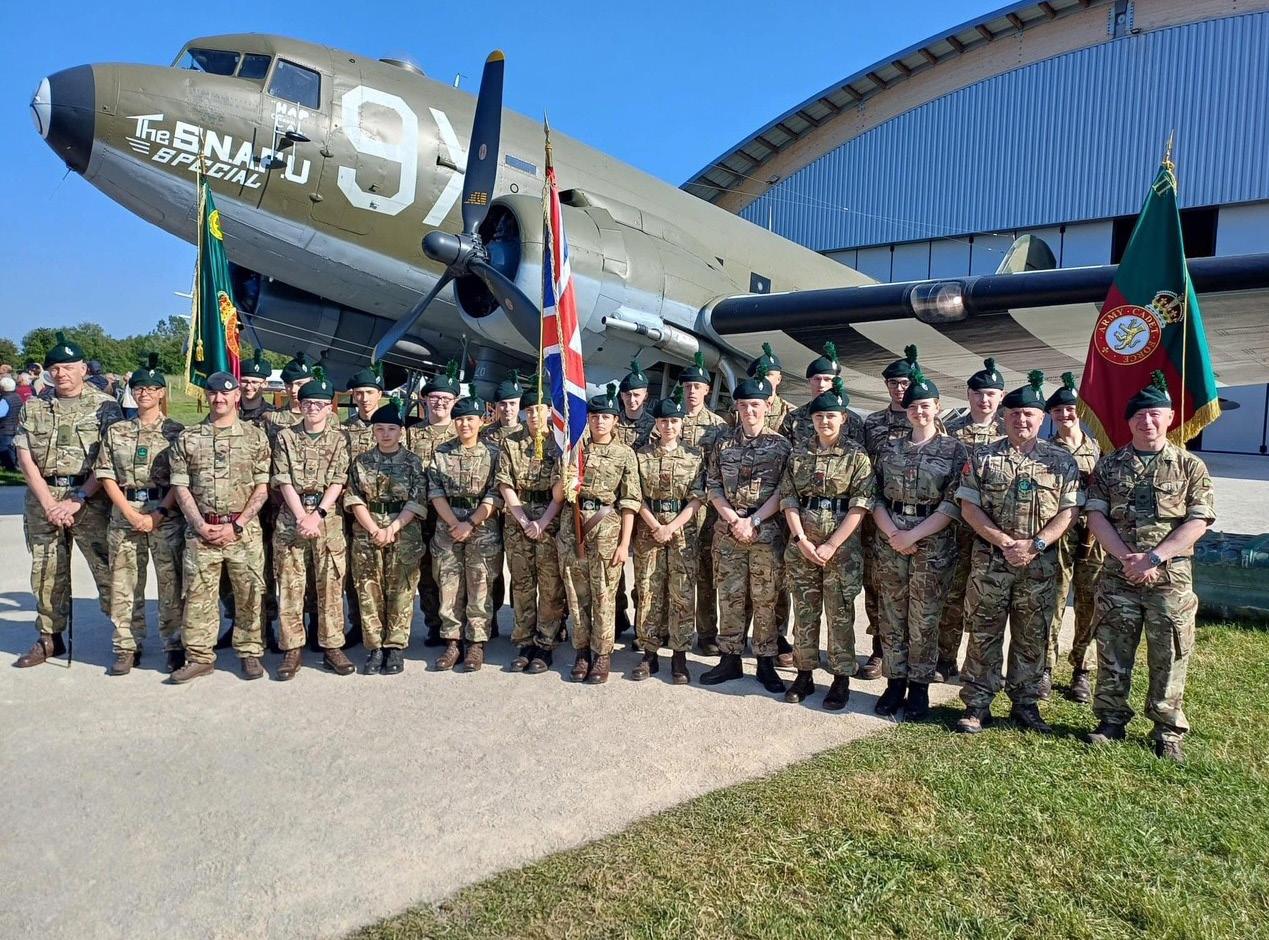
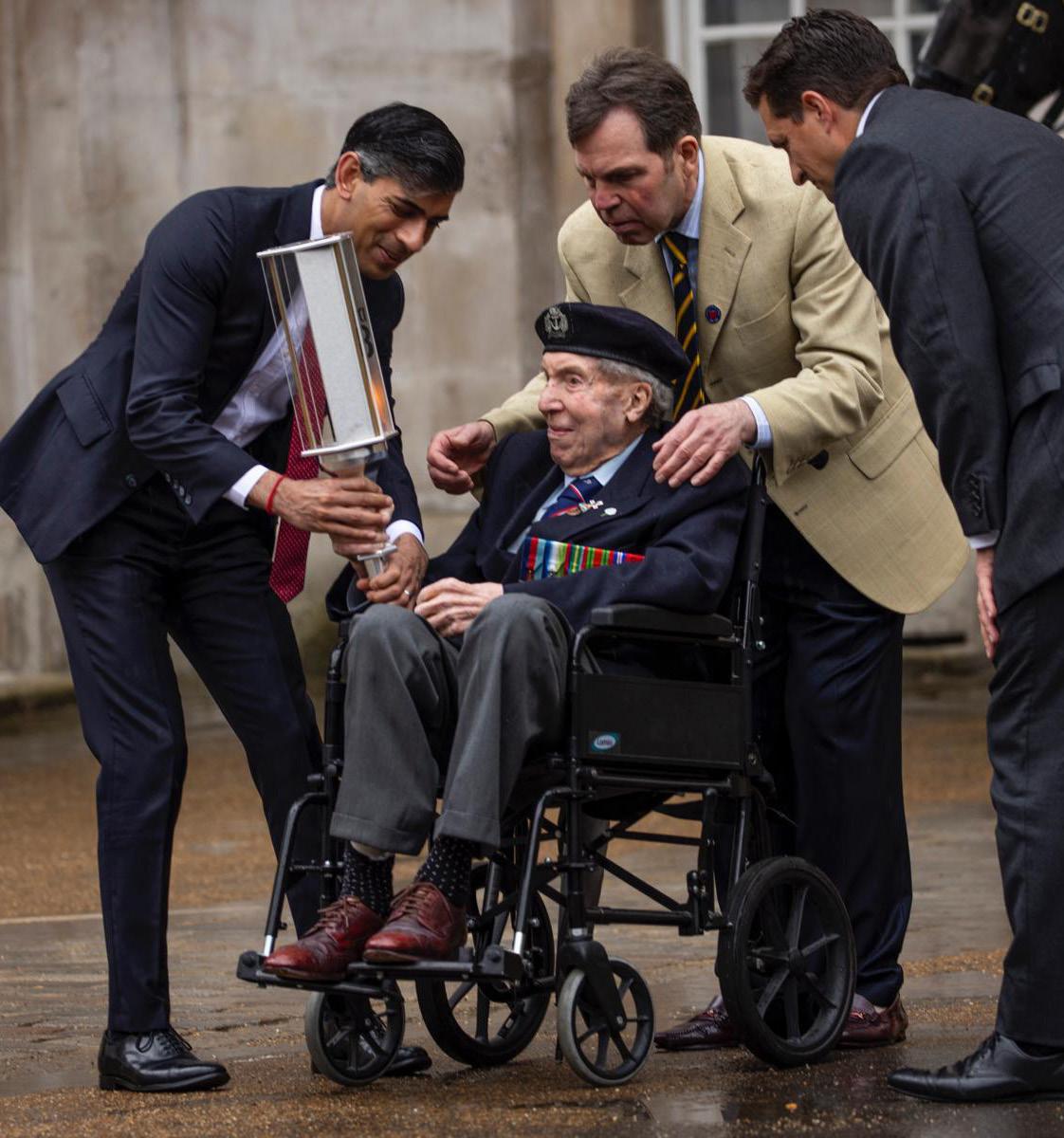
Cdt CSM Aaron Wijendra from Wilson’s School CCF had the honour of taking part in a torch event that launched D-Day commemorations, alongside the then Prime Minister Rishi Sunak, former Defence Secretary Grant Shapps and Second World War veteran Peter Kent.
To symbolise the sacrifices of those who stormed the beaches of Normandy, the Prime Minister handed the Torch of Liberation to Peter Kent during the ceremony at The Tilt Yard at Horse Guards on Whitehall.
The former soldier then handed it to Mr Shapps, representing the government’s dedication to preserving the memory of those who served. Finally, it was passed to Cdt CSM Wijendra, a symbol of the torch’s future path in carrying on the lessons and legacy of D-Day.
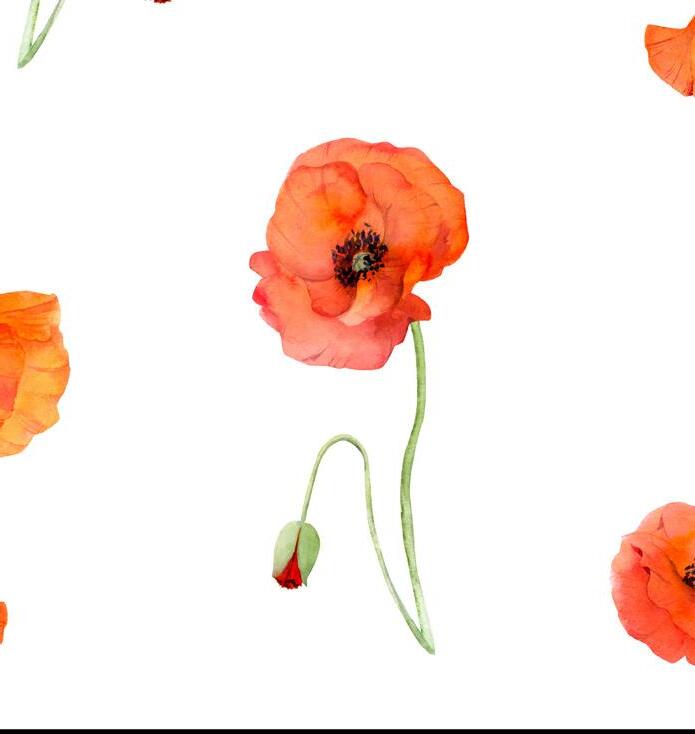
‘Representing the Army Cadets at this event was an honour and a privilege,’ said Aaron. ‘The Cadets’ involvement highlighted the young generation’s crucial role in keeping the flame of history alive, and ensuring the courage and sacrifice of D-Day veterans are never forgotten.’
The ceremony was set against a backdrop of British Army personnel on horseback, a military musician, cadets, and volunteers from the Commonwealth War Graves Commission (CWGC).
Take the test



WO1 (RSM) Simon Hunt of the Coldstream Guards and RSM of CTC Frimley Park explains why Remembrance Day (11 November) is the most important day of the year for the Army Cadets. Read his interview and then take the test to see whether you are ready to serve your community over the Remembrance Day commemoration period.
Remembrance refers to the act of commemorating and honouring those who have died, particularly in military service. Remembrance Day (11 November) marks the end of the First World War in 1918.
It is important for cadets and CFAVs to participate in Remembrance ceremonies to pay respect to those who sacrificed their lives in war. As members of a youth military organisation, cadets carry the duty of upholding this tradition, reflecting the commitment and service associated with their roles.
It's extremely important to look smart so allow plenty of time to prepare your kit. Don't rush as it will show in your overall presentation. Do one piece of kit at a time – I start with footwear and work my way up. Remembrance is a poignant occasion that draws a lot of interest across the nation. You are not only representing your detachment or contingent but also your local community.
Allow plenty of time for rehearsals. Take it nice and steady and ensure everyone understands their role and responsibilities. Rehearse the parade in small chunks so information is retained and to build confidence in those taking part.
Keep the parade as simple as possible. There's no need for complicated drill sequences. The reason for being on parade is more important and will itself bring enough pressure.
Musicians should prepare well, stay hydrated, remember what is coming next and try to relax during the parade.

Know that it's absolutely fine to remember people you have lost – it's completely natural. I always remember friends during the two-minute silence.
For the remainder of the parade, I try to think about what is happening next. This helps to keep my mind on the parade and stop it wandering.
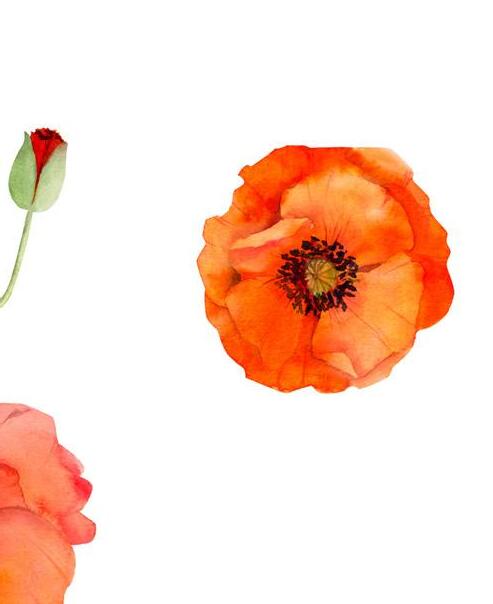
It's important for younger generations to mark Remembrance and be aware of history, to learn from past mistakes and honour the sacrifices of those who fought for peace and freedom. By understanding the causes and consequences of conflicts like the world wars, young people gain a deeper appreciation for the values of peace, democracy and human rights.
Remembrance fosters empathy and a sense of responsibility, helping younger people understand that the freedoms they enjoy today were hard-won. It also connects them to their national identity and shared values. By actively engaging with history, they help preserve important knowledge that can shape a more peaceful future.
Choosing to ‘leave the past in the past’ risks losing valuable lessons and forgetting the causes of conflict and the cost of war. Remembering ensures that future generations remain vigilant, informed and committed to avoiding the mistakes of the past, while promoting unity and peace.
National Service of Remembrance at The Cenotaph
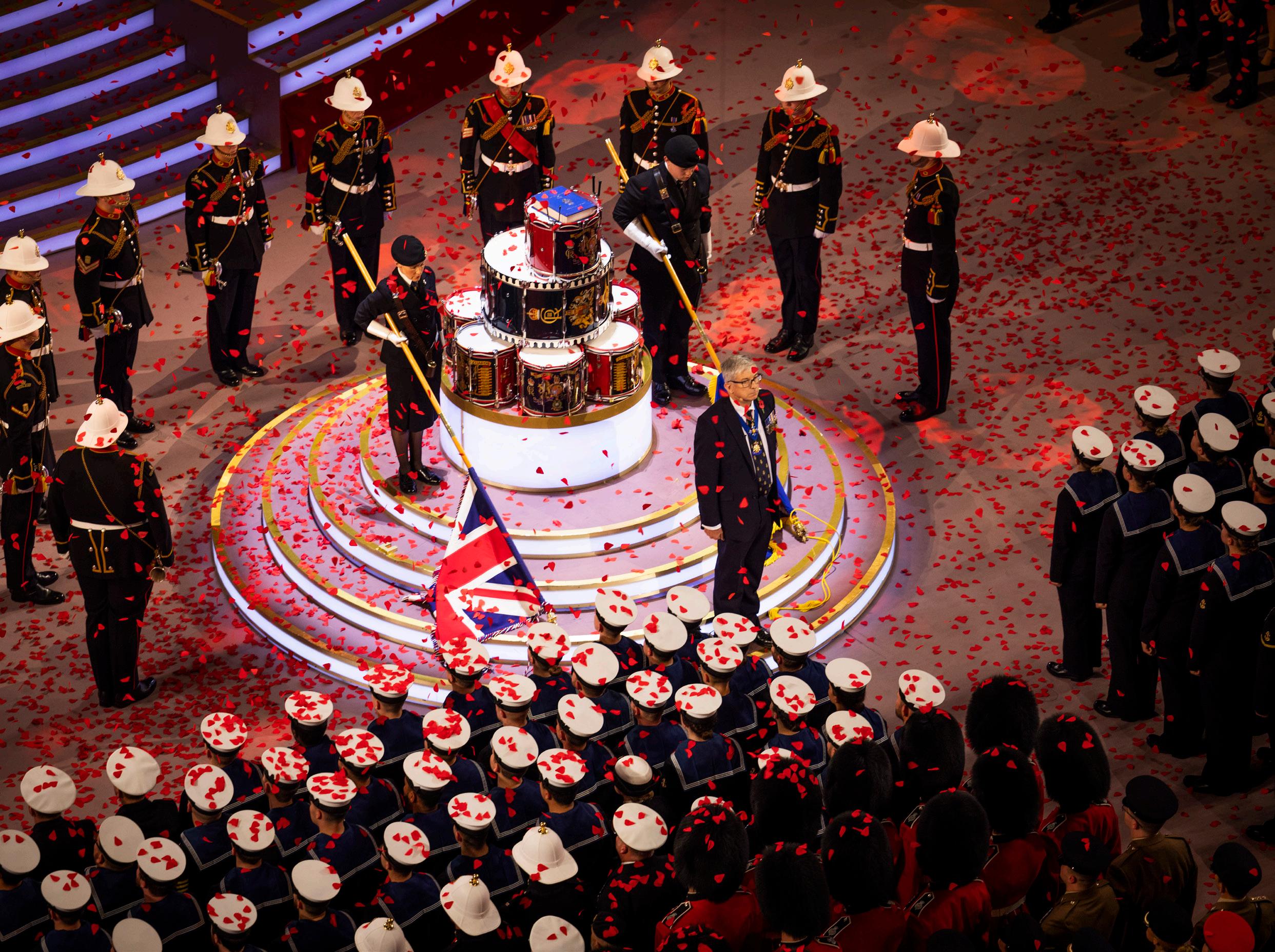
Can you share a Remembrance event that moved you?
I have taken part in Remembrance services while deployed on operations in Afghanistan, all of which had strong personal connections.


Last year I had the privilege of being involved in the Festival of Remembrance at the Royal Albert Hall in London. I had the honour to look after the bereaved families of service personnel. It was a humbling experience. As a father, it brought home the sacrifice that service personnel and their families make. Listening to their stories will stay with me for a long time.
You became RSM at CTC Frimley Park in April. What do you hope to bring to the role?
I hope to bring my wealth of experience and knowledge from the Army and utilise it within the cadet world. I aim to offer advice and assistance to cadets and CFAVs as and when required. At the same time, I will be learning from their experiences as I enter the world of the Army Cadets.
The National Service of Remembrance is held at The Cenotaph in Whitehall, London, on Remembrance Sunday. It provides the nation with a reminder of those who have served and sacrificed, with British and Commonwealth soldiers, sailors, airmen and airwomen represented, together with members of the emergency services and civilians.
Members of the Royal Family, including His Majesty The King, pay tribute alongside serving politicians and former prime ministers. The service features a march-past involving 10,000 veterans.
Every year, cadets raise thousands of pounds for the Royal British Legion's annual Poppy Appeal by selling poppies. It allows cadets to interact with their communities and raise funds for service personnel and their families.
Poppies are a symbol of hope and worn as a show of support for the armed forces community. In the First World War, poppies were a common sight because they flourished in the soil churned up by fighting and shelling.



Fancy winning the latest Kammo Tactical Mark 3 Small Tactical Assault Pack? Take our test and you could be in with a chance of winning this handy and practical piece of kit from Cadet Direct.
It may be smaller in capacity than larger packs, but it still retains loads of cool features. Perfect for patrols, road marching and fieldcraft exercises, this latest MTP patrol pack is constructed from tough 1000D MTP waterproof nylon, making it ideal for use with your PCS uniform and equipment.
It's been specially designed with plenty of pockets, compartments, a hydration sleeve and webbing so you can attach additional gear and carry everything from bladders and mats to a first aid kit and maps. Its adjustable straps and belt mean it can be customised to your size and height.
To be in with a chance of winning, click here or scan the QR code and answer the questions. If you get all the answers correct you will be put into our Tactical Assault Pack draw.
Closing date for entries is Monday 2 December.
1. Why is Remembrance Day on 11 November?
A To mark the end of first world war hostilities, which ended at the 11th hour of the 11th day of the 11th month of 1918.
B To mark the end of the Second World War.
C To pay tribute to 11 Army heroes who defined the outcome of the First World War.
2. Where is the National Service of Remembrance held each year?
A The Royal Albert Hall, London.
B Buckingham Palace, London.
C The Cenotaph on Whitehall, London.
3. Why do cadets need first-rate turnout and drill for Remembrance?
A To be the centre of attention at a national event.
B To represent and serve their unit and local community on an important day for the Armed Forces and nation.
C To impress onlookers and distract from the sadness of the occasion.
4. What are the funds raised by the selling of poppies used for?
A Government-funded youth organisations.
B Charities chosen by the Royal Family.
C The Armed Forces community.
5. When preparing kit for Remembrance, you should always:
A Demonstrate how quickly you can get ready.
B Ask your parents or guardians to help you with ironing and polishing.
C Take your time and make sure each piece of kit is perfect before moving on to the next.
Walking With The Wounded’s December fundraiser has become extremely popular with Army Cadets units – we find out why.
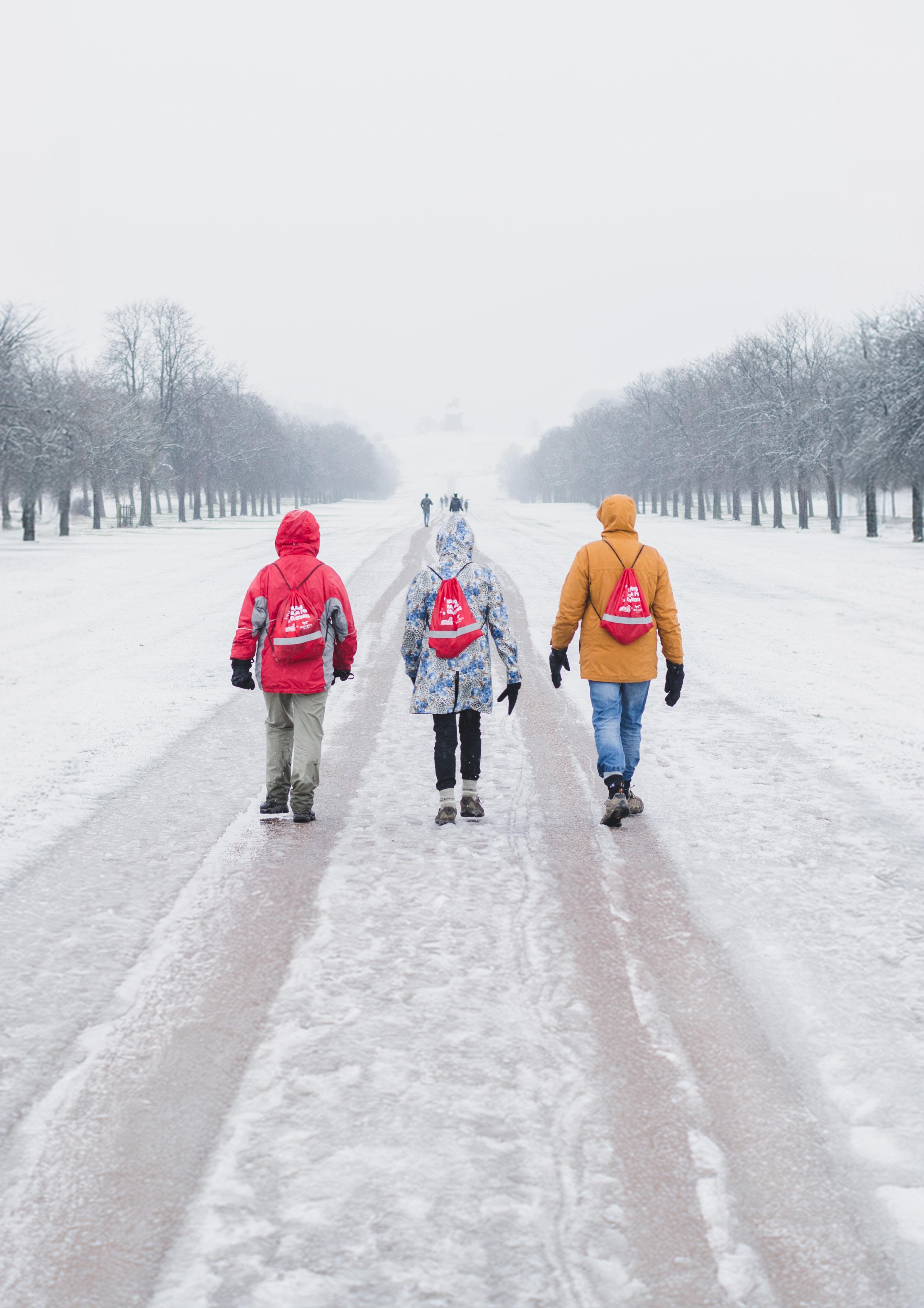
When it comes to fundraising for charity, Walking With The Wounded (WWTW) is an extremely popular choice among cadets and their units. It’s easy to see why, when you consider the brilliant work it does in supporting ex-service personnel and their families.
Over two days in June, Cdt Cpl Bobbi Sancha, 16, from Hove, raised almost £1,500 by completing the Three Peaks Challenge, scaling Ben Nevis, Scafell Pike and Yr Wyddfa
(Snowdon). 'It felt fantastic reaching the summits knowing that my efforts were helping such an important charity,' said Bobbi, who joined Sussex ACF in 2021.
In 2020, 75 Army Cadets teams raised £61,170 by taking part in Walking Home for Christmas, WWTW’s flagship fundraising and awareness event. It was the single largest total ever raised for WWTW by one organisation, and fed into the £2 million the event has raised since its launch in 2013.
Brilliant fundraising endeavours like these by cadets have helped make a huge difference to WWTW’s ability to provide practical support for veterans
and their families. For instance in 2023, the charity was able to run employment, social support and mental health programmes, which helped over 2,000 people make the transition from the Armed Forces to civvy street.
'It’s fantastic to have such incredible support from the younger generations,' said WWTW events manager James Davis. 'The dedication and enthusiasm of cadets not only helps raise essential funds but also fosters a sense of intergenerational community and solidarity.'
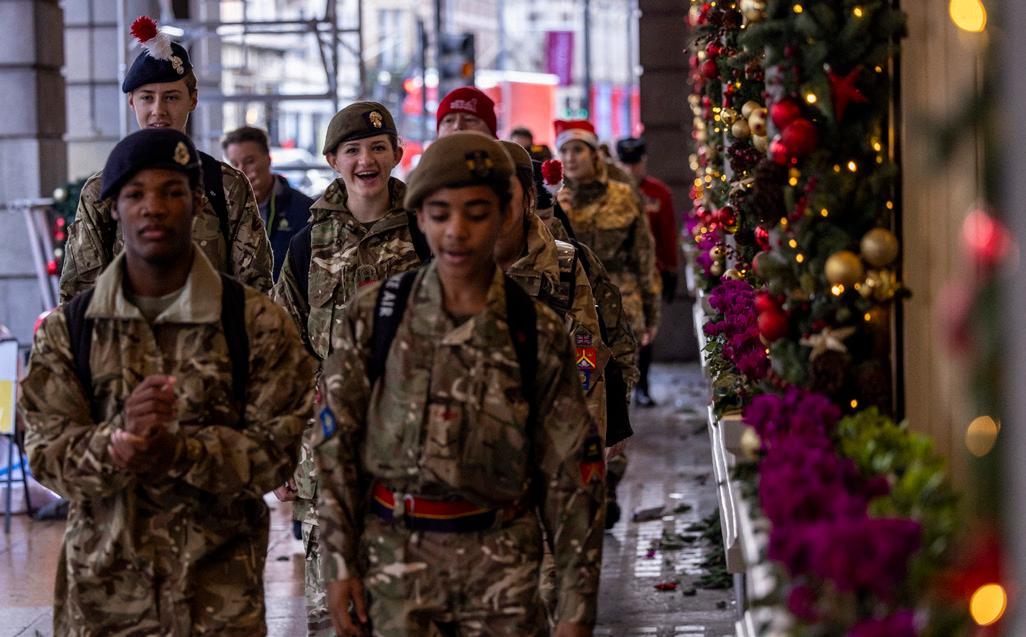
Christmas is coming, and with it comes WWTW’s biggest annual fundraising event. The popular Walking Home for Christmas has been rebranded this year as Walking Home – to be more inclusive and to enable participants to extend the fundraising period into January.
Last year, cadets and CFAVs from 13 Company SW London ACF raised £2,794 by trekking 18 miles from Putney to the Royal Hospital Chelsea, passing 10 London bridges to mark the event’s 10th anniversary. Team members donned Santa hats and carried a Christmas tree, which they delivered to the hospital.
The cadets were very motivated by the cause they were supporting. Cdt Firdaous Idris of 131 Battersea Detachment Royal Tank Regiment said: 'As well as wanting to pass my star levels, it was also an opportunity to acknowledge those in my regiment and the wider armed forces, who took part in wars. I wanted to honour and serve them in some way.'
Cdt Cpl Katie Cheetham of 137 Detachment Putney Grenadier Guards added: 'I wanted to support the families and veterans and to give back to a great charity.'
Maj Kaz Lorimer (Officer Commanding, 13 Company, SW London ACF) said cadets often give the following reasons for turning out in the cold to walk long distances: 'There’s giving support and raising money for a charity that helps those who have given their time and more; wanting to be challenged and to be part of a community; and because it is the right thing to do.
'Also, our cadets are fiercely loyal to their affiliated regiments, and it’s an opportunity to feel part of that regimental family.'
There are no restrictions on how far cadets walk – it could be 12 miles on the 12th of the month, a walk from or to a barracks or war memorial, or a daily mileage target.
'At that time of year, it’s cold, dark and miserable,' added WWTW events manager James Davis. 'Motivating yourself to get out there can be a challenge, but Walking Home emphasises the fact that sometimes all you need to feel better is to go out for a walk-and-talk with friends. That’s why cadets often do it in teams or detachments.'

SSI Lewis Wilde was inspired to raise cash for WWTW by his voluntary work with veteran social groups. With SSI Matt Marquis, he led a plucky team of CFAVs from Yorkshire North and West ACF on a 30km walk from Galtres Training Area in Strensall to Malton Detachment last December.
Conditions were wintry and it snowed. When the team completed their journey, they found an email from WWTW telling them exactly how the £1,500 they'd raised would be spent. SSI Wilde said: 'It made us quite emotional – and because we were a bit short of the amount required, we shook the tin some more.'
One grateful veteran, who has seen the benefit of such fundraising efforts, said. 'I was struggling to support my family and working extra shifts to make ends meet, to the point that my mental health suffered.
'WWTW was phenomenal. My care coordinator came to my house and asked, "What can we do to help you today?". We talked, and she found the funds to get us through. It relieved the constant stress of how to keep the kids fed and warm. For the first time in a very long time, I can see a way forward.'
Click here or scan the QR code to find out more about WWTW.

THE ARMY CADETS NATIONAL AMBASSADOR RAISED £22,623 FOR THE CADETS’ own CHARITY, ACCT UK, WHILE HIGHLIGHTING CLIMATE CHANGE

At the beginning of April, Jordan Wylie MBE triumphantly completed a demanding eco-triathlon, which saw him cycle on a bicycle made from coppiced wood, sail across the channel in a kayak made from plastic bottles and use his own leg power on a route that took him to three iconic towers.
The Army Cadets National Ambassador completed the challenge with the smallest carbon footprint possible and, at the same time, raised funds for the Cadets’ own charity, ACCT UK. This Tower Power 2024 challenge took him past the Leaning Tower of Pisa in Italy, the Eiffel Tower in France, the Spinnaker Tower in Portsmouth and ended at Blackpool Tower in the UK.
The eco-triathlon was a fundraising success: the 2,588.76km journey, which took Jordan 31 days to complete, raised £22,623.
‘We wanted to fundraise for the Army Cadet Charitable Trust because it’s an amazing youth charity, which provides incredible opportunities for young people,’ he told Kay Burley on Sky News after the event.
‘I also wanted to learn a bit about sustainability because, by my own admission, I’ve been a bit of a serial offender – flying around the world to various continents on my adventures. I just wanted to see just how sustainable we could be.’
Jordan carried his “kitchen” and “bedroom” with him on the wooden bike, stopping to cook along the way and sleeping in a tent. He described his quirky Channel crossing in a boat made from plastic bottles as ‘pretty scary at times; I don’t recommend it to anybody’. He also spoke about a hair-raising incident when he was accidentally knocked off his bike by a truck driver in Paris. However, overall, he described the challenge as an ‘amazing adventure’ but ‘much physically harder than I expected’.
Chief Executive of ACCT UK, Murdo Urquhart, said: ‘We are enormously grateful to Jordan Wylie for choosing to support ACCT UK as the charity for his unique Tower Power 2024 challenge. Jordan is a huge champion of the Army Cadets because he knows it changes young lives for the better and he also knows that ACCT UK plays a vital role in helping young people to access Army Cadets training opportunities through our charitable grant giving.’
Jordan’s amazing feat was part of the Cadet Challenge 2024, where cadets are tasked with getting creative to raise at least £10 to help other cadets access more opportunities within Army Cadets.
Fundraising Manager for the ACCT UK Clara Gill said: ‘Taking on such a difficult challenge is amazing but to do it so eco consciously showed not only what a compassionate and caring man Jordan is but also how strong and resilient.
‘I hope cadets can see what is possible when you put your mind to something and don’t give up. Jordan is an inspiration and we feel honoured that he continues to support our work so passionately. His contribution will make a significant difference to our grants programme.’
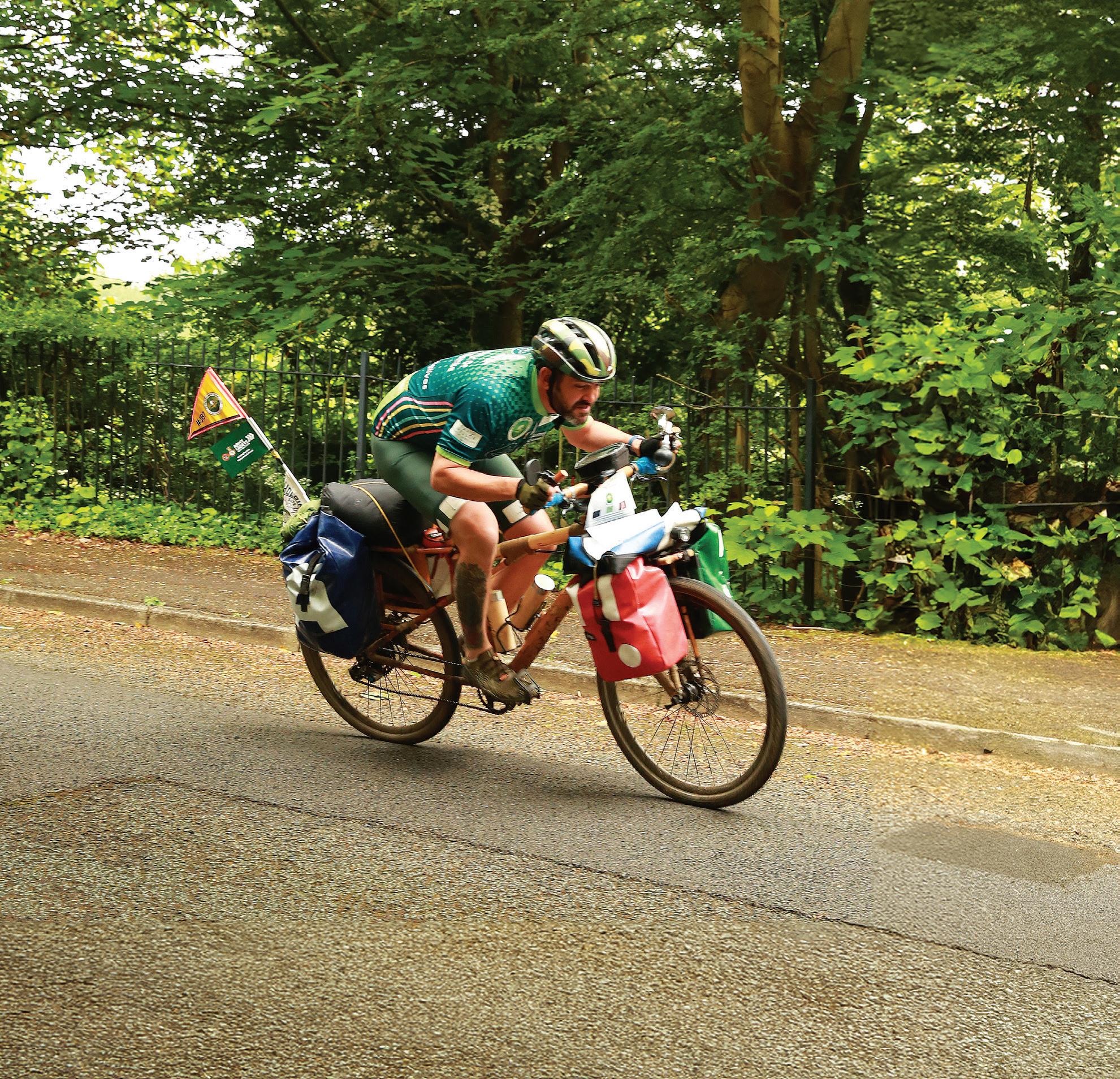



The ACCT UK Cadet Challenge isn’t just about raising money, asserted Clara. ‘It’s also to raise the charity’s profile with adult volunteers and cadets of the ACF as too many are not aware that they have their very own charity!
‘We want to make sure everyone knows that ACCT UK is here to support them, whether they are an individual struggling to fund a place on a trip or a detachment that needs new equipment. Our grants programme is varied, and we are keen to hear from any detachment, company or County that needs support.’
ACCT UK wants to ensure every cadet has the chance to take part in the exciting challenges and adventures the ACF has to offer, and to support the development and wellbeing of adult volunteers.
‘The Cadet Challenge is our way to let everyone know that, at least once a year, they might consider fundraising for their own charity and pledge to raise £10. And when they find themselves in need of funding, we hope we are the first place they come.
‘As an Army Cadets National Ambassador and long-time supporter of ACCT UK, Jordan wanted to lead by example and do his part by taking on the Cadet Challenge.’
The Cadet Challenge is open every year from January to December, and cadets and volunteers can do anything from climbing a mountain to holding a bake sale to help raise funds.
‘No donation is too small and no fundraising idea too crazy,’ said Clara. ‘Our fundraising team is here to assist you every step of the way.’
To find out more on fundraising, email fundraising@acctuk.org
For grants, contact grants@acctuk.org
Click here or scan the QR code to find out how to get involved in the Cadet Challenge.
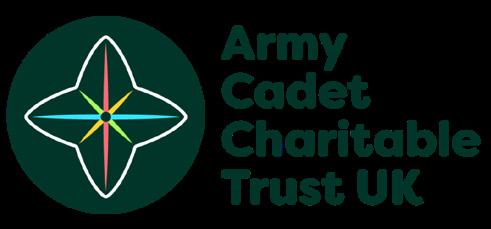
The annual ACCT UK Excellence Awards were presented by guest of honour Jordan Wylie MBE, National Army Cadets Ambassador, on 14 June at Carpenters’ Hall, London. The celebratory event recognised the outstanding achievements of ACF cadets and adult volunteers in 2023.
The awards highlight the crucial role the ACF plays in fostering the development of young people across the UK. They were established to honour the accomplishments of cadets and adult volunteers in the core non-military aspects of the ACF’s training syllabus, which contribute to the broader cadet experience.
The awards recognise achievements in the Duke of Edinburgh’s Award, first aid, music, sport and community service. These activities help develop essential skills and qualities such as self-confidence, self-discipline, teamwork and resilience, and they also enhance the training syllabus by providing cadets with nationally recognised qualifications.
Chief executive of ACCT UK Murdo Urquhart said: ‘ACCT UK’s trustees have long felt that the non-military elements of the Cadets training syllabus are so important to cadets because they
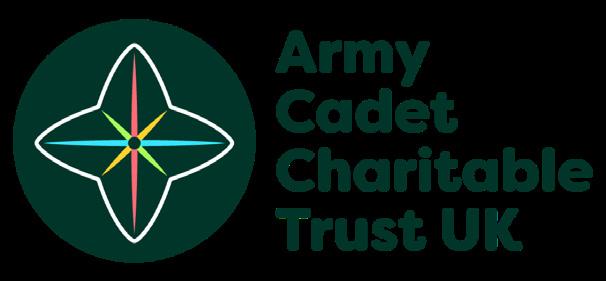
add breadth to the training syllabus, give cadets nationally recognised qualifications and provide them with valuable skills that benefit society.
‘Yet running these activities in the Army Cadets is not easy because the remarkable band of adult volunteers already give so much of themselves in time and commitment. It could be tempting to reduce the priority of these activities in the list of things they could do. So it takes drive and determination to keep them going. These activities are so important, which is why ACCT UK actively promotes them.’
Among the attendees were the lucky recipients of tickets to the King’s Birthday Parade, held on 15 June. ACCT UK wanted to express gratitude to the cadets and adult volunteers of the ACF so, having secured five pairs of tickets, it organised a prize draw. It invited the ACF community to nominate cadets and adult volunteers who had accomplished something special or extraordinary, which was deserving of recognition. The parade tickets were awarded by WO2 Johnson Beharry VC.
The Awards were generously supported by BAE Systems with contributions from Ammo & Co, and HORIBA MIRA.
First Aid Cdt Cpl Lilly-Jade Passmoor, Capt Zada Sloan
Bands & Corps of Drums Cdt RSM Mia Lambert, Capt John Shaw
Pipes & Drums Cdt LCpl Daniel Philp, Pipe Maj Lorna Angus
Sport Cdt LCpl Josh-Moses Amasse, Lt Poppy Gates
DofE Award Cdt CSM Danni Crehan, Lt Col Robert Lockhart
Community Service Cdt LCpl Holly Turnbull, SSI Donna Hawley
Fundraising Award Cdt Eden de Burgh, 2Lt Will East
Click here or scan the QR code to nominate outstanding cadets and volunteers for the 2024 Excellence Awards.



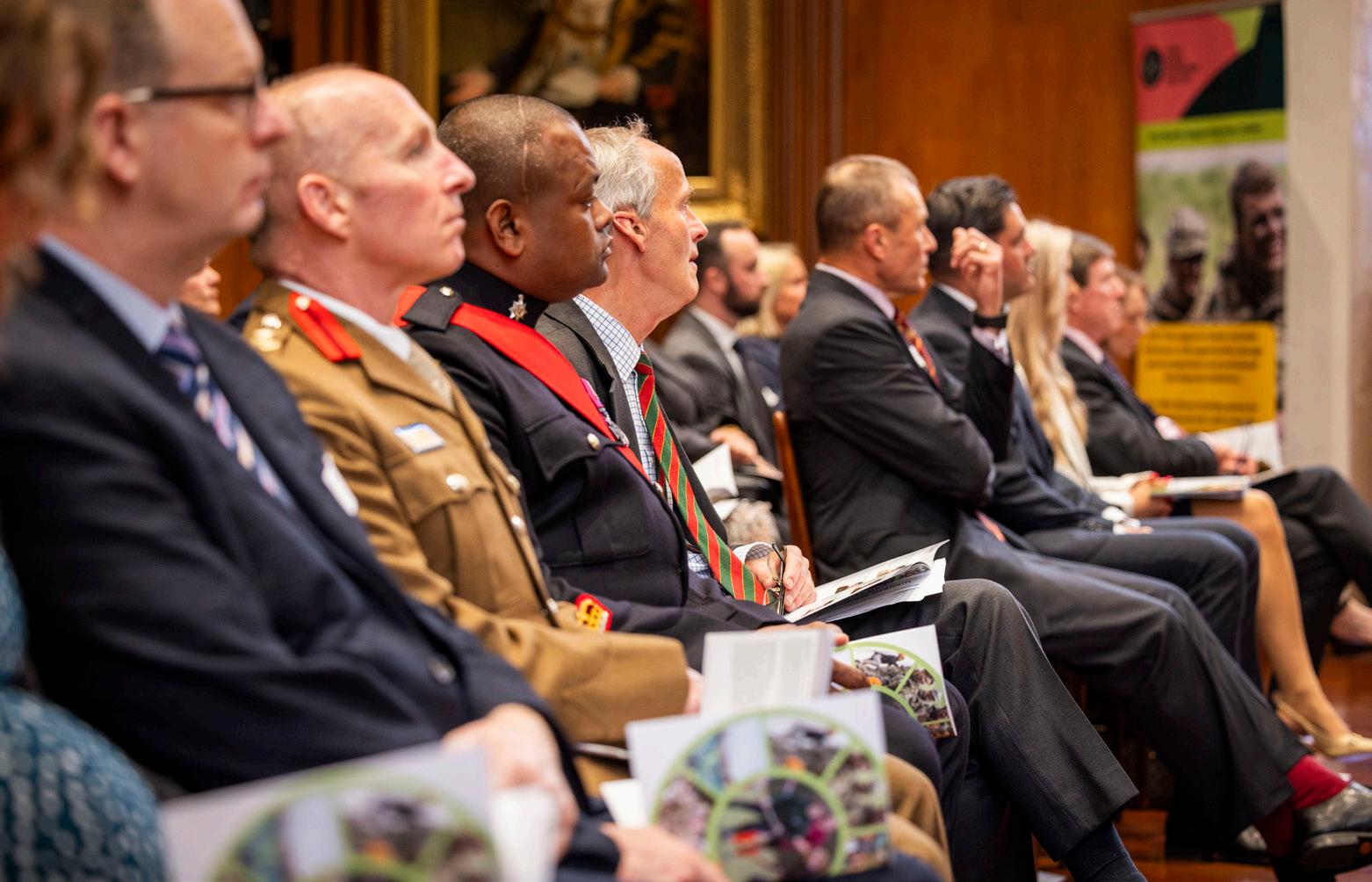


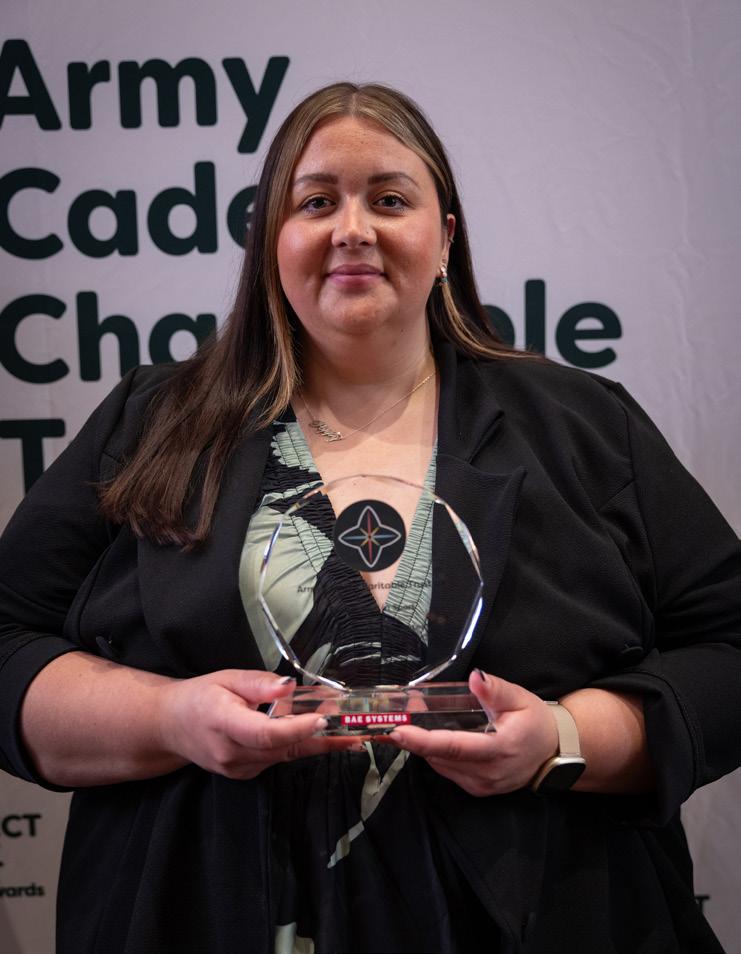


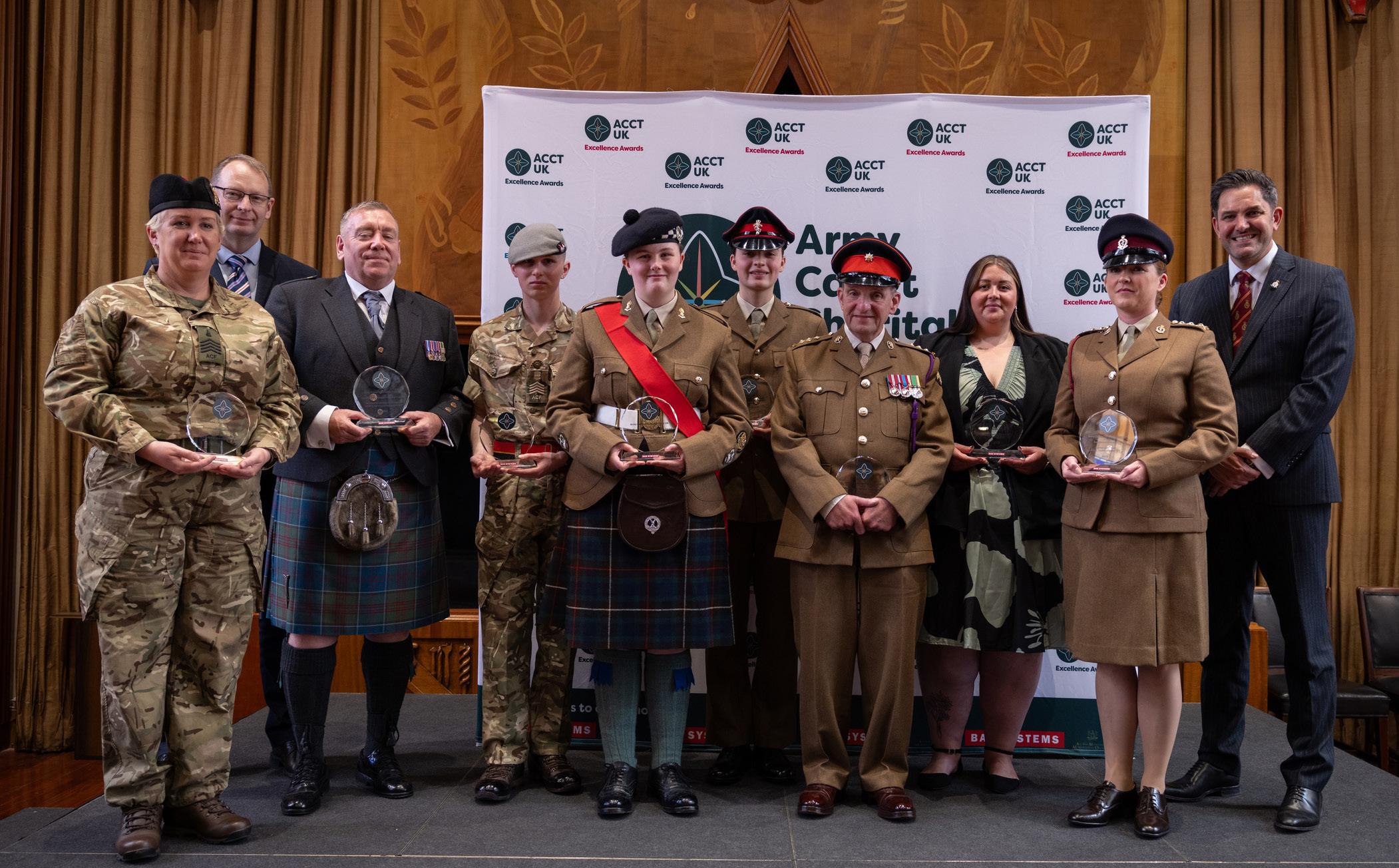





His Majesty King Charles III has become the new Patron of ACCT UK. The organisation is deeply proud of its long-standing royal association. His Majesty succeeds Her Late Majesty Queen Elizabeth II as its patron.


We took our cameras out to capture some of the camp activities that went down across the UK this summer. Can you see yourself or your fellow detachment or contingent cadets in our roundup?
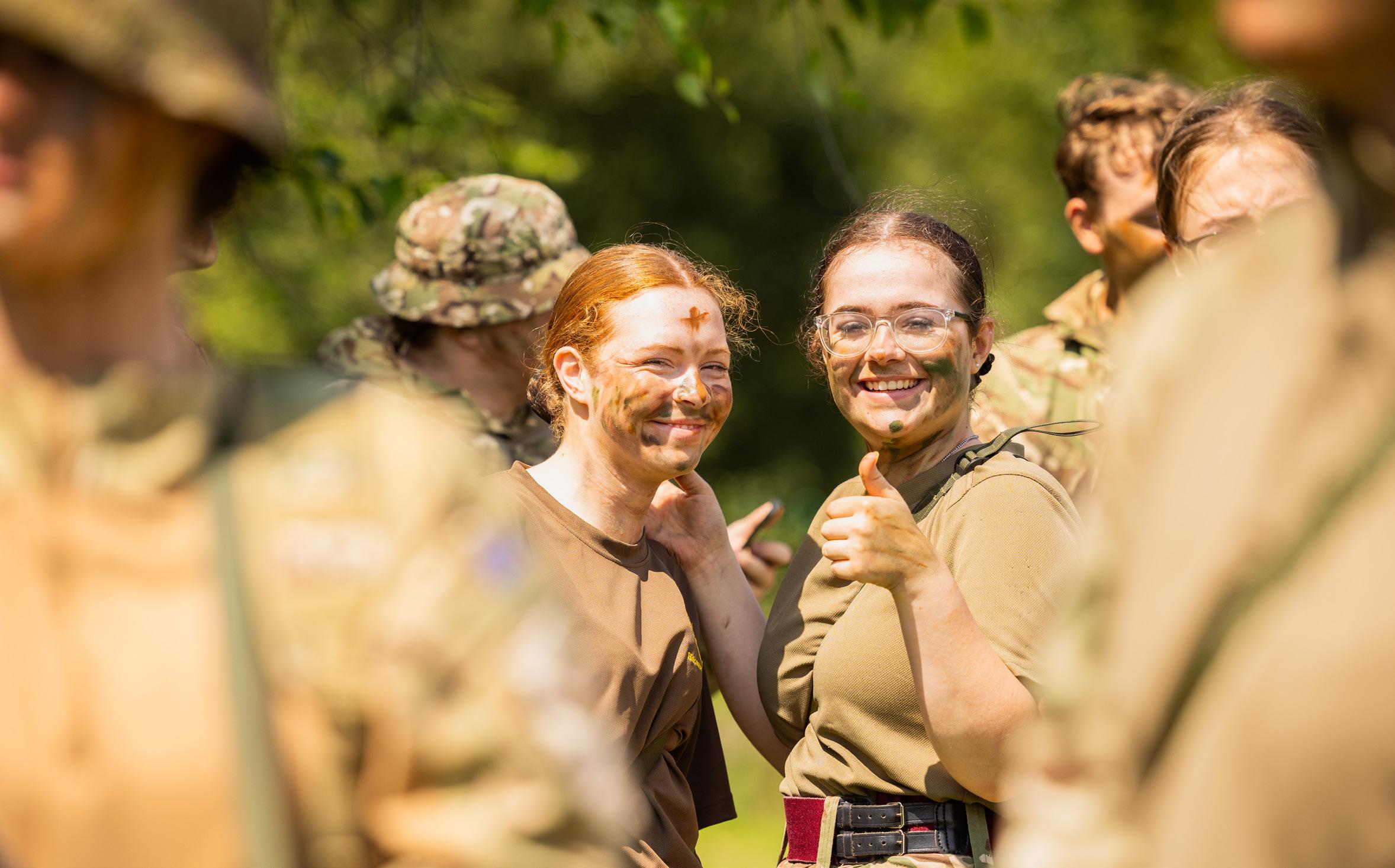
Making friends, camp food, earning badges and playing games ...
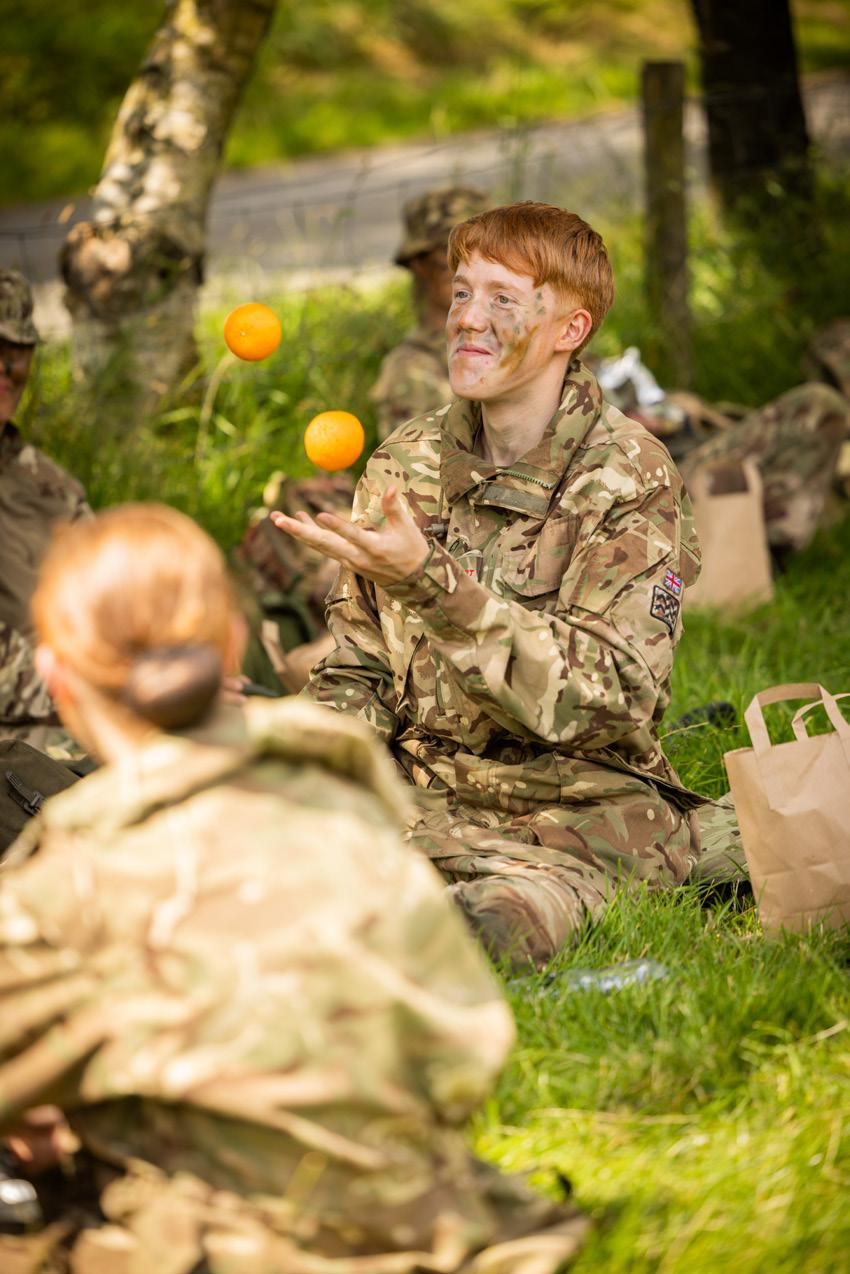
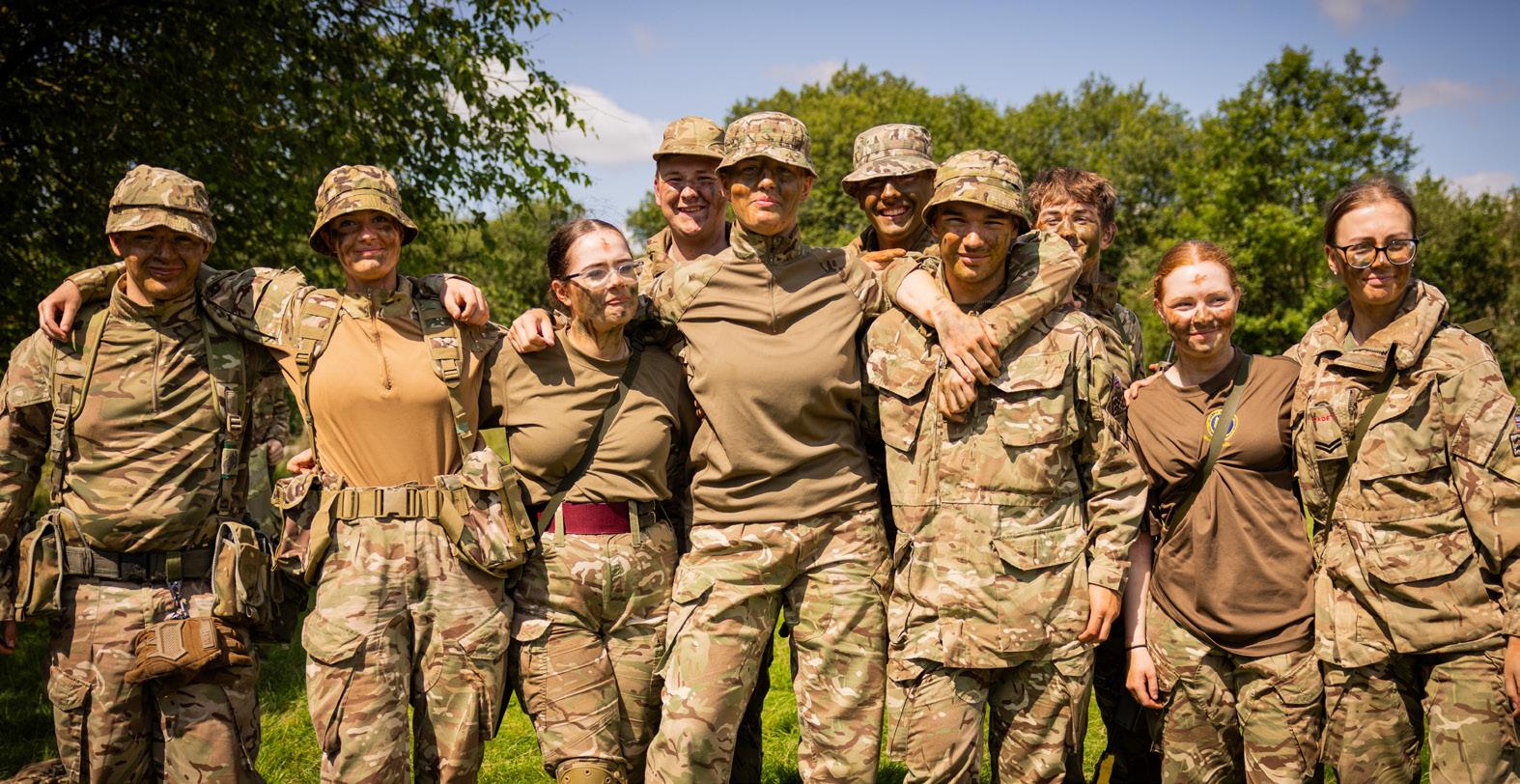



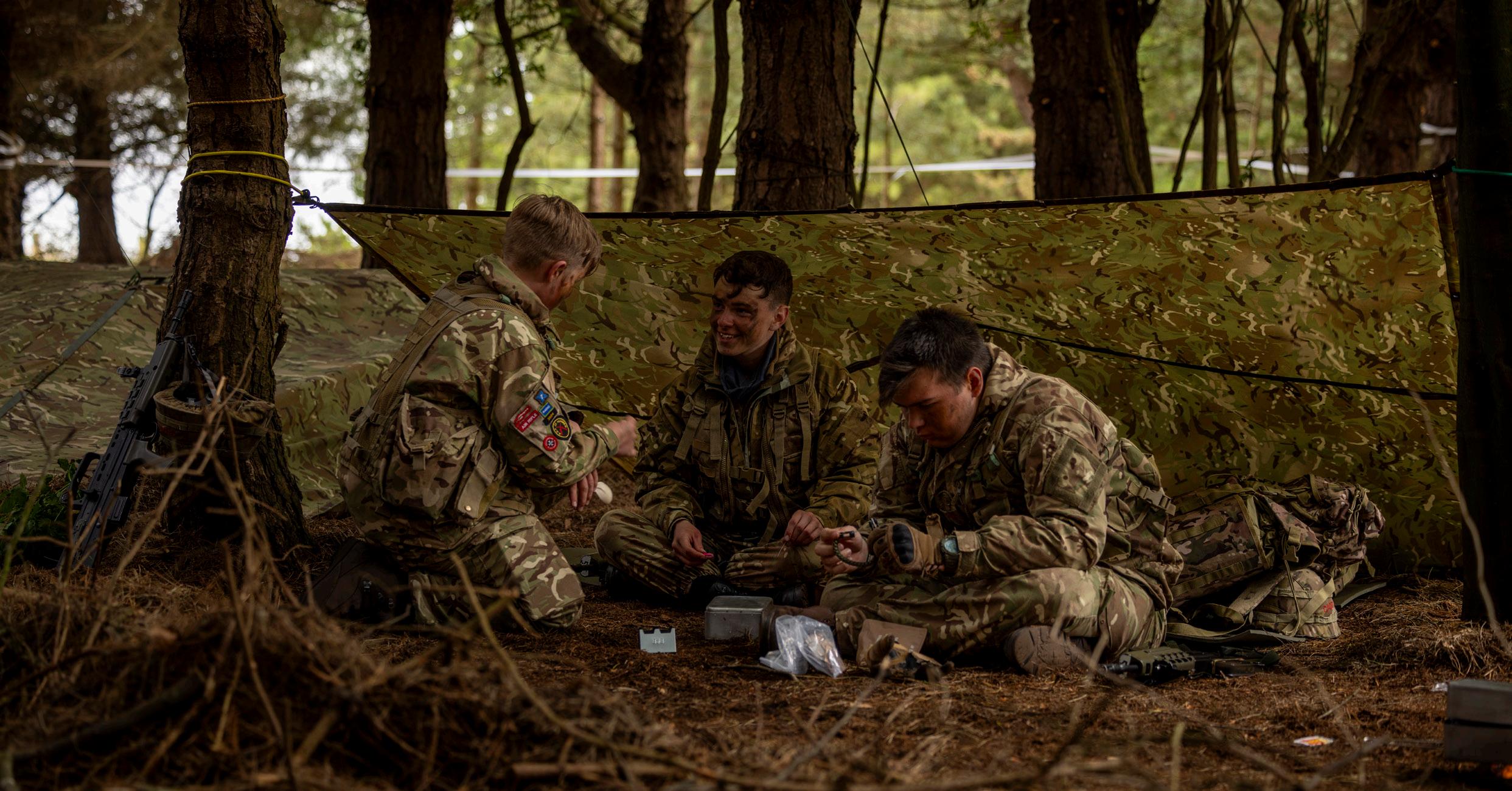
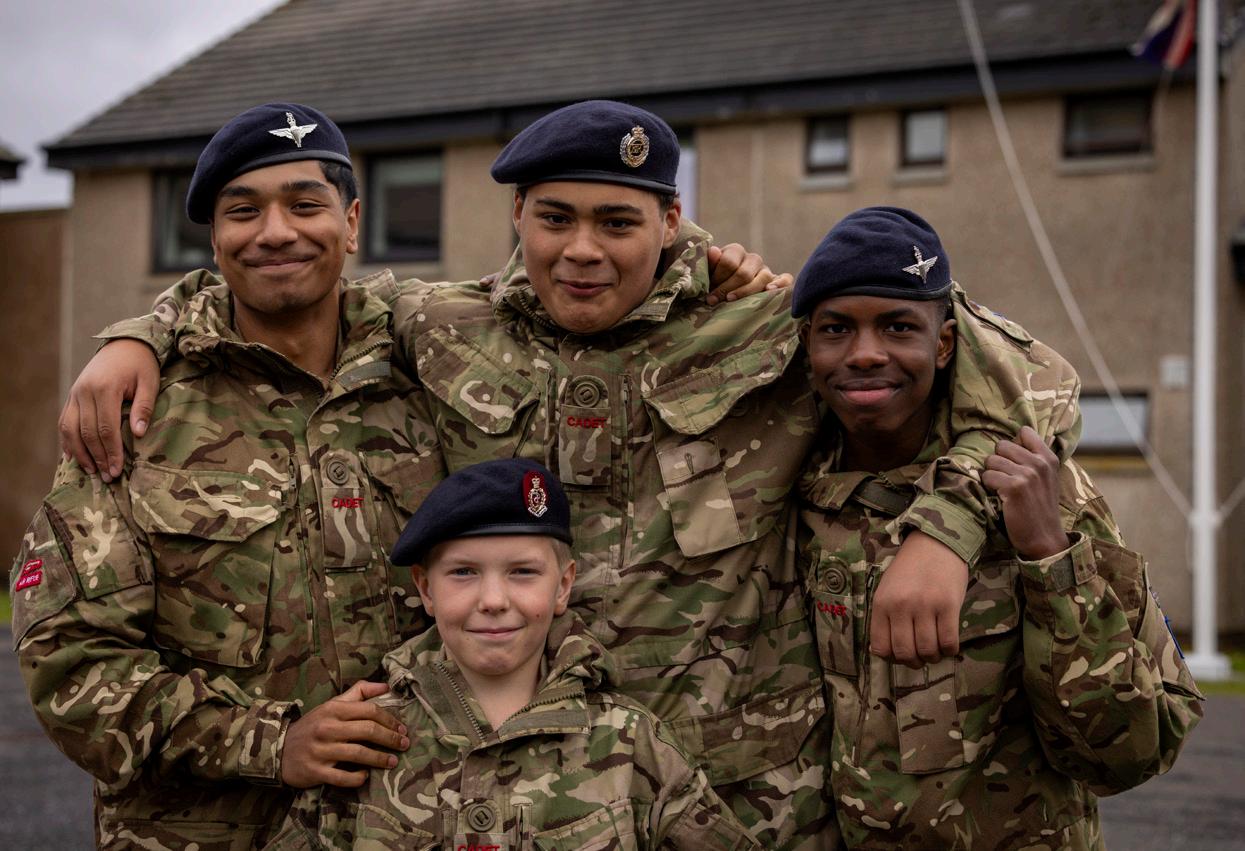





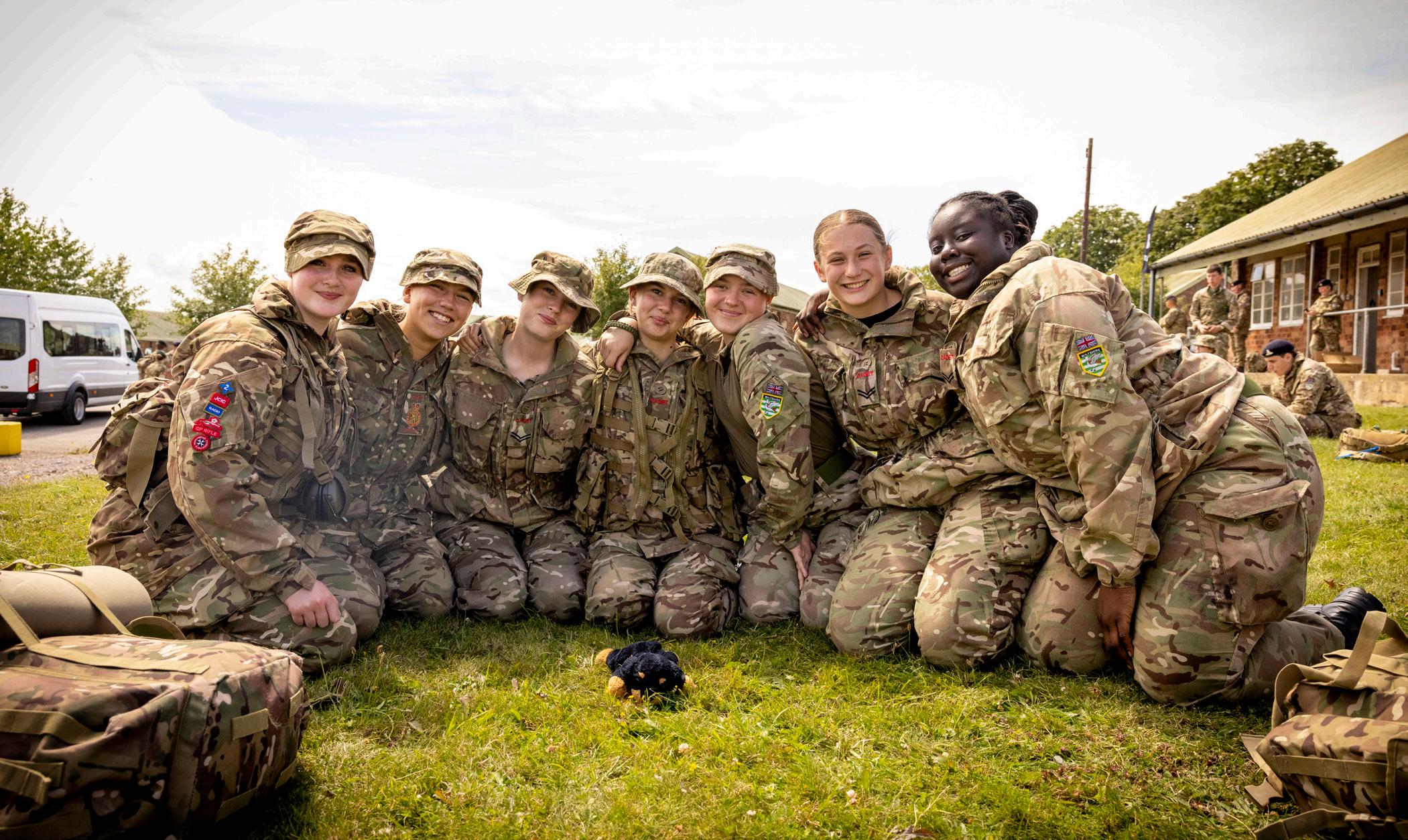

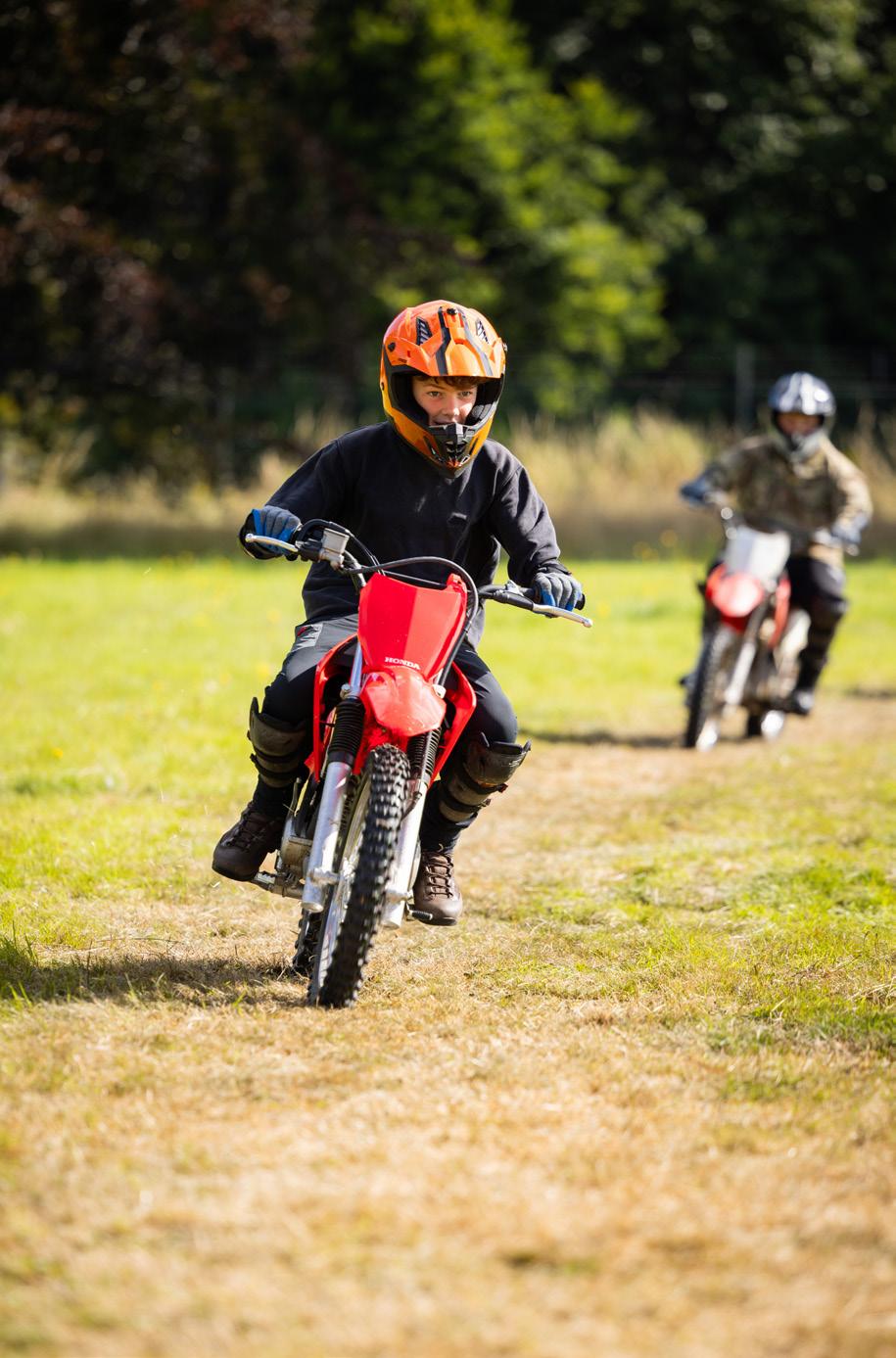
Motocross, SUPs, mountain biking, canoeing, windsurfing, hiking and treetop adventures were just a few of the adventurous activities that cadets took part in this summer.
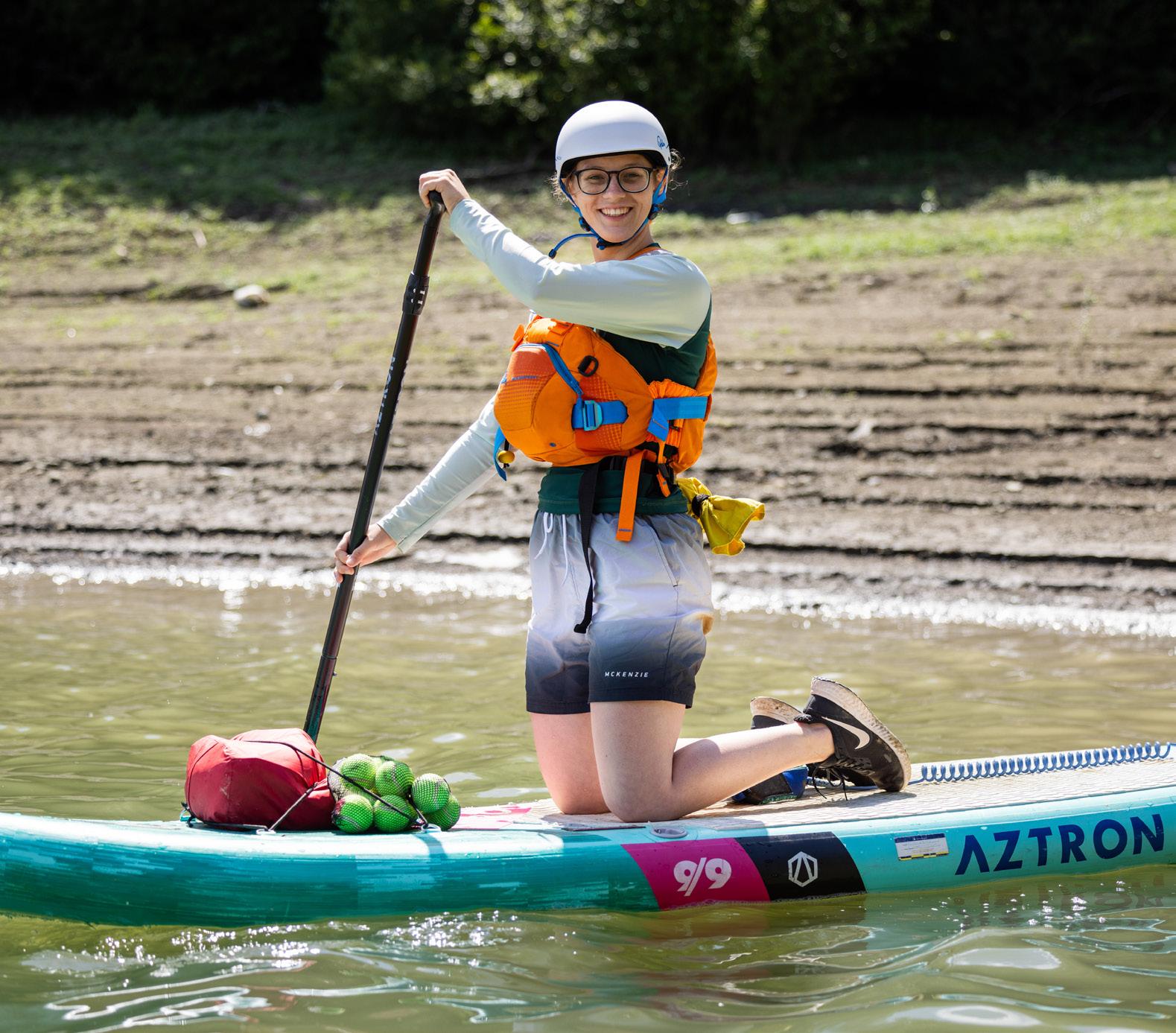

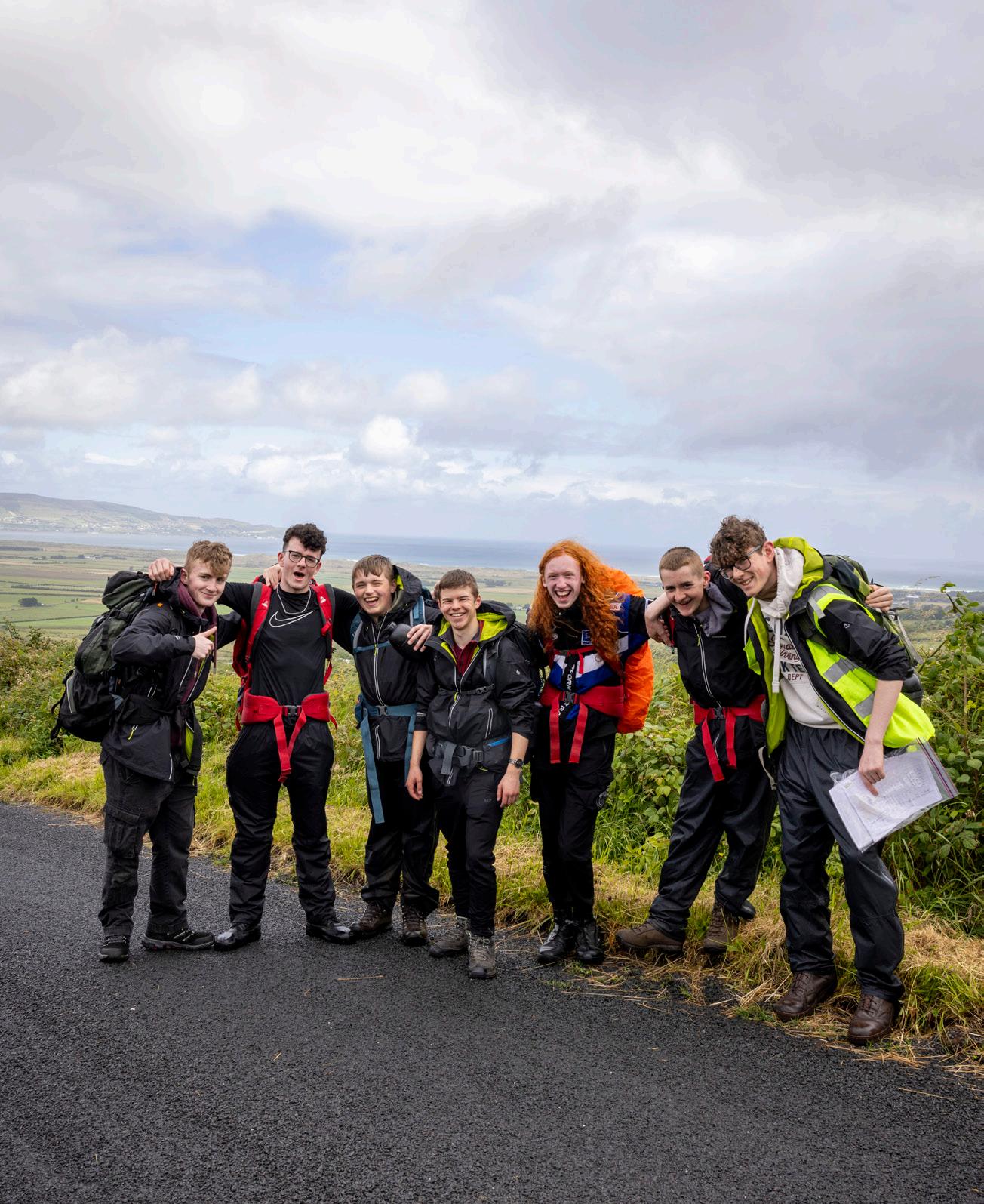








Cadets were put through their paces and polished their drill skills at camps across the UK.

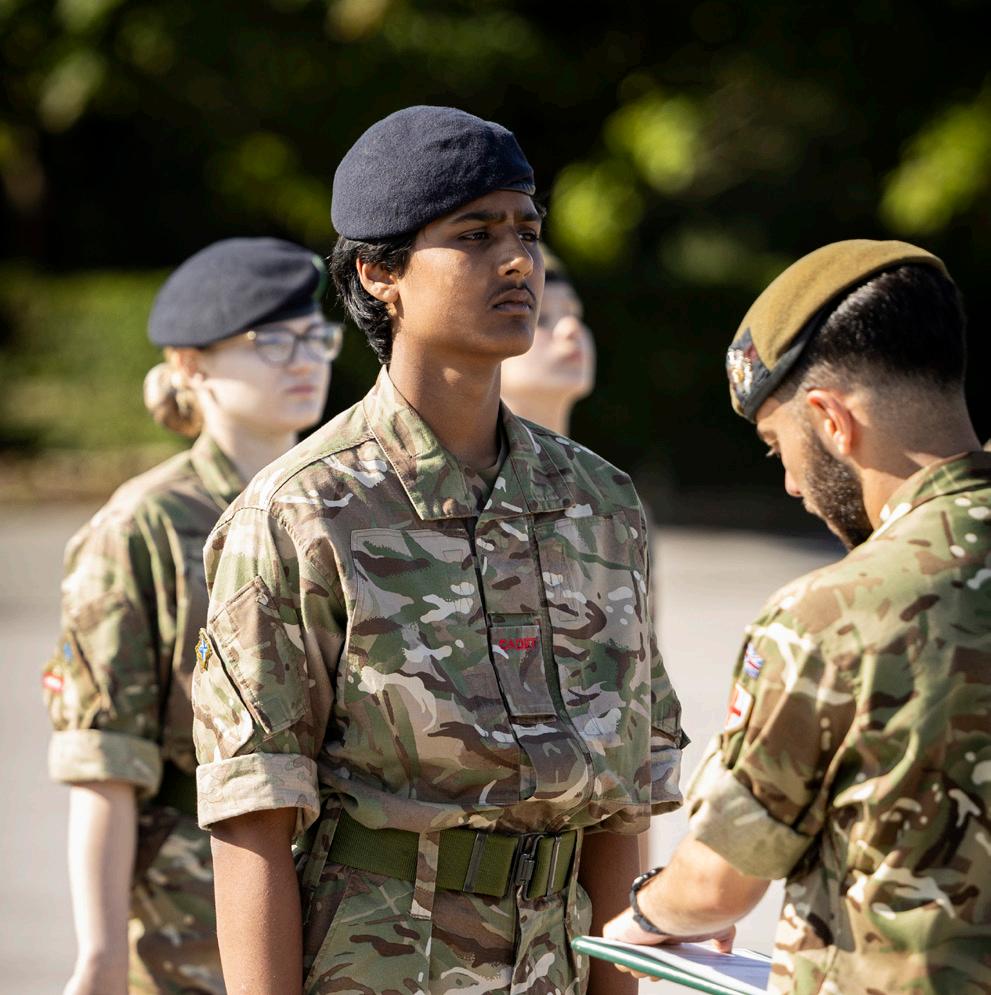

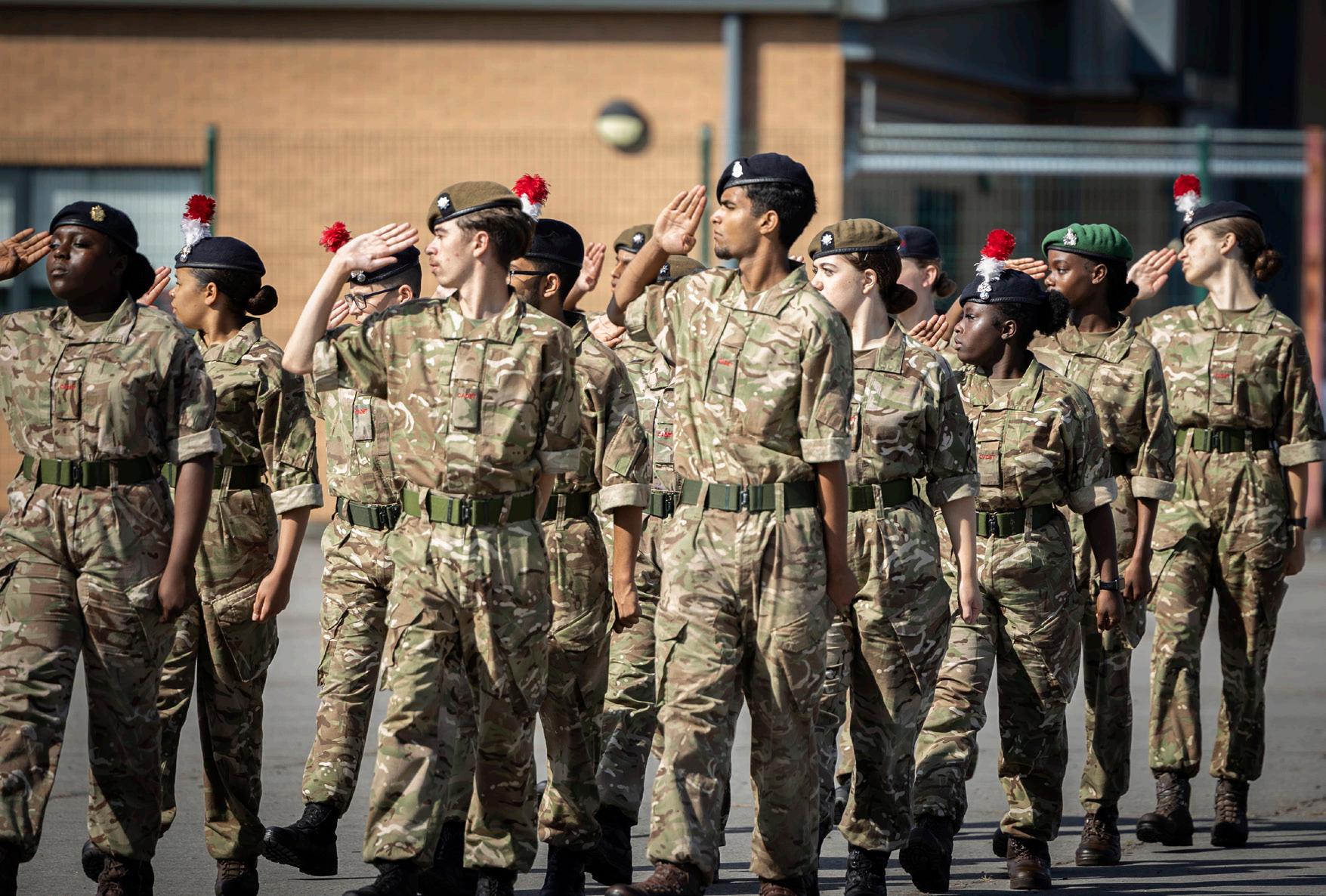



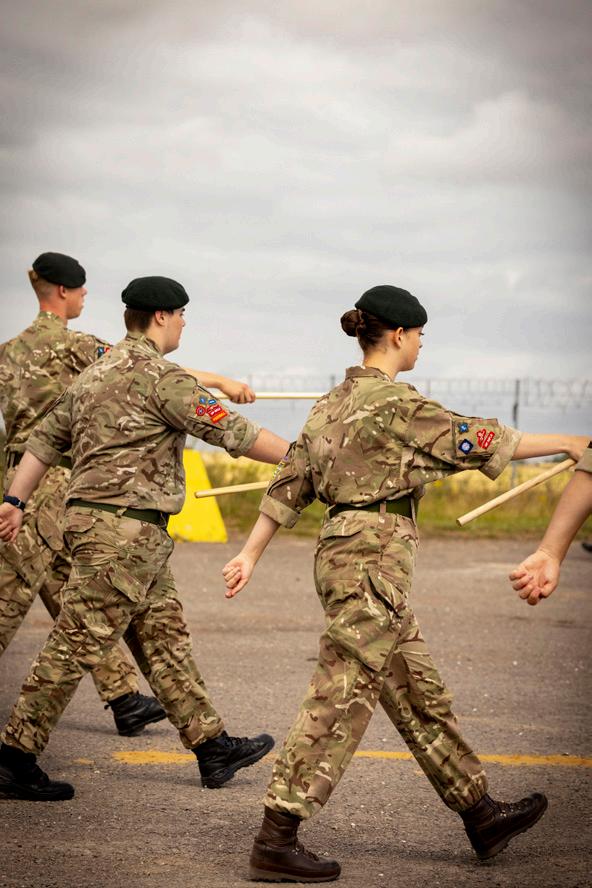

Cam-creamed and ready for action, cadets undertook a variety of exciting fieldcraft activities at camp.
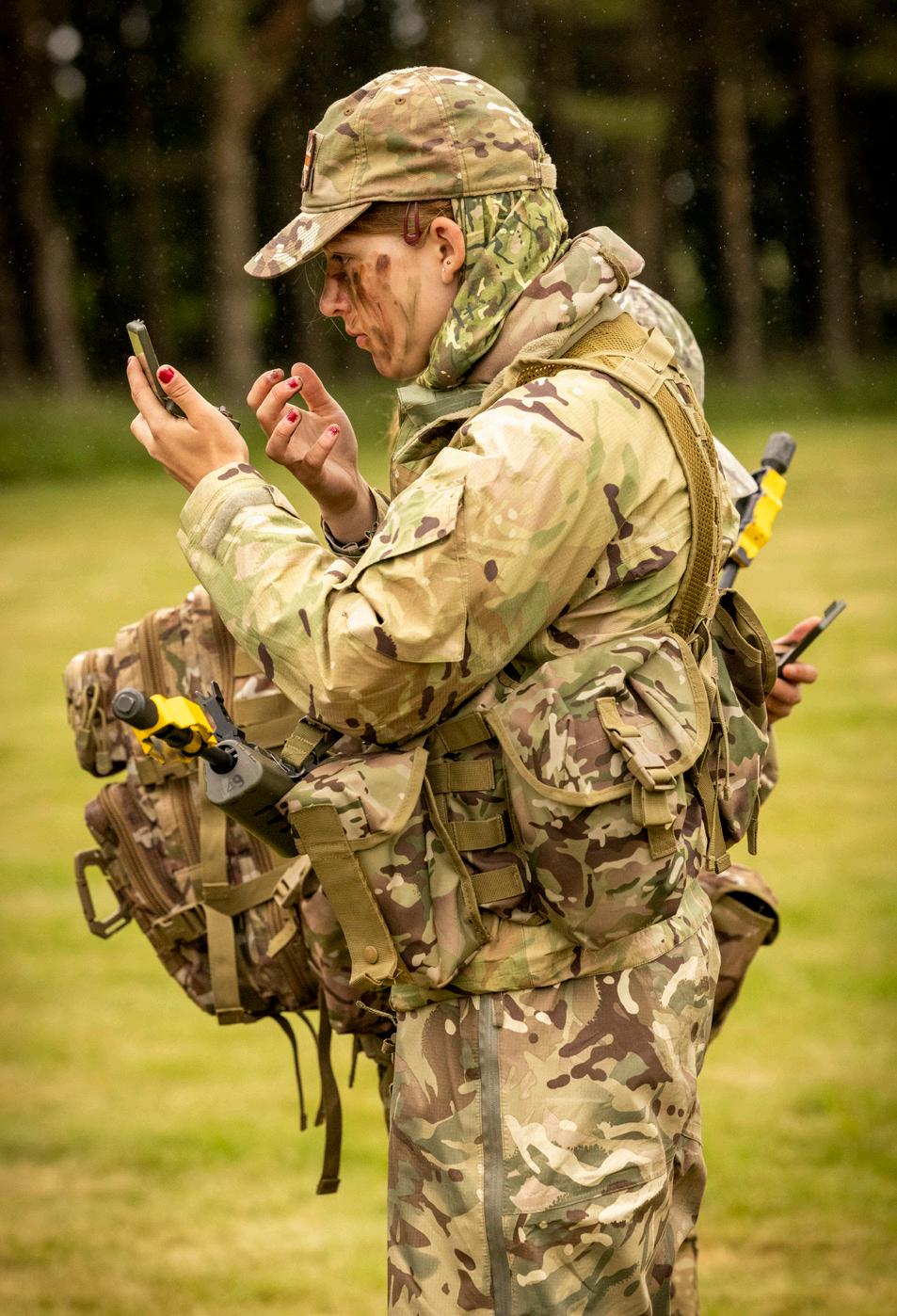

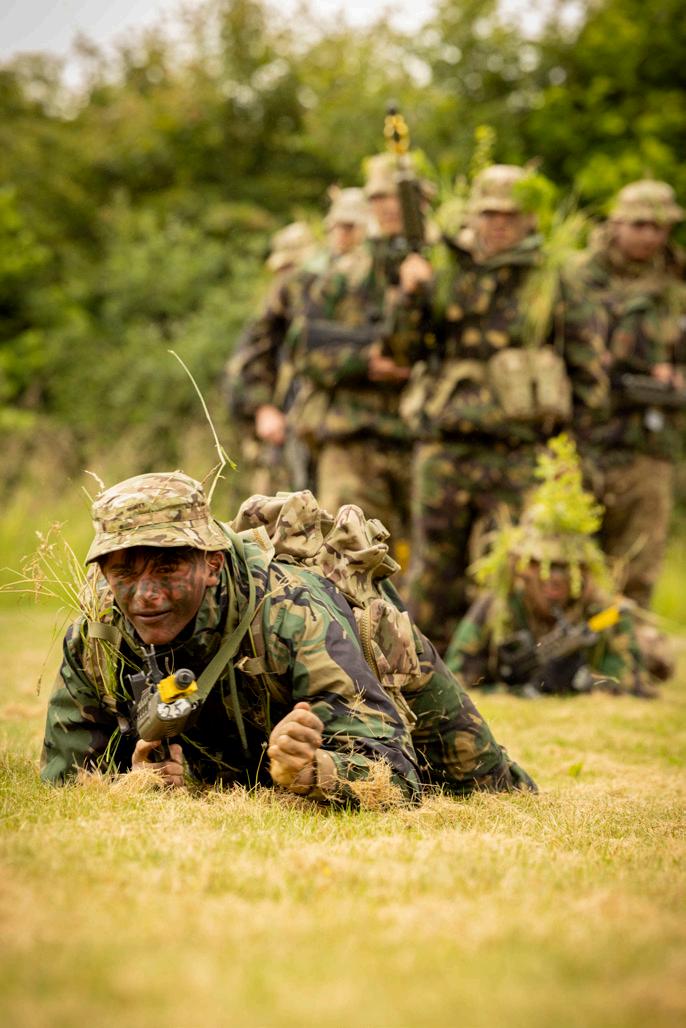
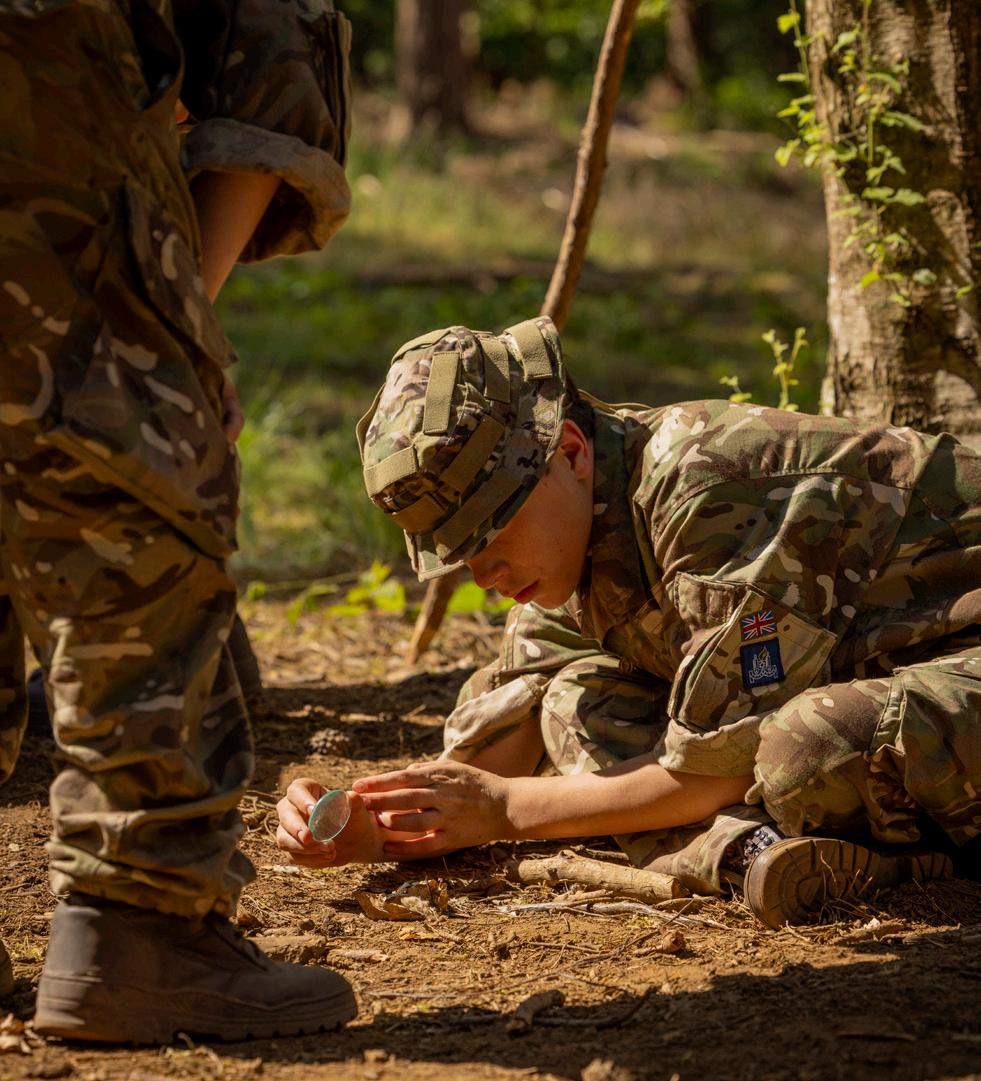




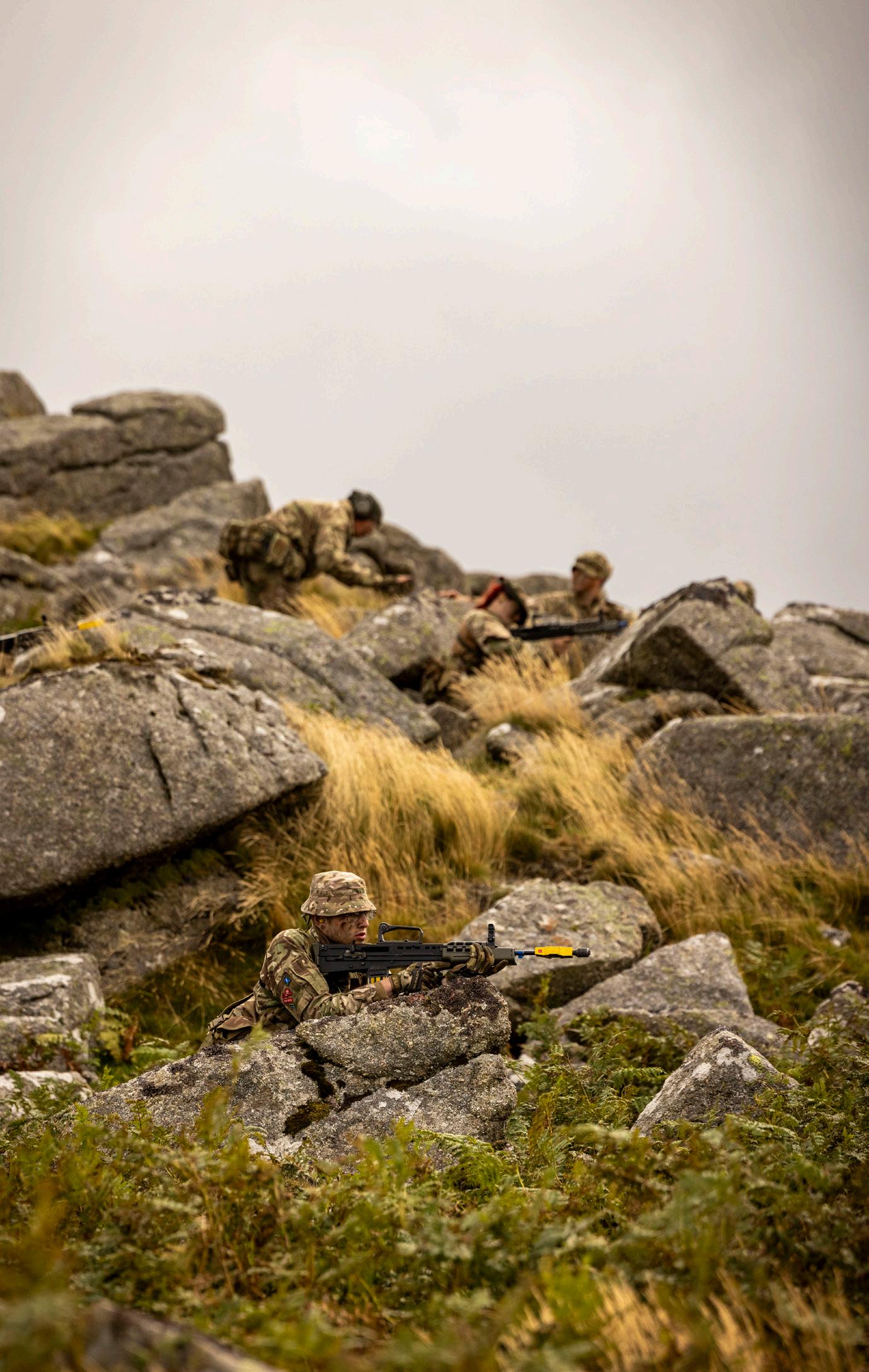





Cadets learnt vital first aid skills.


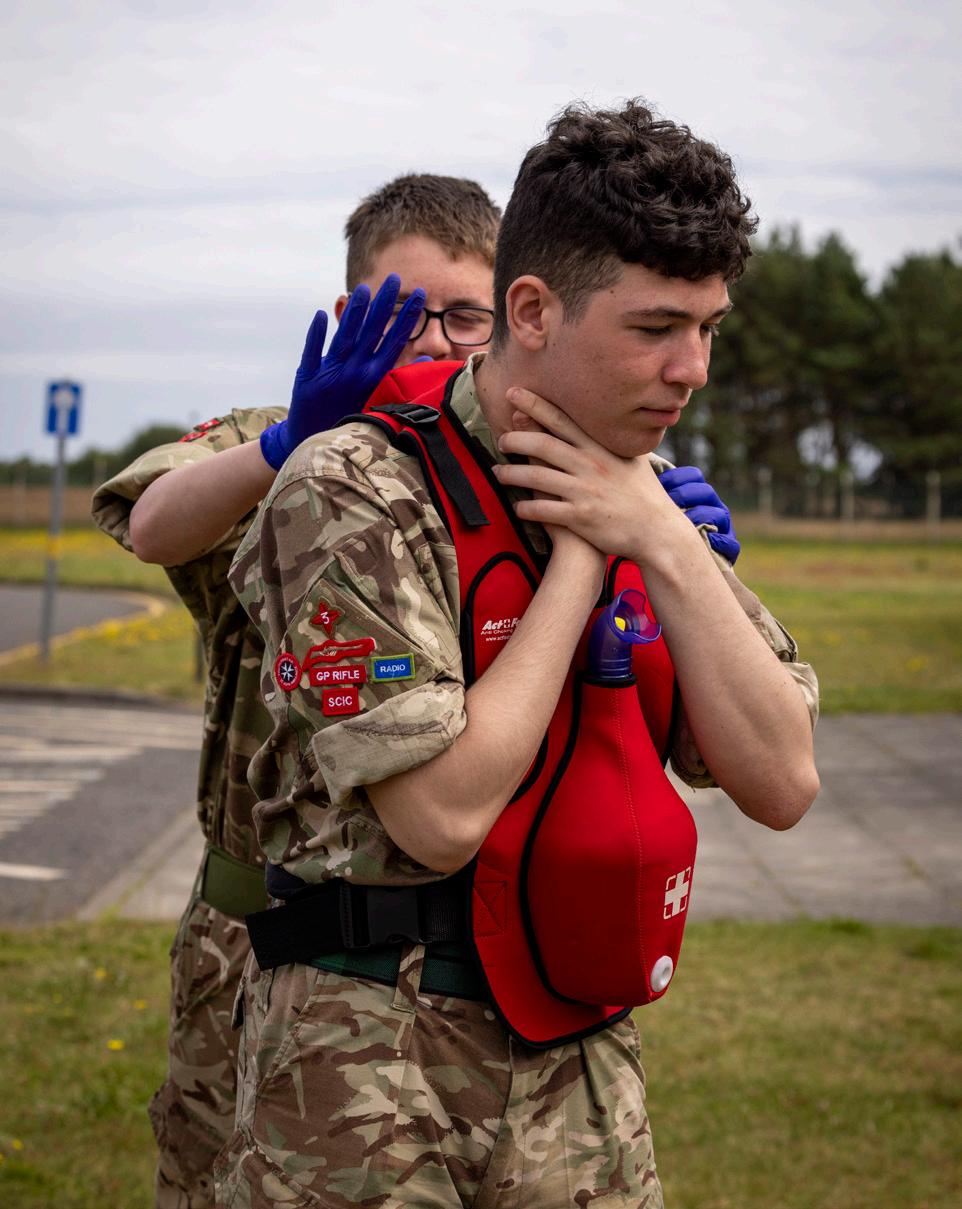

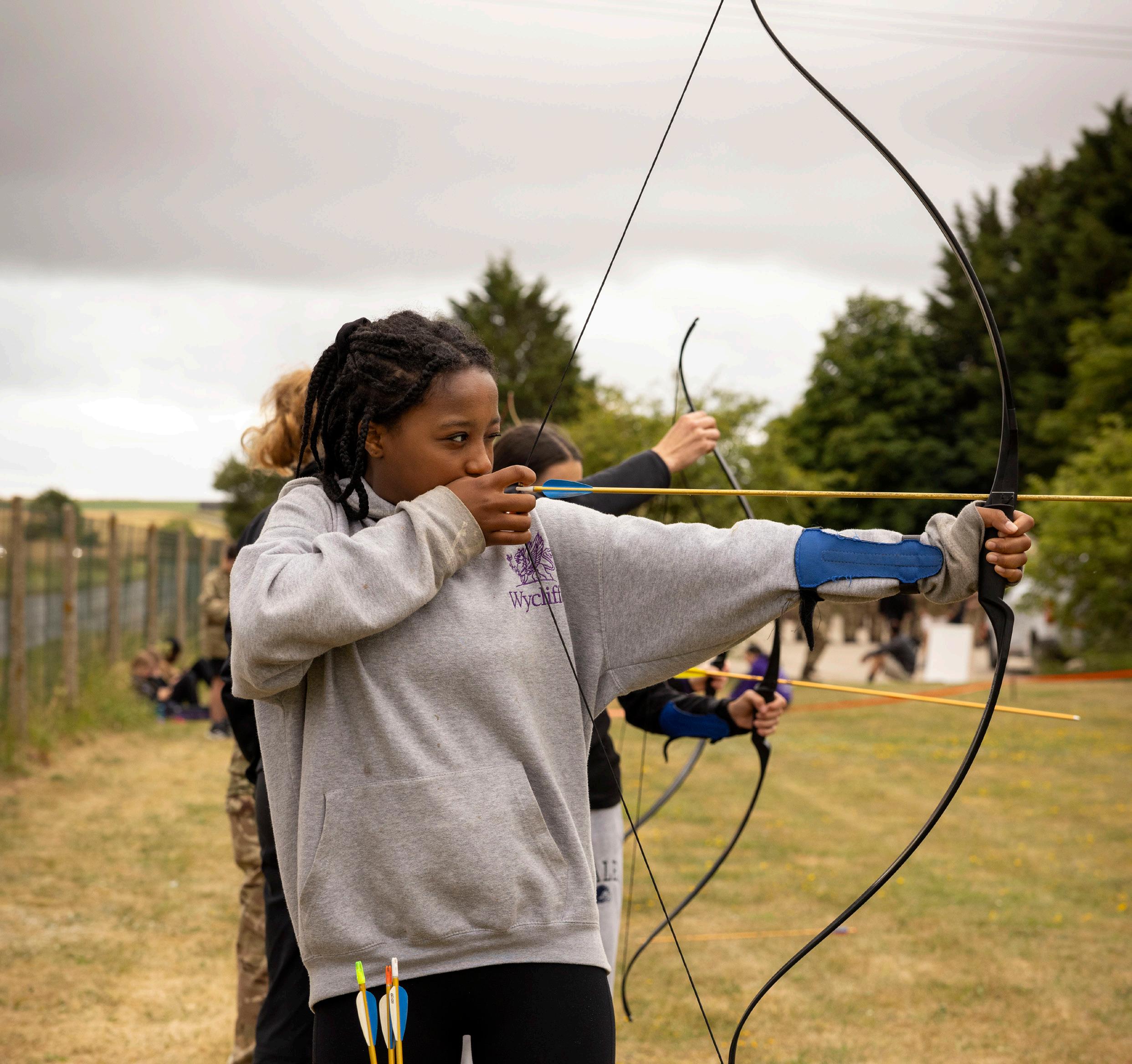
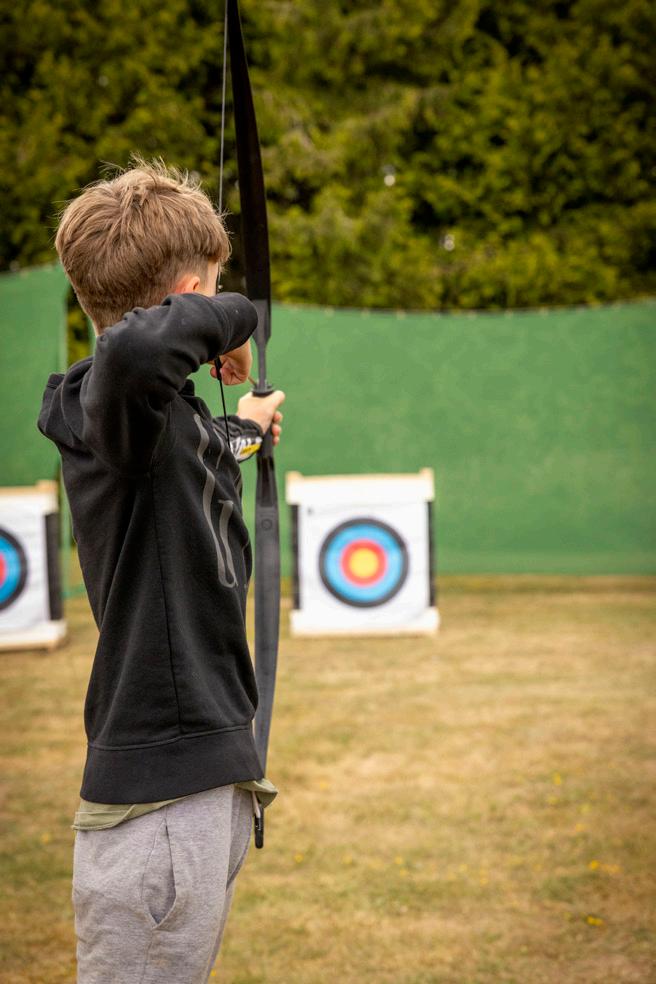


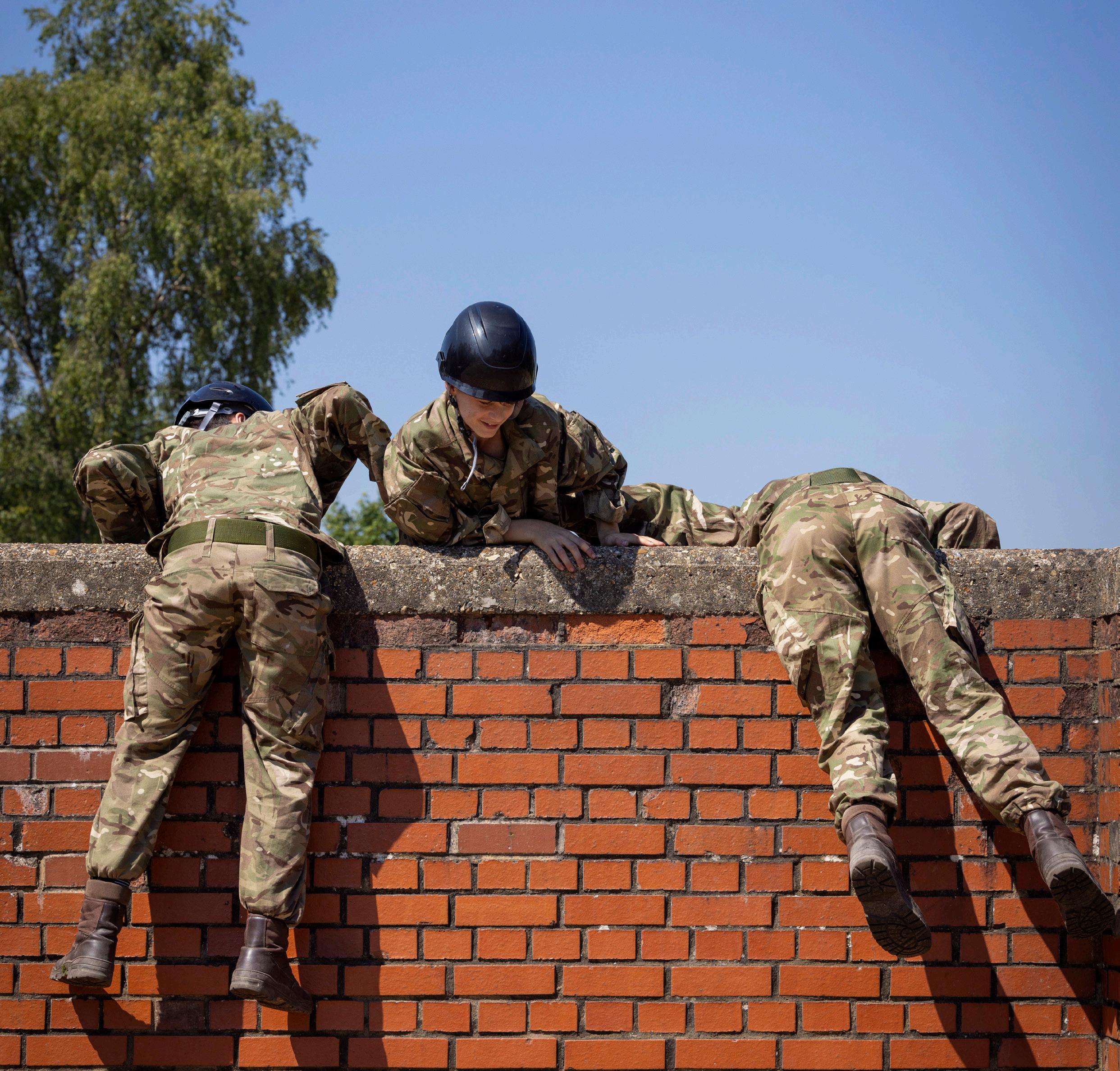
Summer camp is a great place to develop command skills by taking part in activities as diverse as TIBUA, obstacle courses, and communications and information systems training.
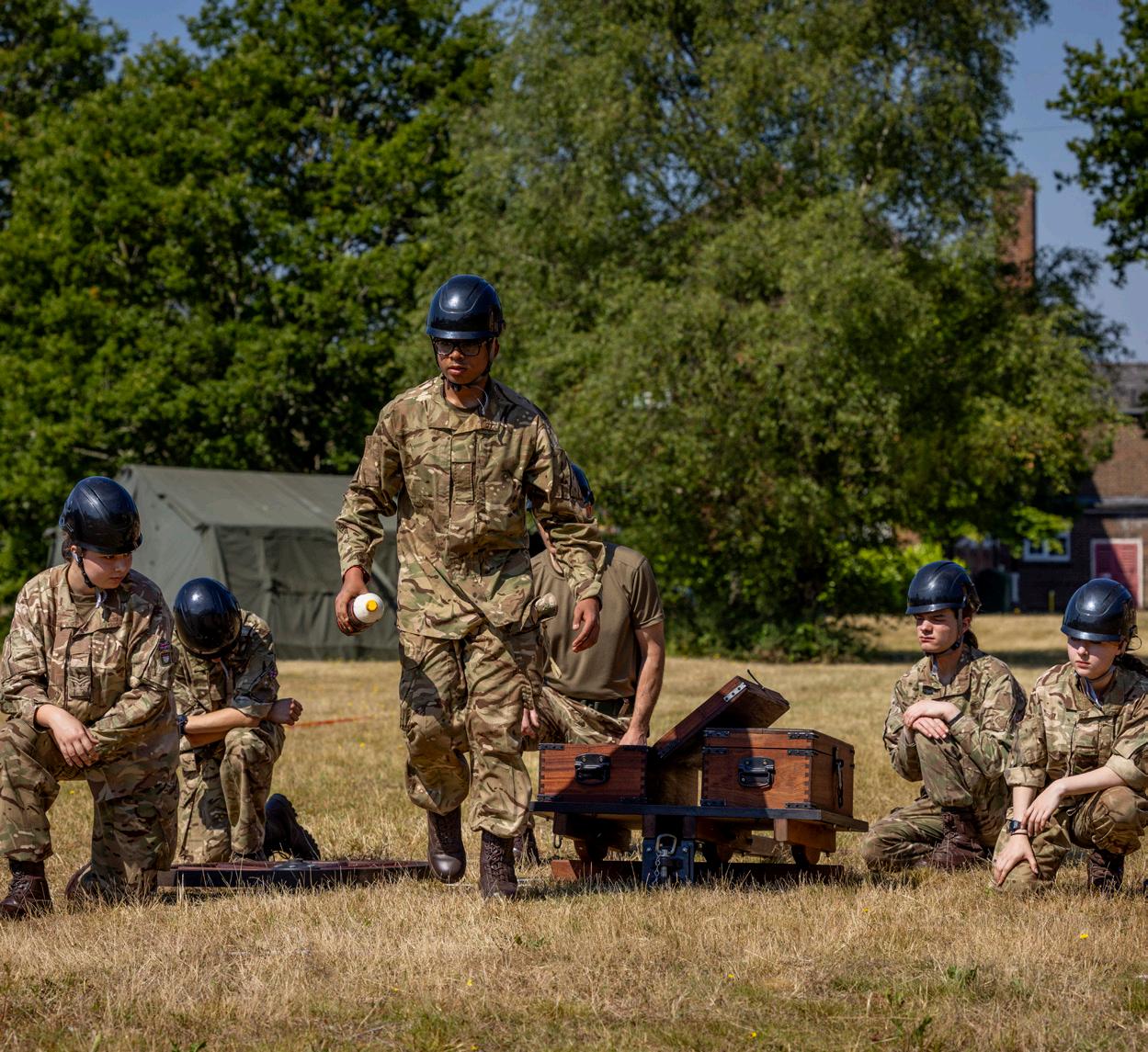
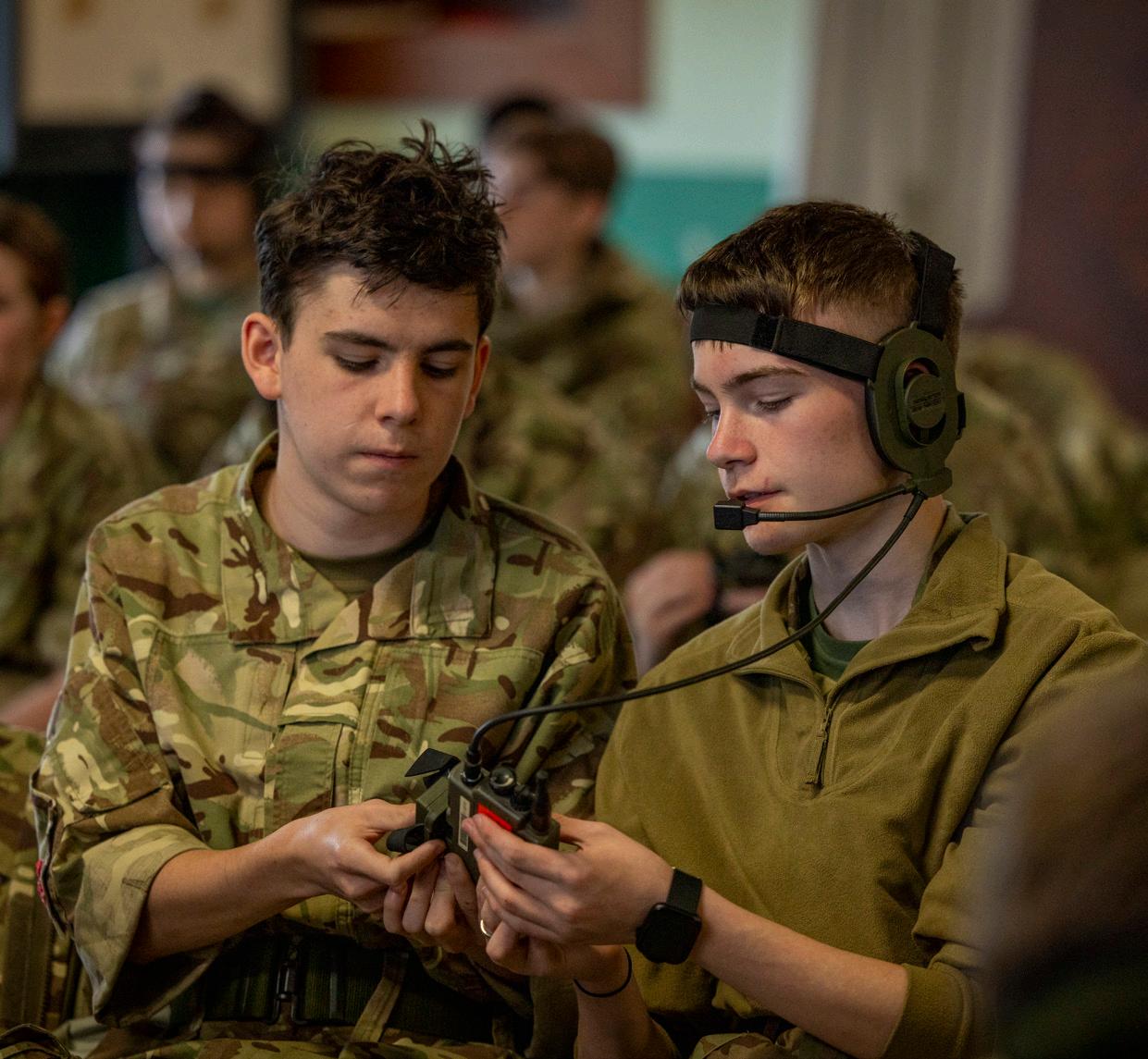

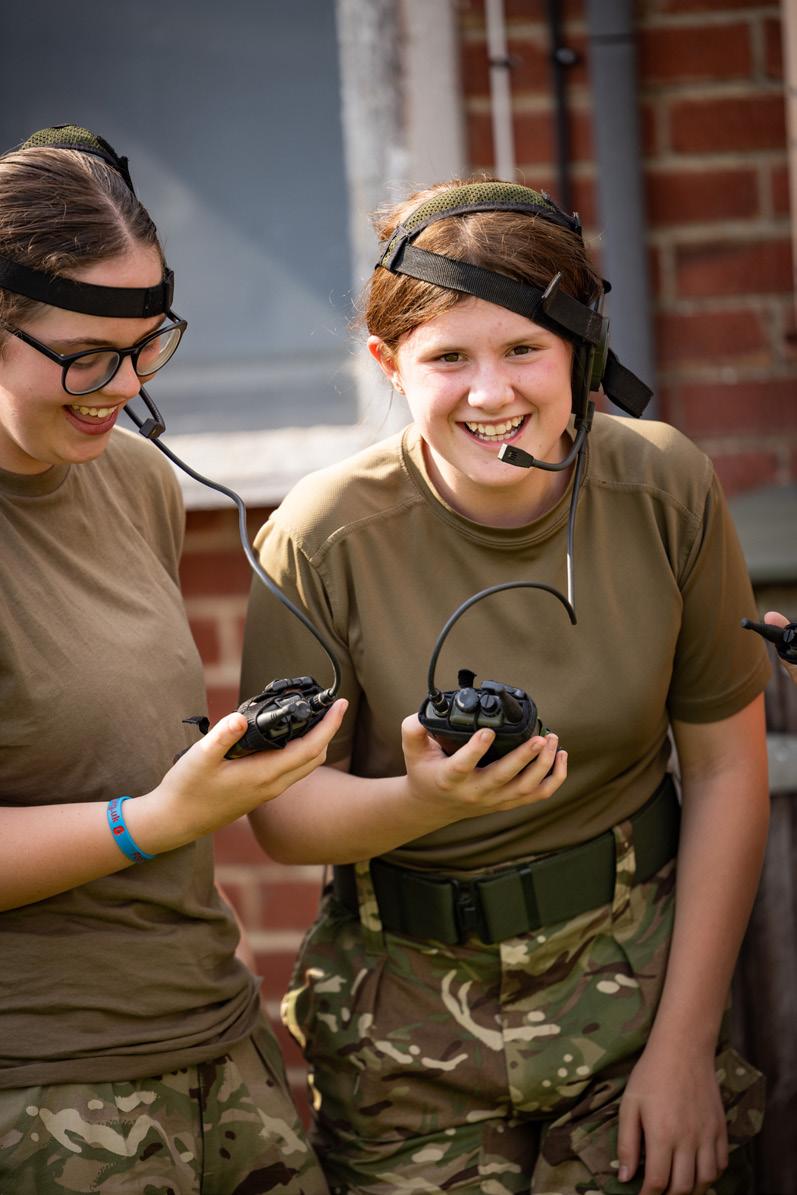

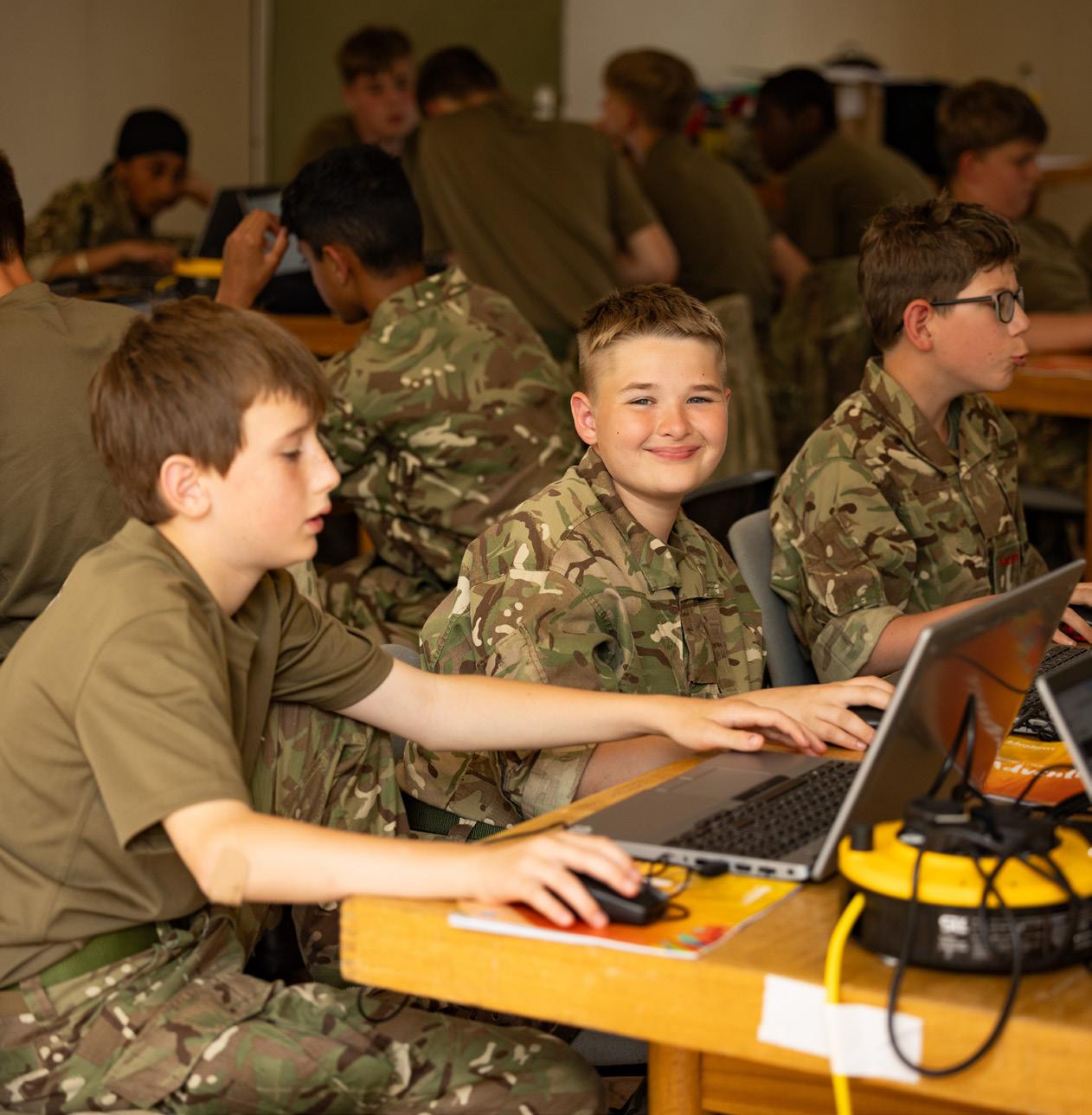
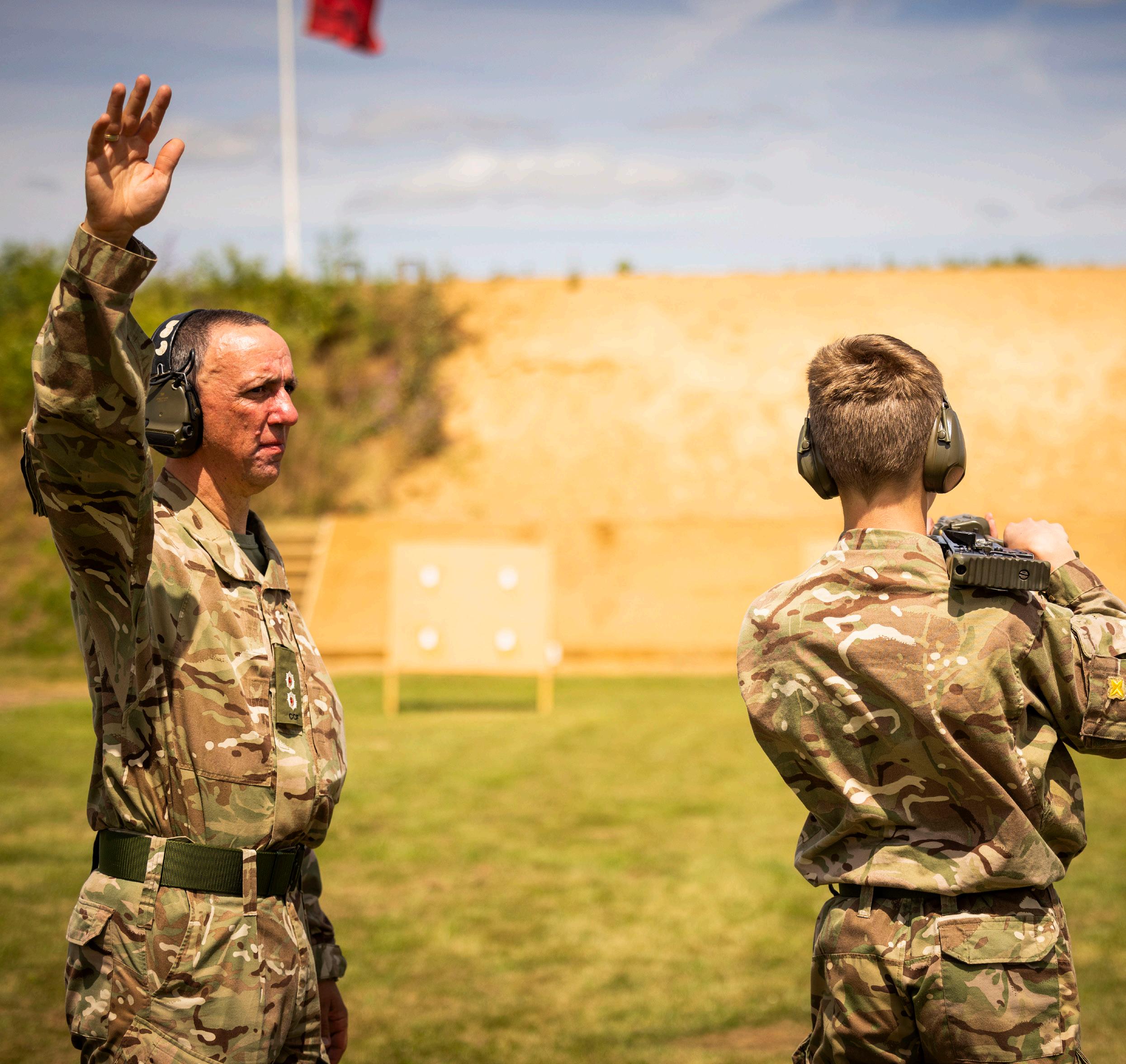
Shooting
on the range is one of the highlights of summer camp, and cadets developed their skills with the help of qualified instructors.





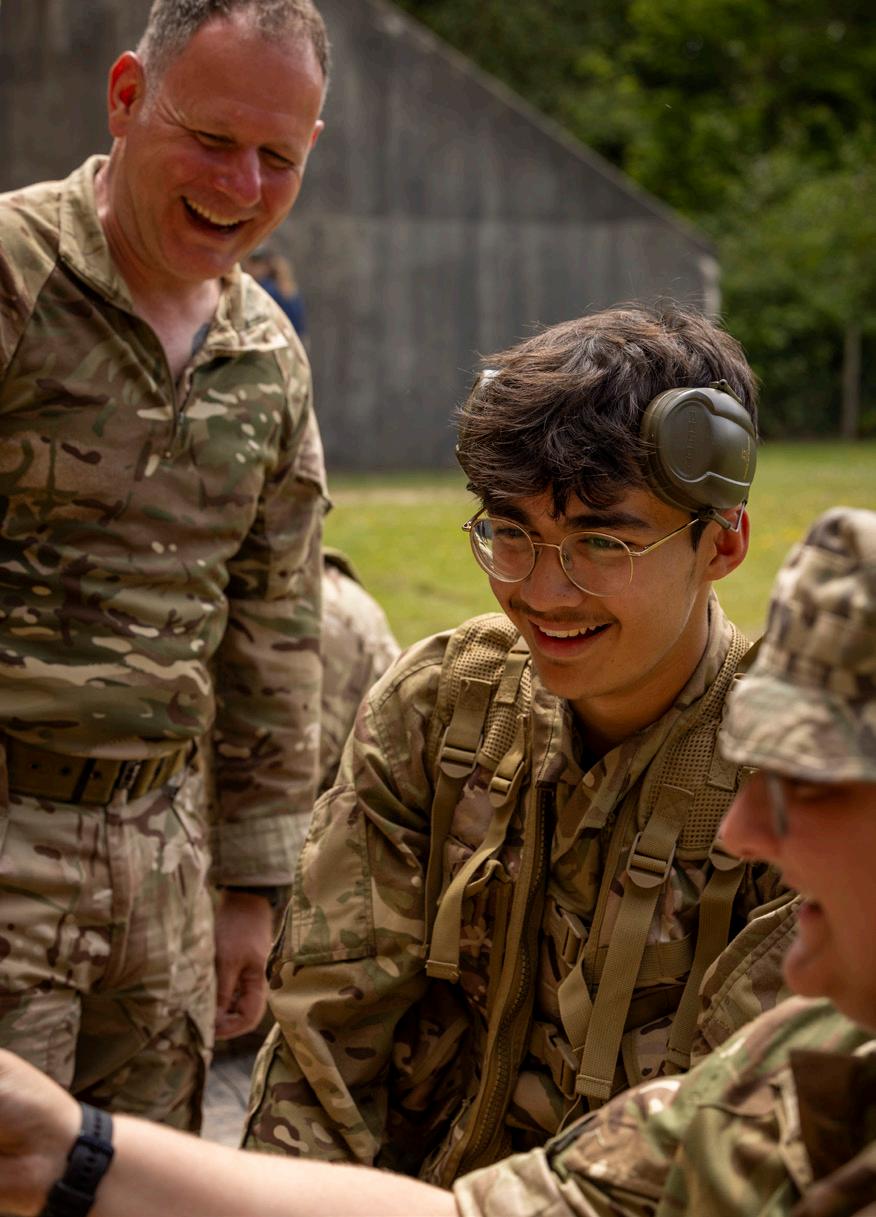
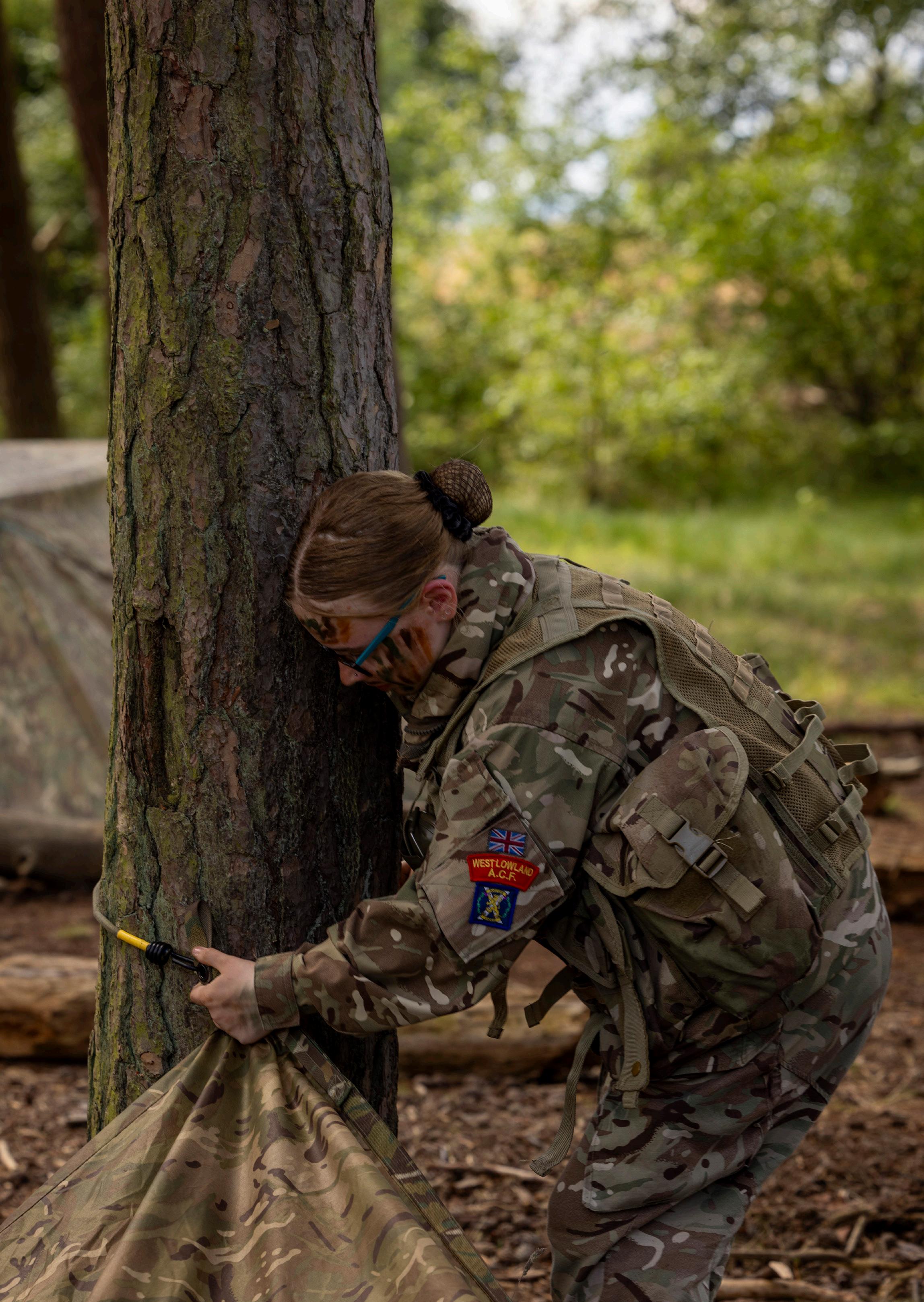
We get the low-down from the perspective of newcomer cadets, experienced senior cadets and a very long-serving CFAV.
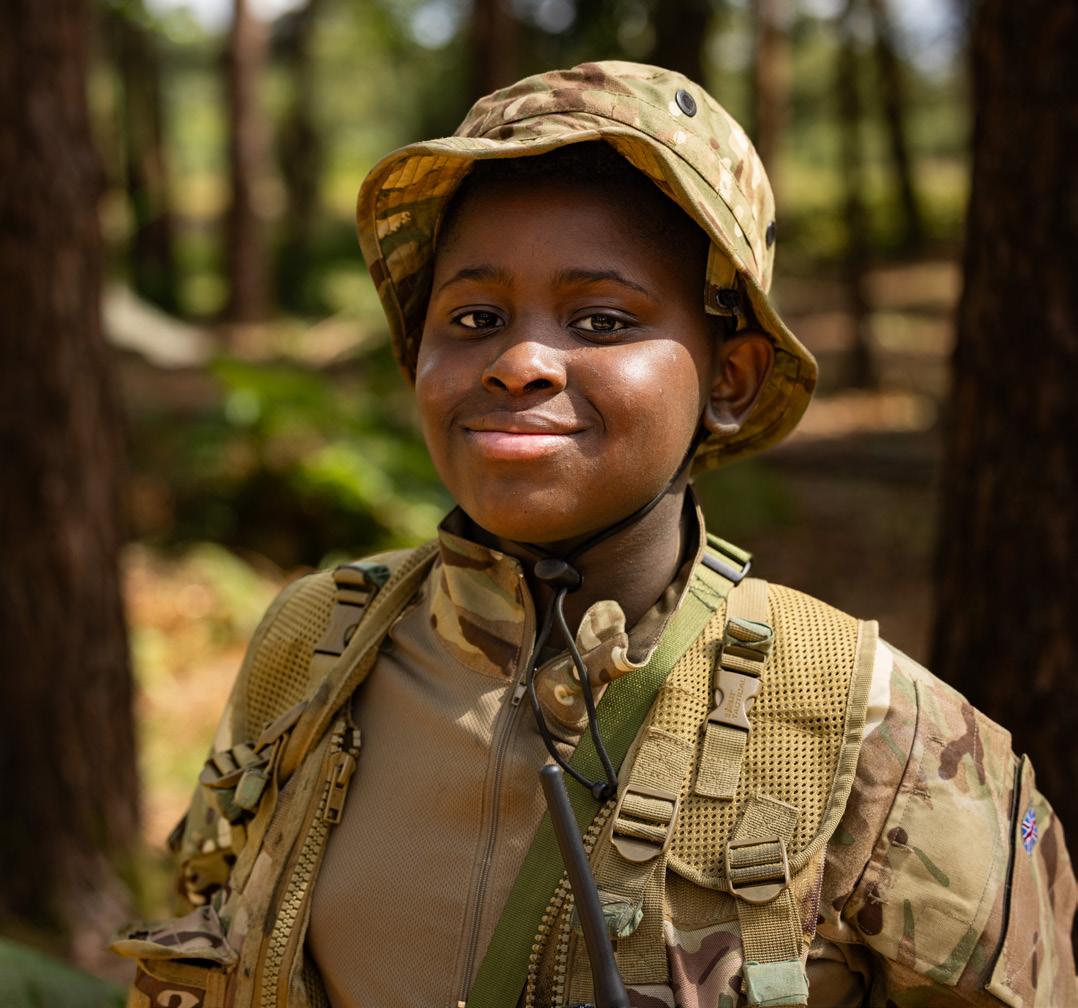
Throughout annual camp I learnt a lot about leadership. I was made 2IC of my section (I got nominated for this role after my efforts at paintball) so I had the responsibility of going around and checking on everyone’s welfare. I had to check that cadets had been well fed and were hydrated and their feet were in good condition.
It was also my first experience of giving orders out on the field and leading cadets through section battle drills. I hope I’ll now be able to use these transferable skills in extra-curricular activities, such as rugby, at school.
As it was my first camp, I wanted to come into it with confidence and hopefully get noticed. In preparation, I asked other people at my detachment about their first camp so I knew what to expect.
I really loved the fieldcraft; I enjoyed blank firing and getting contacted – it was fun!
However, the best bit for me was sleeping out in a basha for the first time. It was brilliant sticking your head out and seeing all the stars above the canopy. I was put into a section with people I’d never met before and they were really funny so we got on well.
For those thinking about attending camp for the first time, I would say don’t worry about it and be absolutely confident. Go into it with all guns blazing and get involved with as many activities as you can. Get out of your comfort zone and make friends. You’ll create some great memories.
I’d also recommend listening to the section commanders and all the adults. If you don’t pass the preliminary tests you won’t be able to go on to the good stuff like blank firing.
Throughout the camp I got better at learning new things and working towards a goal – and at making myself heard.
I was a bit worried initially because it was my first ever summer camp but, as I started learning more, I met new people who were willing to help me at every step.
I would recommend annual camp because it provides new experiences and you get a feeling of achievement.
My advice to new cadets who are thinking of going next year is: go for it! Find a good friend and a good support group who will help you through. You have to work hard to make it fun. I worked hard and I benefited from it.
Enjoy the camp. It may seem challenging but once you start, you won’t want to stop.
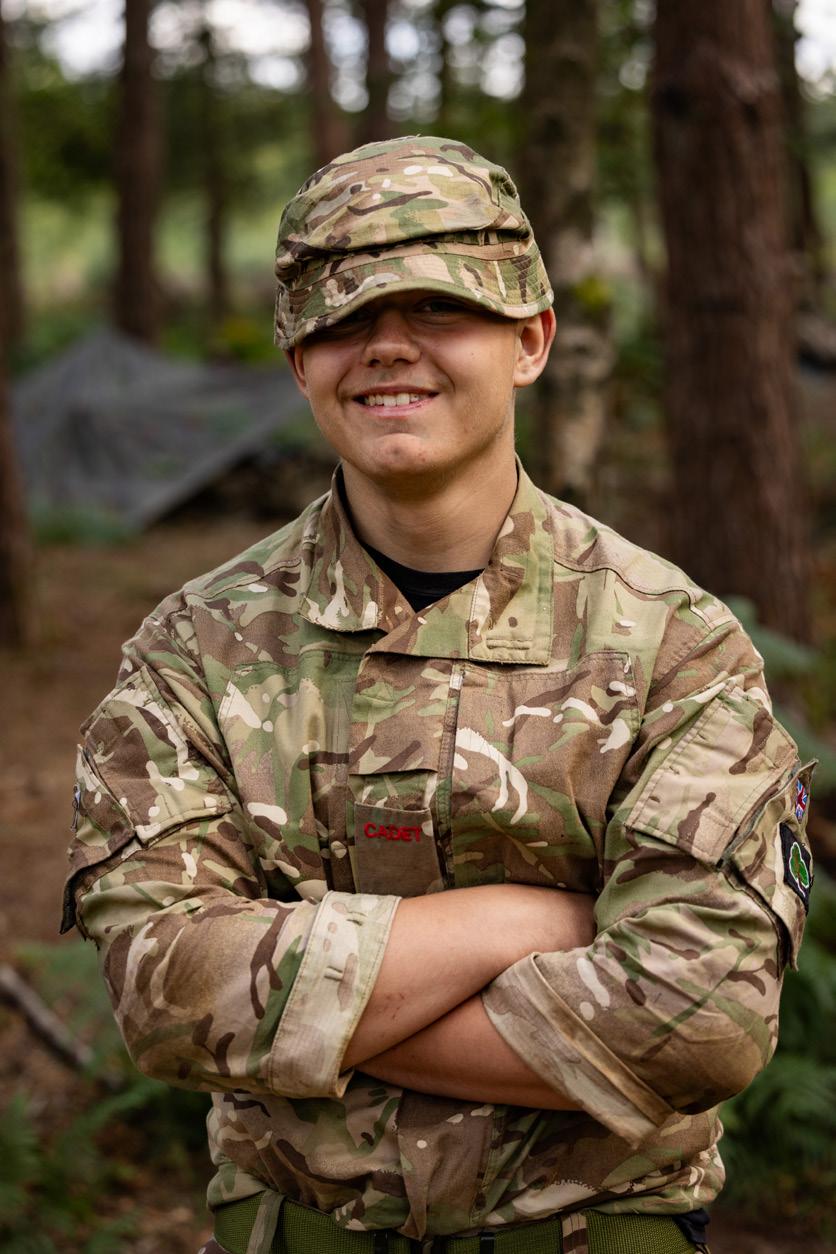
‘Go into it with all guns blazing and get involved with as many activities as you can’
(Nottingham ACF)
This was my third annual camp and I had the most awesome experience of going in a Chinook helicopter. It was a dream come true – I’d never been in a helicopter before. The fact that the Army Cadets gives you the chance to do stuff like that is amazing.
At this year’s annual camp, I helped cadets who were feeling worried about going out to the area during fieldcraft. I chatted to them and supported them and, by the end of the conversation, they admitted to feeling quite excited. The feeling of pride you get from hearing cadets say they are excited after being scared is something you don’t forget. As senior cadets, we are here to guide younger cadets through camp when they need it; we’re like a bridge to success for them.
The adult volunteers at camp do all kinds of tasks and admin that the cadets don’t see. They have to plan all the activities, which includes meal prep, time out in the field, the weapon systems and ammunition and the sleeping areas. So much work goes into annual camp and the volunteers don’t get enough credit.
When I joined the Army Cadets, I was very shy and now I’m confident and open when speaking to people or being in front of a crowd. I think those skills will take me a long way in the real world. After aging out I would like to go into the Army’s Royal Logistic Corps or Royal Military Police to gain experience which I can bring back to the Army Cadets as a CFAV.


‘I had the most awesome experience of going in a chinook helicopter’
I am going to be brutally honest: I have made a stupid amount of mistakes at annual camp but every single time I’ve learnt from them. Learning from mistakes and becoming more disciplined has brought me to where I am today as a Cdt CSM. I’m sure I still have plenty of mistakes to make, but now I’m able to help juniors learn from their mistakes and teach them the things I was taught.
I love teaching. One of my favourite things is to see the juniors grow and, in turn, become seniors. When I leave, I know they will continue to teach their juniors. It’s a cycle and it’s so amazing. It fills me with pride.
Seniors at annual camps are nurturers. If junior cadets are not coping well we do everything in our power to make sure they’re okay. I’ve had experiences on camp where a young cadet has come up to me and been scared of doing their air-rifle training or going out to the area in fieldcraft. I am happy to comfort them and let them know I have been there and everything will turn out fine.
Many of the adult volunteers at annual camp are amazing. I don’t know how they manage to do what they do outside of work hours. The lengths they go to for the cadets is amazing. I can totally see why they do it, though, as it is very rewarding.
I’m about to age out and, after finishing my plumbing course, I would like to join the Army’s Corps of Royal Engineers. After training I would definitely like to return as an adult volunteer and, hopefully, bring with me the discipline, experience and learning I’ll have acquired.
We are celebrating my 50th summer camp. It should be my 52nd year but in 2020 and 2021 we couldn’t hold it due to Covid. Otherwise I’d be on 52 camps by now, having done every single year they’ve ran.
My involvement in the Army Cadets goes back to 1972 when my dad was asked to take over the ACF in Farringdon. He took me along as a cadet and it carried on from there. I also used to do scouting but I loved being a cadet so much that I carried on as an adult volunteer. I was promoted to SI in 1977 and then to SMI in 1990.
The most rewarding thing is seeing young people develop, keeping them off the street and keeping them interested.
My roles have changed over the years. I don’t really get involved with the cadets themselves now. I’m more of a back up. I do stores, so if, for example, cadets need soup out in the field at 2am, I get it ready and take it out to them.
More recently, I was asked to be a driver and take 26 kids to Scotland. We took a four-hour ferry ride to get to this island. It was absolutely beautiful, and an honour to be asked.
When we first started, we used to think ‘let’s have a camp next month’, so we’d beg and borrow off the Army units and, four weeks later, we did it. One year we even got 24 cadets on a four tonner (Army truck). Today, we use minibuses and coaches. Years ago, it was just up-andgo. Popular activities 50 years ago at Penally were fishing, abseiling and boating.
All the cadets know me as “Elsie”. [A reference to the popular former Coronation Street character, Elsie Tanner.] Ever since I became an adult volunteer, it’s stuck with me.
My advice to new cadets is: ‘Give camp a go and make the most of it. You’ll get to do things you would never get the chance to do in civilian life. Take on board the discipline and listen to others – that’s the secret bit. If you do all that you’ll get definitely get somewhere.’

‘You’ll get to do things you would never get the chance to do in civilian life’
“08:05 - Staff Officer Sir, a report has just come in saying the Zulus are advancing in force toward the left front of camp”
Lt Col Pulleine

Isandlwana Battlefield Anglo-Zulu War - 1879
A F R I C A N A D V E N T U R E S L I E A H E A D
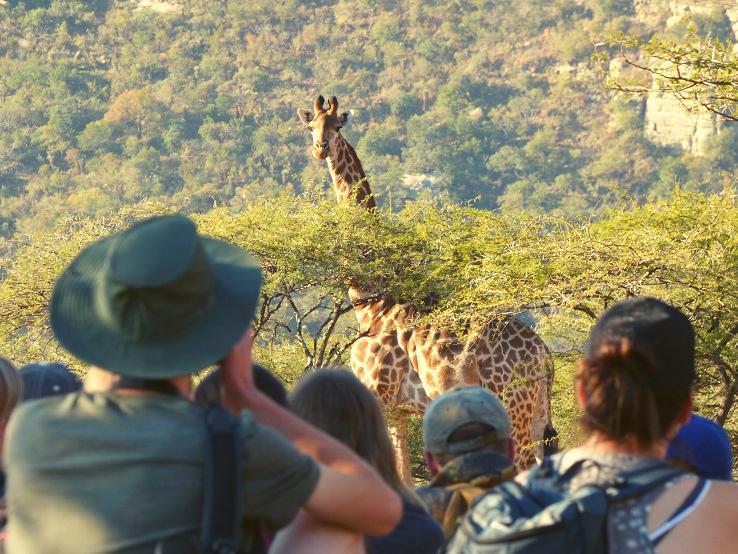

Animal Tracking Bush Craft & Survival Skills Wildlife Field Studies
British Military History Community Engagement River Rafting Mountain Hiking Mountain Biking Safari Wildlife Drives
Cadet ventures are group specific, promoting physical endurance, intellectual, social and emotional challenges. Encouraging teamwork, resilience, and personal growth, while empowering future leaders with broader perspectives, and a greater understanding of their abilities, nature conservation, the environment, military history, diverse cultures and communities.


V E L O P M E N T O P P O R T U N I T I E S F O R C A D E T S ”


A D V E N T U R E , C U L T U R E , C O N S E R V A T I O N , G R O W T H
A f r i c a W i l d T r a i l s o p e r a t i o n s a r e a s s e s s e d b y , a n d a r e c o m p l i a n t w i t h , t h e h i g h e s t B r i t i s h
s t a n d a r d s f o r i n t e r n a t i o n a l g r o u p t r a v e l , f i e l d s t u d i e s , a n d e x p e d i t i o n s .

h t t p s : / / w w w . a f r i c a w i l d t r a i l s . c o m / c a d e t v e n t u r e s
a n g u s @ a f r i c a w i l d t r a i l s . c o . u k

